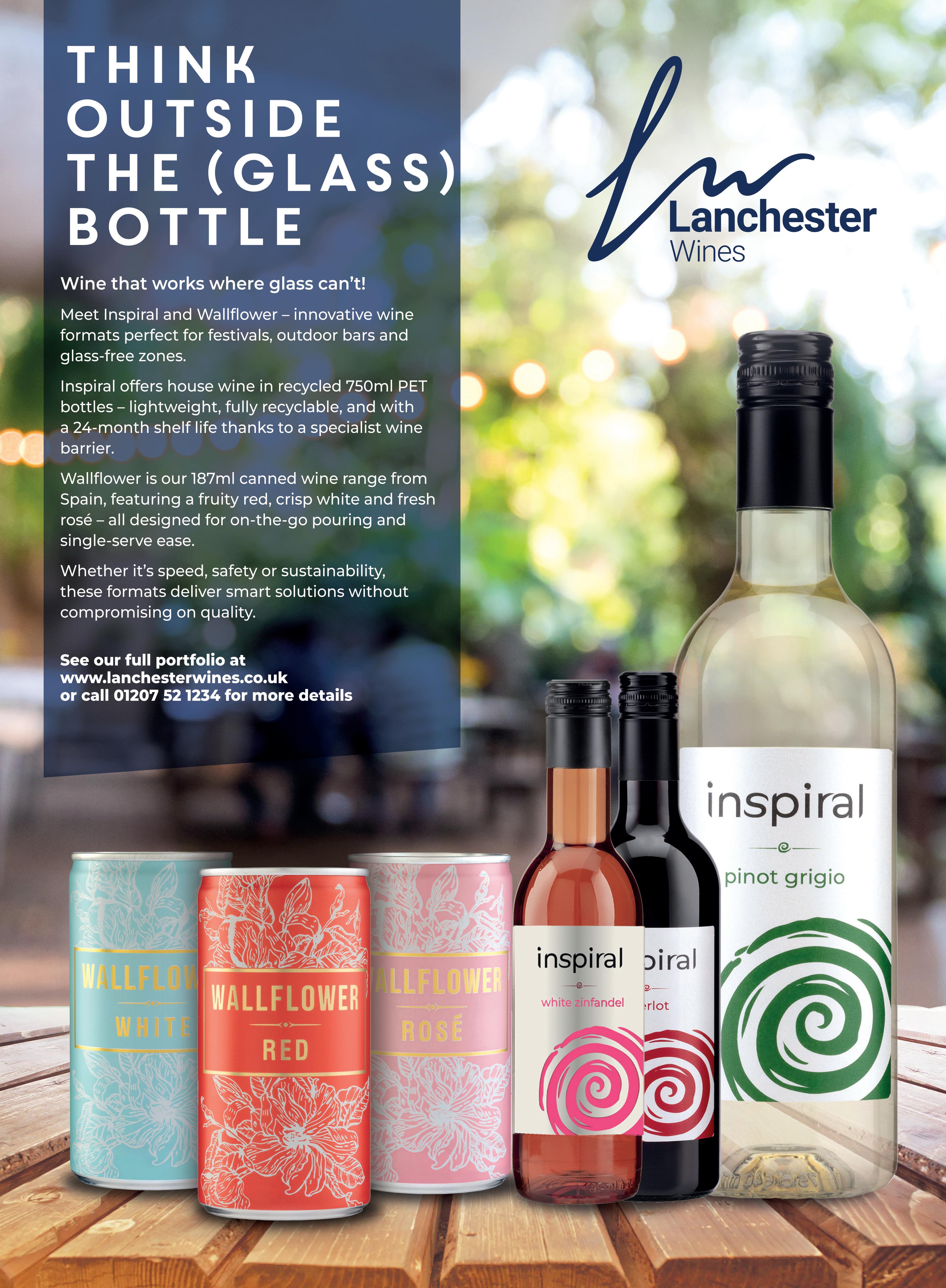

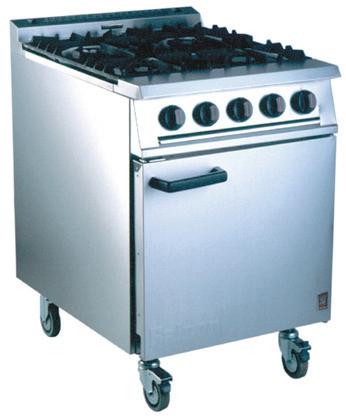
















EDITOR
Peter Adams
There's something profoundly uplifting about our lead story this issue, and frankly, it couldn't come at a better time. After months of reporting on closures, cost pressures, and the relentless squeeze on our industry, we finally have data that shows what we've all been hoping for – resilience, adaptation, and genuine consumer enthusiasm for what we do best.
The 9.2% surge in visit frequency and 10.7% increase in average spend revealed in the latest research doesn't just represent numbers on a spreadsheet. It represents real people choosing to step out of their homes, to gather in our venues, and to invest their hard-earned money in the experiences that only hospitality can provide. More importantly, it shows that despite everything – the tax increases, the rising costs, the ongoing pressures – consumers still value what we offer. Yes, the challenges remain significant. The 15.8% contraction in independent venues since 2020 is a stark reminder of how fragile our sector has become. April's tax implications continue to bite, and many operators are still making difficult decisions about staffing and investment. But what strikes me most about this story is not what we've lost, but what we've retained – and what we're building back.
The fact that pubs and bars recorded the largest rise in share of occasions, up 2.7 percentage points, tells us something crucial about the British public's relationship with hospitality. When the sun shines, they don't just go to the park – they come to us. They choose our beer gardens, our terraces, our carefully crafted outdoor spaces. They trust us to provide not just a drink or a meal, but a social experience that enriches their lives.
This weather-driven upturn also highlights something we sometimes forget in the daily grind of operations – the incredible power of external factors to transform our fortunes. While we can't control the weather, we can control how ready we are to capitalise on the opportunities it presents. The operators who have invested in outdoor spaces, who have adapted their offerings to embrace al fresco dining, who have created environments that come alive in the sunshine – these are the ones reaping the rewards.
The first positive nightclub growth since 2020 is particularly encouraging. For too long, we've watched a vital part of our night-time economy wither. Young people deserve spaces to
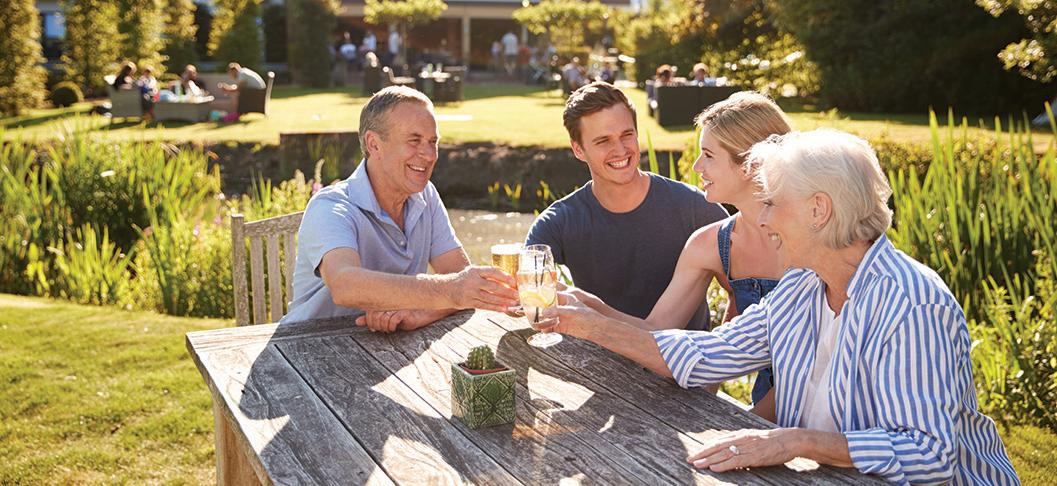
socialise, to celebrate, to experience the kind of communal joy that only comes from shared music, shared laughter, shared moments. The 5.4% annual increase suggests that appetite hasn't disappeared – it was just waiting for the right conditions to re-emerge.
What gives me most hope, however, is the evidence of innovation throughout the sector. Operators aren't just surviving – they're adapting, experimenting, finding new ways to deliver what consumers want. The shift towards experience-led socialising, the evolution of formats, the creative responses to changing consumer behaviour – all of this demonstrates an industry that refuses to be defeated by circumstance.
We must also acknowledge the collaborative spirit emerging from these challenging times. The industry's unified call for targeted support measures – VAT reduction, relief on business rates, investment in transport infrastructure – shows a sector that has learned to speak with one voice. When we work together, when we present evidence-based arguments for change, we have a much stronger chance of being heard.
To those who are already seeing the green shoots of recovery, who are benefiting from the recent upturn – remember that success in hospitality has always been about more than just good weather. It's about creating spaces where communities gather, where celebrations happen, where ordinary moments become memorable. That's a responsibility worth fighting for.
The summer ahead presents an opportunity. Let's make sure we're ready for it.
I would encourage all our readers to follow us on X/Twitter @CLHNews and visit our website at www.catererlicensee.com to sign up for our twice weekly e-newsletter for all the latest news delivered directly to your inbox. I can always be contacted at edit@catererlicensee.com
The Caterer, Licensee & Hotelier News Group is published by RBC Publishing Ltd, 3 Carlton Mount, 2 Cranborne Road, Bournemouth, Dorset, BH2 5BR. Contributions are welcome for consideration, however, no responsibility will be accepted for loss or damage. Views expressed within this publication are not necessarily those of the publisher or the editorial team. Whilst every care is taken when compiling this publication to ensure accuracy, the publisher will assume no responsibility for any effects, errors or omissions therefrom. All rights reserved, reproduction is forbidden unless written permission is obtained. All material is assumed copyright free unless otherwise advised.




Published by Published by
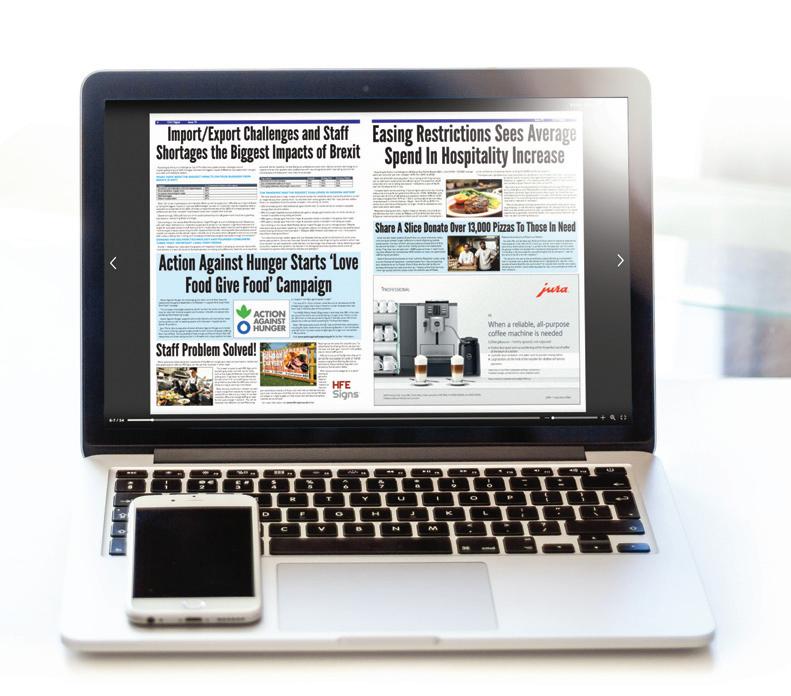
The sunny weather has proved particularly beneficial for pubs and bars, which recorded the largest rise in share of occasions, up by 2.7 percentage points, as consumers favoured these social venues. This trend reflects the sector's ability to capitalise on opportunities when conditions align, offering hope for the challenging months ahead.
The appetite for meaningful social experiences remains robust, with dinner occasions continuing to grow and the hospitality sector successfully adapting to evolving consumer preferences toward experience-led socialising.
Linda Haden from Lumina Intelligence said: "Our latest insights demonstrate the resilience of the UK's eating out market. Despite rising costs, consumers are making the most of social occasions, especially in pubs and bars. As we move into summer, this trend is expected to continue."
While growth is “modest” the Night Time Market Monitor produced by the Night Time Industries Association in partnership with CGA by NIQ has laid bare the scale of challenges facing the industry, particularly independent operators who have borne the brunt of recent difficulties.
Independent businesses have contracted by 15.8% since March 2020, compared to 3.2% for managed groups, highlighting the disproportionate impact on locally-owned venues that, the report says, form the backbone of many communities.
However, the data also reveals encouraging signs of stabilisation. The night-time economy has achieved modest year-on-year growth of 0.2%, while evening economy venues (5pm-11pm) have increased by 4.9% annually. Most notably, nightclub numbers showed their first positive growth since 2020, with a 5.4% annual increase.
Key Findings Include:
Evening Economy (5pm–11pm):
• Venues catering primarily to the evening economy, such as community pubs, bar restaurants, and high-street pubs, have seen a 4.9% increase in sites over the last 12 months, growing from 15,313 in March 2024 to 16,070 in March 2025.
• This follows a long-term decline of 7.7% over five years, indicating recent stabilisation and growth.
• Bar numbers are up 7.6% year-on-year, with themed bars (+24.3%) and cocktail bars (+15.2%) seeing the fastest expansion, driven by demand for experience-led socialising.
Night Time Economy (typically 6pm–6am, spanning evening and late-night activity):
• The broader night time economy—which includes cultural venues, late-night bars, and mixed-use hospitality sites—grew by 0.2% in site numbers over the past year, reaching 88,510 in March 2025.
• Despite this, it remains 13.6% smaller than it was in March 2020, underlining the sector’s slow path to full recovery.
Late-Night Economy (post-11pm, including nightclubs and late-night bars):
• After a 25.1% drop since March 2020, the late-night economy has shown recent signs of growth, with a 2.0% increase in the last 12 months—rising to 2,266 venues.
• Nightclubs, among the hardest-hit, have seen a 5.4% year-on-year increase in site numbers—the first annual growth since the pandemic.
• However, footfall and sales data show a 13% decline in trading performance after 1am, reflecting shifting consumer habits.
“REMARKABLY RESILIENT”
Michael Kill, CEO of the NTIA, said: “While our sector is remarkably resilient – modest figures of growth should not be mistaken for recovery. What we are seeing is the barest flicker of life after five years of near-collapse. A 5% growth in nightclubs sounds positive — until you remember we’ve lost 34% of them since 2020.”
“The reality is the night time economy remains in a deep crisis of the Government’s doing – most recently by the Autumn Budget. Without urgent intervention, the small signs of resilience we’re seeing now will be put out entirely – and disproportionately so on independent venues deeply cherished by and so valuable to communities.”
“The Government must urgently address structural issues—from public transport and safety to the additional tax burdens introduced this April. Appetite for meaningful, shared cultural and social experiences is strong. It’s up to policymakers and industry leaders alike to ensure the infrastructure exists to support it.”
“ADAPTED WELL”
Karl Chessell, Director – Hospitality Operators and Food, EMEA at CGA by NIQ, said: “These numbers show how hard businesses in late-

night hospitality have worked to build back from the turmoil of COVID19. They have also adapted very well to consumers’ changing leisure needs and are shaping a new and dynamic night time economy. However, extra costs and ongoing inflation, alongside hesitant consumers spending, means many businesses’ cash reserves are rapidly being depleted.” “Urgent and targeted action is needed to tackle this jeopardy and ensure hospitality can help kickstart an economic revival.”
The implementation of increased costs averaging £35,000-£100,000 per annum from April's policy changes presents ongoing challenges. A flash survey of over 500 nightlife businesses revealed that over 90% have already implemented or are planning cost-reduction measures, including adjustments to staffing, hours, or investment plans.
Despite these pressures, the sector's ability to attract consumers during favourable conditions – as demonstrated by the recent weather-driven upturn – suggests underlying demand remains strong when external factors align.
New data from the ONS shows that the economy contracted by 0.3% in April. This in after data revealed that there were 109,000 fewer payrolled employees across the economy in May, compared to the previous month, leading to continued industry calls for targeted support measures including VAT reduction for hospitality and events, relief on business rates and National Insurance, and investment in late-night transport and public safety infrastructure.
Kate Nicholls, Chief Executive of UKHospitality, said: “It’s clear that economic warning signs are flashing and the impact of April’s cost increases are having exactly the impact that was predicted.
“GDP figures can be volatile but an immediate shrinking of the economy and more than 100,000 jobs lost in just a month shows that the huge increase to employer NICs is putting the brakes on growth.
“Hospitality is a resilient sector and businesses are doing all they can to trade their way out of these challenges, but it has the potential to be the engine for growth if it is properly backed.
“The economy only grows when hospitality is strong. The Government needs to take these warning signs seriously and urgently review and reverse the changes to NICs, while bringing forward clear plans to empower hospitality and the high street.”

By Melissa Haskell, regulatory partner at Knights (www.knightsplc.com)

Hospitality operators are once again turning to outdoor spaces to drive footfall during the warm summer. From terraces to gardens or pavement seating, alfresco areas present a major opportunity to boost footfall, increase revenue, and create vibrant, social environments.
The Mayor of London’s new £300,000 Summer Streets Fund pilot scheme aims to review blocked licensing in nightlife hotspots across the capital, expanding alfresco dining and late-night openings.
While the initiative could eventually lead to broader change across England, operators nationwide must still navigate a complex web of licensing, planning, and operational responsibilities if they want to maximise their outdoor potential without falling foul of regulations.
OUTDOOR SPACE IS AN ASSET - IF DONE RIGHT
The pandemic showed how valuable outdoor areas can be for trade, but with the end of emergency legislation like the Business and Planning Act 2020, many businesses have found themselves unexpectedly noncompliant. During Covid, operators were able to expand onto pavements and into car parks quickly under relaxed rules. That’s no longer the case.
Using outdoor space for dining or drinking typically requires specific permissions. Assuming old flexibilities still apply could lead to penalties or licensing breaches. Whether you're adding tables on a terrace or setting up in a car park, consider which licences you need. That might include a variation to your premises licence (with a 28-day consultation),
a pavement licence if the area is on public highway or even planning permission if you’re erecting more permanent structures like covered seating. Risk assessments are essential to consider the risks to staff, customers and non-customers passing by.
LOCAL AUTHORITY’S
Local authorities interpret licensing legislation very differently, some stricter than others, so be sure to check what is acceptable in your specific borough or council area.
Some urban councils might support temporary pavement extensions to stimulate high-street trade, while others - particularly in residential or conservation areas - are far stricter. Other councils may allow garden expansion but reject anything on public footpaths.
Operators need to work closely with their local licensing team to understand specific requirements, timelines, and constraints before putting plans into action. A proactive, informed approach is much more likely to win approval and avoid costly mistakes.
Expanding into outdoor areas isn’t just about more tables and more customers - it brings a host of practical and safety responsibilities. Operators need to consider access, capacity, and customer flow. Can customers exit safely in an emergency? Is the area well lit? Are outdoor electric heaters installed safely?
In a tight labour market with small margins, many venues are already stretched. Extending your trading footprint means having the right number and calibre of people to manage service and compliance. Are staff confident taking outdoor orders? Do they know how to handle intoxicated customers? Are they aware of allergen protocols and crowd control measures?
Investing in training - particularly for personal licence holders - can protect your business in the long term. Senior staff should be clear on when to refuse service, how to manage antisocial behaviour, and how to
enforce “seated-only/ no-vertical” drinking rules if required - such as requiring a meal to be purchased.
EFFICIENT SYSTEMS FOR EFFICIENT DISHES
During COVID, many businesses turned to technology to facilitate outdoor service. QR codes, app ordering, and contactless payments remain useful tools, especially when operating across larger areas or managing peak-time demand.
But good systems are only as effective as the people using them. It’s vital to ensure your ordering and payment setup works for staff and customers alike, particularly in outdoor environments where connectivity, visibility, and queueing can pose new challenges.
Don’t neglect the basics. Clear signage, staff visibility, and zoned seating can go a long way to making alfresco dining both enjoyable and manageable.
TREAT THIS SUMMER AS A STRATEGIC TEST
While London is aiming to cut red tape for outdoor operations, it’s important to understand that this is not yet a national overhaul.
As the direction of travel becomes clearer - that outdoor hospitality is here to stay - operators everywhere can treat this summer as a strategic opportunity to plan, test, and optimise your use of outdoor space.
Define the physical boundaries of your alfresco area, conduct thorough risk assessments and consider whether you need to revise your licence or obtain new permissions. Above all, be responsible. Being caught in breach of your licences or safety could jeopardise your long-term operations.
Executed well, outdoor spaces are a powerful tool for growth. But they need to be treated with the same level of planning, compliance, and care as indoor trading. Work with your licensing authority, invest in your people, and approach this season not as a quick fix - but as a sustainable addition to your business model.
Tied tenants of Admiral and Greene King are the most satisfied in their relationship with their pub company, with ratings of 79% and 78% respectively, according to the results of the 2025 Annual Tied Tenants Survey run by Ipsos (research company), on behalf of the Pubs Code Adjudicator (PCA). Star Pubs has the most improved level of satisfaction for the second year in a row – from 55% in 2023 to 70% this year. Marston’s satisfaction level at 72% represents the second successive decrease totalling 13 points in two years. At the bottom of the table, Stonegate tenants’ satisfaction level dropped 4 points to 43%. Punch stayed at 61%.
This year’s results reveal that overall average pub company satisfaction has remained stable, with six in ten (61%) tied pub tenants saying they are satisfied with the relationship with their pub company. The annual benchmarking survey highlights tied pub tenant sentiment about the UK’s regulated pub companies in England and Wales – Admiral, Greene King, Marston’s, Punch Pubs, Star Pubs, and Stonegate. More than 1,200 tied pub tenants were interviewed on a range of topics, including rent, Business Development Managers (BDMs) and awareness of Pubs Code rights, providing the industry with in-depth insight. Just over half (59%) of tied pub tenants were satisfied with their current tenancy arrangement. This was a drop of 9 points from last year, with tenants of Marston’s and Stonegate seeing statistically significant drops of 14 and 11 points respectively. However, there was no significant change in the type of agreements cited within the study, with 44% under a traditional tied tenancy and 35% a tied lease.
This year’s survey included a focus on tenants’ experiences of tied rent negotiations with their pub company. The Pubs Code requires that tied tenants are provided with information to support the pub compa-
ny’s rental offer. A clear majority of tenants that had negotiated or renegotiated their rent in the past two years, were satisfied with the information they received, though around 1 in 5 were not. Half found this information useful to them in negotiations and nearly two thirds thought their pub company handled rent negotiations fairly.
When asked about responsibilities for repairs, most tied pub tenants understood the process for how their pub company should deal with these – with the exception of Stonegate tenants, where fewer than half (47%) agreed they understood the process well. Stonegate tenants were also largely dissatisfied (62%) with how the company dealt with repairs at their pub.
There were high satisfaction levels with BDMs, with more than 80% of tenants of Admiral, Greene King and Star satisfied in that relationship, while only 55% of Stonegate tenants were satisfied in their BDM relationship and 22% were dissatisfied.
The research also revealed that visibility of Code Compliance Officers (CCOs) with tied pub tenants has increased for another year – with 58% of tenants saying they know how to contact their CCO if they wanted to raise a Pubs Code matter. The leader here was Greene King, with 78% of their tenants knowing how to make contact with their CCO. Every pub-owning business subject to the Pubs Code is obliged to have a CCO whose role is to verify its compliance with the Code.
Overall awareness of the Pubs Code is now at 84%, also highest among Greene King tenants at 91%, and there has been a big jump in awareness of Pubs Code rights around rent negotiations, insurance price matching and the Market Rent Only option, where eligible tenants can ask their pub company for an offer of a free of tie tenancy.

Looking at attitudes to the PCA, 62% of tenants trust the Adjudicator to regulate the industry independently of government, and 65% trust the PCA to be independent of pub companies. Fiona Dickie is the Pubs Code Adjudicator, responsible for enforcing the Code and protecting fairness in the tied tenant relationship.
Commenting on the findings, Fiona said: “Our annual survey delivers an incredibly useful view on how tied pub tenants experience their business relationship with their pub company – as well as their understanding of the Pubs Code, and it is positive to see tied tenant awareness of Pubs Code rights going up this year. The results enable the industry to compare the attitudes of tied tenants of the six regulated pub companies across key areas of the tied relationship. This data provides the pub companies with the opportunity to reflect on the findings and the relationships they have with their tenants.
“I am particularly pleased to see ongoing consistently high satisfaction results from Admiral and Greene King tenants, and I would like to congratulate Star for another year of improved satisfaction levels. Stonegate has not yet succeeded in moving the dial on tenant satisfaction in the PCA’s survey. I am sure that it will be disappointed with this year’s results.
“As regulator, the PCA will use the survey results to help us to understand priorities for our resources and where we need to look to understand how pub companies are complying with their duties under the Pubs Code.”
For more information on the 2025 survey findings, or the Pubs Code Adjudicator, visit www.pubscodeadjudicator.org.uk
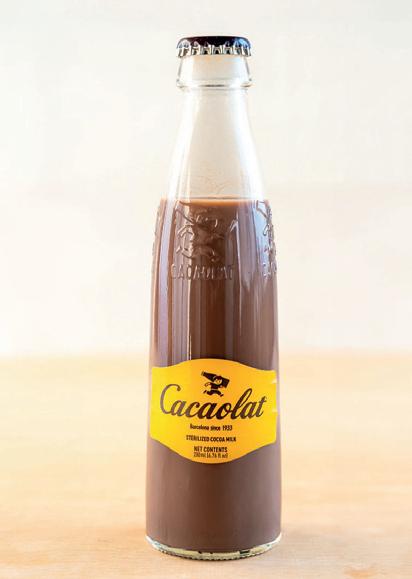
The government has launched a 12-week consultation inviting views from across the hospitality sector as part of a statutory review of the Pubs Code Adjudicator (PCA).
The statutory review will consider a range of publicly available evidence to inform the government’s conclusions in a report to be published once the review has finished.
Justin Madders MP, Minister for Employment Rights, Competition and Markets said: “I am keen to ensure that interested parties have an opportunity to share their views and would particularly welcome contributions from those who have had reason to use the Pubs Code or engaged with the PCA over the review period.”
“As set out in the regulatory action plan the government is committed to ensuring that regulation is designed and implemented in a way that facilitates growth and investment. Nearly a decade on from the introduction of the Code and establishment of the Adjudicator, the time is now right to ask if the current model still works effectively for the everchanging pubs landscape. Therefore, alongside the statutory review, the government is launching the first post-implementation review of the Pubs Code.”
“The post-implementation review call for input will run for the same 12-week period and will specifically consider the Code’s impact since its introduction in 2016, including”:
• the extent to which it is working
• if it has achieved its objectives
• whether the current regulation remains the most appropriate approach
• if intervention and regulation is still required
The Department for Business and Trade (DBT) is now calling on pub tenants, pub-owning businesses, trade bodies, legal professionals and all relevant stakeholders to share their experiences and evidence relating to the operation of the Code and the performance of the PCA during the three-year period from 1 April 2022 to 31 March 2025, through a consultation which closes on August 14.
The Pubs Code, a set of mandatory regulations in England and Wales was introduced to ensure pub tenants who are under contract to sell products provided by their landlord (tied tenants) are not worse off than if they were free to serve what they chose (free-of-tie tenants).
The code was developed partly due to concern that tied tenants were being unfairly treated by their landlords and had much less bargaining power when it came to lease negotiations.
The main provision of the Pubs Code allows tenants to request their landlord offer a “Market Rent Only” (MRO) option, which reflects what the tenant could rent the pub for, free-of-tie.
The Market Rent Only (MRO) option clause was introduced to the House of Commons by Greg Mulholland, then the MP for Leeds North West, who is now the Campaign Director of the Campaign for Pubs and Chair of the British Pub Confederation. The vote on 18th November 2014 was the only defeat on legislation suffered by the then Coalition Government, with the Conservatives within the Coalition strongly opposing the MRO option
The PCA, appointed by the Secretary of State for Business and Trade, is responsible for enforcing compliance with the Code, issuing guidance, advising stakeholders, and arbitrating disputes. This third statutory review, required by legislation, will also feed into a broader post-implementation review (PIR) of the Pubs Code, examining whether the regulation remains fit for purpose nearly a decade on.
A BBPA spokesperson said: “It’s heartening that this review recognises the Government’s desire to reduce red tape and the acute cost burden on our sector.
“The partnership pub model and a successful relationship between pub operating companies and Publicans is a vital cog in the sector and the Pubs Code has played an important role in embedding improvements.
“However, it is essential that the statutory review and PostImplementation Review (PIR) ensure the Code remains fit for purpose. They must also focus on reducing the Code’s cost burdens and ensuring its approach accurately reflects the current pub landscape. This will enable all parties to continue investing with confidence and help keep vibrant pubs at the heart of their communities.”
The government said it will also consider a range of evidence to inform a post-implementation review of the Pubs Code including views and evidence submitted from stakeholders. Under the Better Regulation Framework, the Department for Business and Trade is expected to complete a post-implementation review of the primary legislation and subsequent regulations, which will consider the costs and benefits of the regulations since its implementation.
The post-implementation review will consider:
• the Code’s impact since it came into force in 2016
• the extent to which the regulation is working
• if the policy has achieved its objectives
• whether the intervention is the most appropriate approach
• if intervention and regulation is still required
Madders added: “If a statutory Code is still necessary, it will further consider if the current approach is still the most appropriate one or if any changes should be made. This will include whether the PCA is still required, should be retained in its current form or should be reformed or consolidated with another public body.”
“Pub models have changed in recent years in England and Wales, with a reduction in non-managed pubs, including tied pubs, and an increasing popularity of management arrangements. Management arrangements include profit or turnover share agreements (sometimes referred to as ‘hybrid operator agreements’). The PCA has recently said these agreements may fall within the definition of a tied pub for the purposes of the Pubs Code but is not aware of evidence of significant harm to operators from these types of agreements.”
This consultation comes at a critical moment for the UK pub sector, which continues to face mounting economic pressures, shifting consumer habits, and calls for fairer and more transparent business practices.
The consultation is open until 14 August 2025, and submissions can be made via the government’s website
A full report of findings will be published in due course and laid before Parliament by the Secretary of State.


Over the last year, the number of job vacancies within accommodation and food service has dropped by 21.3%, and by 2.4% in the last quarter alone. These statistics alone would paint a concerning picture of the UK’s hospitality industry, but take any metric and the snapshot of this important industry is a worrying one: insolvency rates, tax bills, and rising operating costs all tell the same story of increasingly tough market conditions.
As a result of recent National Insurance, Living, and Minimum Wage increases and cuts to business rates relief, alongside longer-term economic challenges from both pre- and post-Covid, the hospitality industry is being buffeted from all sides.
Whilst difficulties cannot be denied, there are practical steps businesses can take to strengthen against the challenges. It is essential operators have the tools at their disposal to pursue these.
EMBRACING THE FUTURE OF TECH
Reflected in the drop in vacancies, many businesses are also scaling
back on new site openings. For some this may free up time and money which can instead be invested into developing technology capabilities. Self-ordering kiosks or automated chatbots can organise bookings, for instance, and can help increase efficiency as headcounts remain static or decrease.
Indeed, if economic conditions worsen and businesses continue to be unable to maintain typical staff levels, this move towards – and need for – automation will intensify.
CHAMPIONING PEOPLE OF THE PRESENT
It is important, though, that innovative functions are used selectively and tailored to a business’s needs. While reducing headcount may be helpful to some companies, they should not do this at the expense of losing the talented people in place which make the business tick.
It is increasingly important for businesses to retain their best staff. From a practical and administrative perspective, this minimises time and money spent on recruitment, whilst experienced staff are often able to operate more efficiently than those new to a business.
Good retention rates also enhance performance and culture. Keeping long-standing staff in place keeps their experience in-house, and allows beneficial relationships with customers and colleagues to develop.
Offering appealing benefits packages is a key tool in achieving this. Whilst traditional perks of free/discounted food and drink remain on the table, to be the most competitive businesses should also look at providing career development training, alongside engaging social events and team building.
Salary sacrifice schemes are a further tactic to consider. These see employees “sacrifice” some of their monthly salary in return for increased employer pension contributions. These not only help employees plan for their retirement, but offer tax benefits as National Insurance and Income Tax payments are reduced, whilst higher and additional rate
By Isabelle Shepherd, Partner, HaysMac (www.haysmac.com)
tax payers will also see the need to adjust their PAYE code number reduced.
These schemes offer compelling advantages for employers, too, who will see their own National Insurance contributions lowered. Some businesses have found it effective to use this saved money to create a “pot” for further staff rewards.
It is of course essential that these schemes are introduced carefully, for instance ensuring that any “sacrifice” does not mean a salary drops below National Living or Minimum Wages.
As well as evaluating operations within existing company models, Directors may also want to evaluate a company’s overall structure.
Many present-day hospitality groups have inherited a “one company per site” model which was beneficial when first established, but has now become overly complex and not fit for purpose. This structure creates convoluted layers of compliance, account preparation, audit, and business tax computation obligations.
Groups should not sleepwalk into these situations, but instead regularly review their structure, assessing whether an admittedly significant one-off cost for restructuring might in fact offer much greater financial and efficiency returns in the long run.
Hospitality businesses are having to navigate choppy waters – this is undeniable. But what is also clear is that opportunities for survival, and even growth, persist. Combining financial and policy awareness with practical action and innovative thinking can create strong defences for businesses looking to weather this storm. One must hope they will soon be thrown a lifeline, but until then there remain reasons to be optimistic for the months ahead.
Unemployment in the UK rose in April to the highest level in almost four years, according to official figures, as tax increases introduced by Chancellor Rachel Reeves added to a larger slowdown in the jobs market.
The Office for National Statistics (ONS) said the unemployment rate increased to 4.6% in the three months to the end of April, up from 4.5% on the previous three-month period, to hit the highest level since summer 2021.
Annual growth in regular wages slowed to 5.2% from a revised 5.5%, below City economists’ forecasts for a reading of 5.3%.
Liz McKeown, the ONS director of economic statistics, said: “There continues to be weakening in the labour market, with the number of people on payroll falling notably. Feedback from our vacancies survey suggests some firms may be holding back from recruiting new workers or replacing people when they move on.

“Earnings growth has slowed in both cash and real terms, though it remains strong by historic standards. Public sector pay is now growing at a higher rate than wages in the private sector.”
Furthermore, the Labour Market Overview, published today by the ONS, estimates the number of payrolled employees in the UK in May 2025 decreased by 109,000, compared to the month before. This loss of jobs exceeds predictions from both the Office for Budget Responsibility (OBR) and a major bank.
Bringing the next level tech entertainment into your pub/social club/holiday park offering is a sure-fire way to improve your revenue streams
But while that may sound straightforward common sense, it isn’t necessarily that clear cut. The level of revenue generated depends very much on the type of entertainment on offer. As a publican, what options are out there for you when it comes to your entertainment tech!
When it comes to offering entertainment you need a interactive product, that will give you the option to react and interact with your audience and not tie you into a long contract!! So what other things make you truly stand out?
Well, a Pub Quiz Night is a prime opportunity to attract a crowd! Spreading your quiz over multiple rounds keeps participants inside your venue for the long haul. Try to pick a non-football night for maximum draw. And when it comes to quizzing, our pub entertainment system, The Entertainer, does all the hard work for you
The OBR originally predicted the changes to employer NICs would cost 50,000 jobs, before revising its prediction to say the impact would be higher. Deutsche Bank predicted it would cost 100,000 jobs.
The damaging and worse-than-expected impact of the NICs changes on employment, felt most intensely by foundational sectors like hospitality, necessitates an urgent review and reversal of the increases.
Kate Nicholls, Chief Executive of UKHospitality, said: “Losing more than 100,000 jobs across the economy in a month goes far beyond the worstcase scenario predicted by the Government’s own fiscal watchdog, major banks, and countless business groups.
“We were clear at the time that the changes to NICs were a tax on jobs, and so it is sadly proving.
“At a time when we are all striving to grow the economy and help people back into work, the changes to NICs are acting as an anchor to the Government’s ambitions.
“Sectors like hospitality are the very sectors you need to create jobs in every part of the UK and for people of all ages, education and background, but hospitality and those working part-time are among the hardest hit by these tax increases.
“These shocking figures should make it abundantly clear to the Government that the changes to employer NICs are inflicting more harm than good, and they should be reviewed and reversed urgently.”

Music has always been a great way of ‘getting the party started’ whether you use playlists or you’re a budding DJ, we have thousands of tracks at your fingertips, giving you freedom to get the mood right.
The Entertainer acts as a de facto KARAOKE fest, providing modern and classic karaoke tracks supplied a market leader of karaoke! Race nights? I hear you say! The Entertainer allows you to screen races – be that pub that has horse/pig/afghan/trotting racing. These can provide great pub fund raiser opportunities.
Bongo Bingo the craze that is sweeping the nation !!!, why not try our version DISCO BINGO whether you are a new romantic we have Back to the 80s or you want to put the boots and cowboy hat on!!! There is a game for you to be sure. How to maximise revenue , you can even advertise via the Entertainer to promote your various entertainment nights, or you can even involve local businesses and services , using our online advert system you can add your branding from the beach or the office (I would prefer the beach option) So whether you’re looking for holiday park entertainment, social club entertainment,
Britain’s hospitality sector has enjoyed a welcome surge in eating out and drinks sales this spring, thanks to favourable weather and strong consumer demand—but industry experts are warning that storm clouds may be gathering as inflation pressures mount.
The sector’s remarkable surge in demand, is largely driven by warm weather, according to the latest report from Lumina Intelligence’s Eating and Drinking Out Panel (EDOP).
Despite ongoing inflationary pressures, consumers embraced social dining, boosting visit frequency by 9.2% year-on-year, averaging 1.6 occasions per week, while average spend increased by 10.7%.
The sunny weather proved a boon for pubs and bars, which recorded the largest rise in share of occasions, up by 2.7 percentage points (ppts), as consumers favoured these social venues. In contrast, coffee and sandwich shops saw a decline of -2.5ppts, reflecting a shift towards social-led experiences.
• Social Dining Dominates: Dinner occasions rose by 0.6ppts, while drinks-only visits fell by -0.9ppts, highlighting the shift towards meal-centric gatherings.
• Rising Prices Impact Penetration: Despite frequency gains, overall eating out penetration slightly dipped by0.6ppts to 56.7%, as some consumers cut back due to higher costs.
• Burgers and Salads Lead Menu Choices: Pub visits drove a +0.9ppts rise in burger orders, while salads saw the largest growth, up +1.4ppts, attributed to the warm weather.
The report also highlighted key macroeconomic factors influencing consumer behaviour. Despite a slight decline in CPI inflation from 3.8% to 3.4%, and an improvement in GFK Consumer Confidence from -21 to19, the impact of rising interest rates and the average price of a pint of beer exceeding £5 affected consumer spending patterns.
Linda Haden, Insights Lead at Lumina Intelligence, commented: “Our latest insights demonstrate the resilience of the UK’s eating out market. Despite rising costs, consumers are making the most of social occasions, especially in pubs and bars. As we move into summer, this trend is expected to continue.”
The positive sales for the trade was also reflected in CGA by NIQ’s Drinks Tracker, which saw both on premise suppliers and operators enjoying double-digit drinks sales growth as consumers flock to beer and cider in the warm weather.
CGA by NIQ’s Daily Drinks Tracker reveals a like-for-like increase of 12% in average sales in managed venues in the week to Saturday 3 May—by far the best performance of the year so far. This followed 2% growth in the seven days to Saturday 26 April, and high single-digit growth in the first half of April.
Coming on the back of a solid March, the latest run of growth means drinks sales have now been in in yearon-year growth for ten of the last 11 weeks.
Trading subsided briefly after Easter, with some consumers watching their spending in the aftermath of the long Bank Holiday weekend. But as the sunshine set in across many parts of Britain, daily sales rocketed by between 13% and 30% on every day from Sunday 27 April to Friday 1 May.
High temperatures have made it a particularly strong month for Long Alcoholic Drinks (LAD) categories. The Daily Drinks Tracker shows beer and cider sales soared by 15% and 43% respectively in the week to 3 May, after growth of 3% and 13% over the previous seven days.
Soft drinks also felt the benefit of consumer seeking refreshment on hot days, with sales up by 8% and 9% over the two weeks. Sprits took advantage of interest in cocktails with 2% growth in the week to 3 May, but wine sales were down in both weeks.
Rachel Weller, CGA by NIQ’s commercial lead, UK & Ireland, said: “After a challenging start to 2025, the prolonged good weather has made for a very goodSpring for On Premise drinks sales.
The Oxford Partnership’s latest Market Watch Snapshot reveals that while overall draught volumes remained steady in May, consumer preferences are continuing to shift, with Premium and World Lagers leading the charge in hospitality venues across the UK.
Premium Lager volumes rose by +7.3% over the last 12 weeks, with World Lager up by +10.3%. In contrast, Core Lager and World 4% Lager experienced declines of -5.2% and -1.6% respectively. These trends point to a notable consumer pivot toward more premium and globally recognised options.
“This sustained growth in the premium category shows that, even as economic pressures persist, consumers are prioritising quality and are willing to spend more for it,” said Alison Jordan, CEO of The Oxford Partnership.
Despite a minor year-to-date decline in the number of operating outlets (-0.7%), trading hours are on the rise. The latest data shows a +0.57% increase in operating hours over the past four weeks, as venues extend opening times to meet demand.
Consumer behaviour further supports this upward momentum. Average dwell time rose by +12.3%, and

occupancy was up by +5.6% over the last 12 weeks—both strong indicators of deeper, more meaningful engagement.
“We’re seeing fewer but more purposeful visits. Consumers are making each occasion count, staying longer and spending more per visit,” added Jordan.
Spending patterns reinforce this shift. Card transaction data from Barclays shows a +2.5% increase in pub and bar spending and a +2.6% rise in restaurants.
Year-to-date, drink spend per head has climbed +5.0%, while food spend rose +6.6%, demonstrating that social experiences remain a priority despite inflation.
Regionally, suburban venues outperformed other areas with +2.2% growth over 12 weeks. Meanwhile, rural and city locations presented a more mixed picture. London continues to trail with YTD volumes down -3.9%, though early signs of stabilisation are emerging.
While Craft Beer saw a continued decline of -3.9%, Stout proved resilient with a +5.4% gain, rounding off a month of mixed but telling consumer trends.
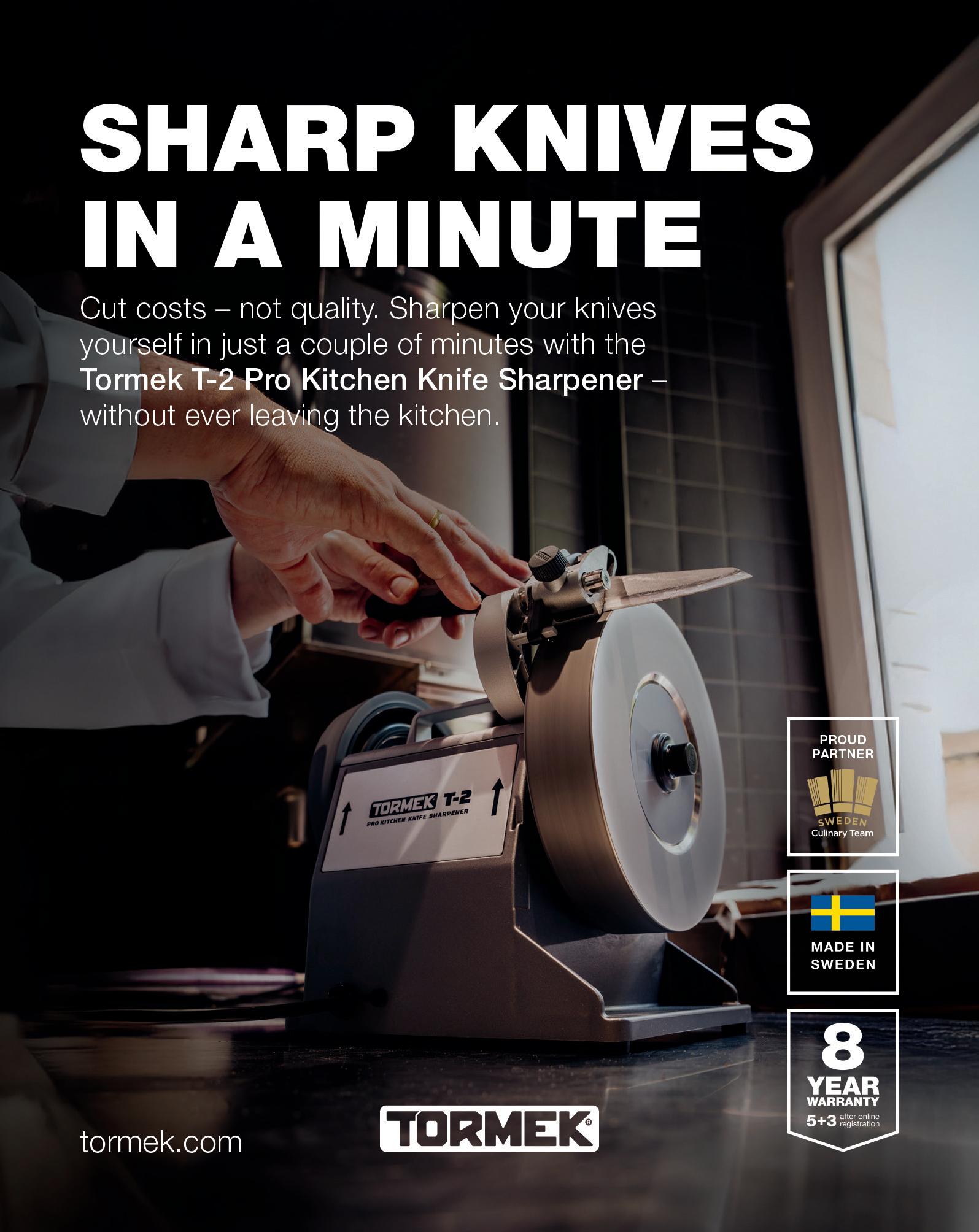

The UK hospitality sector has long relied on overseas talent to fill roles in kitchens, hotels, and front-of-house operations. However, recent government policy shifts aimed at curbing net migration have brought a new wave of scrutiny on businesses that hire foreign workers. With tighter visa rules, increased salary thresholds, and stricter sponsor obligations, employers now face a radically changing compliance environment. While the full details of a recent Immigration White Paper have yet to be announced, savvy employers will start to prepare now for rule changes expected later this year.
Since 2021, hospitality businesses have benefited from being able to sponsor staff in roles classified at RQF Level 3 or above –roughly equivalent to A-level qualifications. This has successfully covered a variety of roles from chefs to bar and restaurant managers. A proposed raising of the skills threshold to RQF Level 6 (broadly equivalent to degree level) will take these and many other roles out of the sponsored work scheme altogether, unless an exception applies, affecting employers who rely on foreign workers to fill such positions.
A new Temporary Shortage List (TSL) to address short-term labour issues will allow certain roles at RQF35 to continue to be sponsored but there have been suggestions that hospitality roles such as chefs are not a priority. It’s also important to note that there will be no expectation of workers under it being allowed to stay long-term.
Chefs are a particular concern for the industry because potential hires will not typically learn their craft at university. Previously, they benefited from inclusion on the Shortage Occupation List, which recognised jobs and trades where experience was more important than formal qualifications.
Whether similar recognition will continue under the TSL remains to be seen. In the meantime, employers may need to prepare to offer more competitive salaries for roles still capable of sponsorship, such as purchasing managers and HR directors, with standard threshold salaries due to rise from the current base of £38,700 per year.
The government is planning a thorough review of salary requirements, including discounts, to ensure that international recruitment is never an alternative to fair pay. It has also signalled its desire to recognise regional variations in pay, but it has not yet said how this will work in practice.
Moving forward, employers will be expected to demonstrate a ‘workforce strategy’ showing investment in domestic talent and skills. It is not yet clear whether these strategies are expected to come from individual employers or sectoral bodies but could involve expanding apprenticeships and vocational training or undertaking partnerships with colleges or other training providers. The directive is straight forward: international recruitment must not be a substitute for developing UK-based talent.
By Gary McIndoe, Managing Partner, Latitude Law
Beyond the White Paper, the government’s negotiations with the European Commission seem set to herald an extension of youth mobility to EU citizens aged 18-30. This will not require the higher English language requirements being asked of other visas and could cover a wide list of positions from front-of-house, junior chefs, kitchen staff and housekeeping to event workers, bar staff, sommeliers, concierge and reception personnel.
Whilst a one-year visa has been discussed, it has been suggested it could be valid for two years. This would be a positive step for UK hospitality, but it remains to be seen how popular the UK will be as a destination for young workers having to pay visa fees just short of £2,000 based on a two-year entry, and who may then struggle to extend their stay once their time in the youth mobility route comes to an end.
Getting Prepared: What Employers Need to Do
WITH ENFORCEMENT LIKELY TO INCREASE, EMPLOYERS SHOULD ACT NOW TO PREPARE FOR A TOUGHER COMPLIANCE ENVIRONMENT. THIS INCLUDES:
• Reviewing sponsorship licences to ensure they’re valid, up to date, and aligned with the latest guidance.
• Carrying out internal audits of right-to-work documentation and visa expiry dates, particularly for timelimited or temporary workers.
• Staying informed about changes in Home Office rules and sector-specific developments.
• Taking legal advice where necessary regarding licenses and the visa application process.
It’s also vital to consider how your organisation demonstrates its commitment to UK talent development. Government messaging suggests that businesses failing to show a proactive domestic workforce strategy may face additional scrutiny or be blocked from sponsoring overseas workers altogether.
Forward-thinking operators should therefore be looking at workforce initiatives such as apprenticeships and return-to-work schemes to help them stay compliant and future-proof their talent pipeline.
Failing to comply with the updated rules could result in severe consequences with fines for employers of up to £60,000 per illegal worker and the possibility of having your licence revoked, cutting off access to skilled migrant talent entirely.
In a sector already grappling with high turnover and labour shortages, this could have devastating consequences. Business interruption, reputational damage, and loss of talent are all likely outcomes of non-compliance.
The message from government is clear: hospitality businesses must rely less on migration and do more to develop UK-based talent. But for an industry already stretched, the tools for doing so remain uncertain and employers should not bank on short-term fixes. Now is the time to carry out audits, upskill your teams and prepare for a more tightly controlled system of workforce sponsorship. Those who act early and invest wisely will be better placed to navigate what lies ahead.
The 2025
UK com-
deliver employee satisfaction and workplace excellence. Results for the
are collated through
measuring employee experience,
Dean Livesey, director of
completing
and recognition, job satisfaction, and
to Work at Hall & Woodhouse, said: “We are thrilled to feature on The Sunday Times Best Places to Work list for the second year running. Being a values-led business, our team is central to everything we do. This award confirms our team feel valued and a part of the Hall & Woodhouse family, something we continuously strive for.
“We have built on the foundations we laid out in the previous year to become an even better employer, and I’m delighted to have achieved this goal. It is imperative to us as a business that Hall & Woodhouse remains a great place to work for generations to come.”
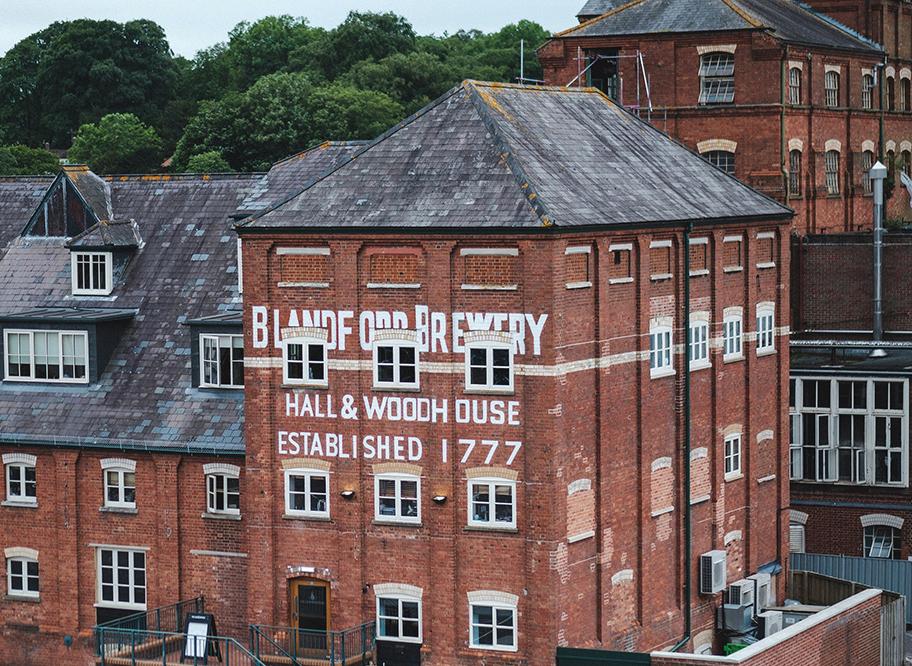
SFA Saniflo has gone bigger and bolder again this year at the Installer Show. Stand 4F22 will once again showcase the company’s range of pumps and macerators on one side, with the Kinedo range of shower products on the other.
A huge range of products will be on display, including some stunning new additions to the range.
On the aesthetically pleasing Kinedo stand, the new range of Solo Design + walk-ins will feature strongly. As well as black, brushed stainless steel and gold frames, there will be examples of some beautiful new glass options, including fluted glass, Mondrian and Art Deco patterns and privacy screens. Accompanying the walk-ins is the new Kinediva shower tray. This latest cuttable tray in the range includes a striking marine blue version which will be teamed with a new patterned Kinewall Shower panel, Frangipani. The revamped Kinemoon Style shower tray is being showcased alongside additional Kinewall designs that are new to the range. They include the funky Giraffe, the trendy Subway and the stylish Tropical Tile patterns.

been introduced to provide solutions for the management of clear water. Saniflo has used 70 years’ experience in designing innovative black and grey water discharge solutions to develop a range of products that meet the need to collect, supply and distribute clear water; whether from rivers, ponds, pools, wells tanks and from domestic homes.
Sanijet is a range of 5 stainless steel centrifugal surface pumps optimised by a Venturi (jet) system for increased suction up to 8m. Automated for ondemand and self-priming for a simple start, the pumps have a max head between 50 and 54m and max flow rate from 3.6m³ up to 5m³.
The SaniMHP is a 10-strong range of multi-stage surface pumps ideal for irrigation, rainwater use and water supply. From the 4-40 through to the 9-50 PC4 model offering max head ranges from 40m to 52m and max flow from 4m³ to 8.7m³, there is a model that will tackle pretty much every clean water movement requirement.
Saniboost booster includes a buffer tank that limits the frequent starts and stops of the pump to which reduces noise disturbances. Each model offers guaranteed service pressure on drip irrigation installations or automatic flush mechanisms.

Whilst more practical in nature, the Saniflo side of the stand will have at least as much interest thanks to the launch of the new Clearwater range of jet pumps, horizontal multi-stage centrifugal and domestic booster pumps. The new Sanijet, SaniMHP and Saniboost pumps have
With 4 models in the range and max head capacities between 40 –54m, the new Saniboost range is a domestic booster pump ideal for optimised and smooth water supply. Max flow from 3.6m³ to 5.2m³ ensures there is a model to increase and regulate the pressure of water collected in most sizes of domestic water tank and the units operate automatically and are particularly suited for low-flow consumption. A
Saniboost Smart is a pressurisation unit equipped with a variable speed multi-stage pump, an integrated electronic pressurisation control and a hydraulic shock absorber. A multifunctional water supply system, it can be installed in apartments as well as houses for increasing water pressure and for irrigation. As well as the new Clearwater range, a comprehensive selection of Saniflo’s world-leading range of pumps, macerators and sub pumps will be on display with some working models to demonstrate how quiet and efficient Saniflo products are.
Saniflo is looking forward to welcoming current and new customers to stand over the three days of the show.
For further information, please visit www.sfasaniflo.com
A new report analysing the pub and bar sector reveals an optimistic outlook from both operators and consumers, despite ongoing economic challenges.
Published by DesignMyNight, an Access Group company and leading hospitality discovery platform with up to 3.9 million monthly users, the survey-based report indicates a positive sentiment for the future, with 74% of operators expressing optimism about the longevity of their business. Notably, 36% believe their business is thriving and are highly confident that they will still be trading in 12 months.
This comes despite widespread cost pressures and the impact they have had on the industry, including the recent increase in employer National Insurance contributions, rising average wage rates, and a reduction in business rates relief.
Consumers largely mirror this positive sentiment, with the majority expecting to visit pubs and bars to the same extent as the previous 12 months, and close to a third citing a desire to visit more frequently. Interestingly, the report reveals that consumers continue to regard visiting the on-trade as an important part of their day-to-day lives, despite pricing remaining a sensitive issue. The report suggests there is a notable difference between what consumers consider fair and what venues charge for drinks. For example, consumers feel the price of a pint of
lager to be fair at £5.15, while operators believe an average of £6.12 to be acceptable, signalling disparity between what landlords and customers deem to be good value for money.
When it comes to adding value for customers, the report highlights opportunities for pubs and bars to diversify their offerings beyond food and drink, by providing in-venue entertainment. For instance, despite 83% of consumers finding live performances appealing, only 60% of venues hosted them in the past year. The utilisation of ticketed events is a powerful growth strategy, with 60% of consumers finding events appealing, and 66% of venues already running at least one live event in the past 12 months. A promising 33% of venues plan to increase the frequency of such events, providing consumers with memorable experiences that increase dwell time and venue spend.
Additionally, the report highlights the underutilised potential of venue hire as a lucrative revenue stream. A significant 88% of venues are available for hire, and 57% of those currently offering venue hire agree it is more profitable than standard operations.
Diving deeper into the evolving guest experience, the report highlights how important customer experience is and how technology can support and enhance this. While 93% of venues use a digital booking system, there’s a clear gap in more advanced solutions. Consumers are increas-
ingly expecting options like order and pay at table (59% for drinks, 60% for food), which only 27% of venues currently offer for drinks.
Katie Houghton, Head of Brand at DesignMyNight said: “Despite very real challenges in the sector, our report uncovers a remarkably positive outlook from operators. Hospitality is a truly resilient sector, driven by people who are incredibly passionate about what they do, and it’s encouraging to see that sentiment remains strong.
“It’s clear that there is an opportunity here for venues to align with evolving consumer desires, particularly in areas like live entertainment and interactive experiences. Hospitality is extremely agile, capable of pivoting to meet these unique needs and expectations, but there is still plenty that can be nurtured and capitalised on.
“It’s more important than ever that consumers are being offered value for money, and technology is a key driver in helping businesses deliver this, spotting and managing trends, driving efficiency across all areas, maximising offer visibility, and much more.”
The research has been published in a report that can be downloaded here. The report provides comprehensive insights for pub and bar operators and hospitality industry stakeholders seeking to understand and navigate the evolving landscape of the UK pub and bar sector.
The beer and pub sector has united to support the BBPA’s diversity and inclusion charter – the first ever for the sector – on its third anniversary.
The British Beer & Pub Association (BBPA) marked the #OpenToAll milestone, by announcing that the charter has continued to receive the backing of a wide range of supporter organisations and businesses.
The charter, which is the first of its kind for the sector, helps businesses within the pub and brewing sector embed and improve diversity and inclusion across their operation and venues.
Those who sign it commit to putting diversity and inclusion across the board, no matter the role or level of staff member.

This includes placing diversity and inclusion on board-level agendas and ensure it forms part of our ongoing business and future strategy. It also includes appointing a senior leader of the business as a diversity and inclusion champion who regularly engages in training opportunities and events.
Now, three years after its launch, their commitment to creating welcoming spaces and workplaces is as strong as ever, cementing the sector’s reputation as a vital support for staff and communities.
Supporters range from operators and trade associations to charities, who have recognised the value of the charter and its aim to welcome and embrace all.
The Open To All charter is part of BBPA members’ impressive strides in improving their inclusivity.
Fuller’s has focused on increasing the number of staff who are neurodiverse or have intellectual disabilities. The company commissioned a guide which gives staff the confidence and skills to hire team members from a hugely underrepresented section of the community and it has beaten its recruitment targets. Fuller’s now has ambitions to share this learning with the wider industry.
Meanwhile, Punch Pubs teamed up with Ask For Clive, a charity that helps venues promote LGBTQ+ inclusion and stamp out discrimination. They also worked with Calm In A Box to provide their pubs and staff with webinars that promote mental wellbeing, with topics including how managing anxiety and coping with the menopause.
Pub company and brewer Greene King launched its Reverse Mentoring programme in 2022, and since then
has paired over 70 of its leaders with team members from its Employee-Led Inclusion Groups. The scheme allows leaders to gain a new perspective on the business, to witness and have a deeper understanding of the challenges and opportunities there are for people from under-represented backgrounds. Greene King has recently launched its “Customer Promise”, which reaffirms its commitment to ensuring a safe and welcoming environment for all customers, with managers provided with training and guidance on handling challenging situations effectively.
Another BBPA member, Heineken, focused on training staff with a guide that has led to greater confidence in serving disabled customers, which led to improved interactions and customer satisfaction.
The Open To All Charter aims to boost the industry’s efforts to nurture inclusive environments by setting out key commitments.
To support these commitments, the BBPA developed a comprehensive toolkit, providing practical guidance for members about how to incorporate the commitments.
Emma McClarkin, Chief Executive of the British Beer and Pub Association, said: “In just three short years our industry has come a long way in being more inclusive and diverse, which can only be a good thing for their staff and customers.
“Our members have spearheaded fantastic, practical initiatives, and there are so many individuals who have led from the front and made sure their workplaces are truly Open To All.
“I am proud of every single one of our supporters who are helping to ensure our sector continues to welcome all who step through the door.”
Nick Mackenzie, Chief Executive of Greene King and Chairman of the British Beer and Pub Association, said: “The pub has been an important part of society for centuries, and for it to continue to be so, it is crucial we create social spaces where everyone feels welcome. Through the combined efforts of our industry, we are making great strides in our ambition to make sure everyone feels like they belong. By sharing learnings, ideas and initiatives enables us all to build on this success, so we can all play a part in bringing greater diversity and representation to the hospitality sector.”In June 2023, the BBPA was honoured with the Diversity and Inclusion award at the Trade Association Forum Awards, recognising the development and success of the Open To All campaign as a model for best practice in the sector.
It’s once again time to find the country’s best kitchen porter, as Winterhalter launches the eleventh edition of the Kitchen Porter of the Year competition, which aims to honour the amazing work done by these too often unsung heroes of the foodservice and catering industries.
Since launching in 2013 the competition has become one of the largest and most prestigious awards in the industry. It has garnered widespread praise for its focus on the essential role KPs play in commercial kitchens. In many businesses, KPs go above and beyond their standard duties every day in order to help their colleagues and keep things running smoothly. Many of the biggest names in the industry got started as KPs, and vouch that it was a great foundation for their future careers.
Nearly 800 nominations have been made over the years since the first competition, representing all sectors of foodservice including some of the UK’s best hotels and restaurants, pubs, bars, clubs and a huge range of institutional and contract caterers, demonstrating the vital importance of KPs throughout the sector.
“KP of the Year is hugely important to us at Winterhalter,” says Stephen Kinkead, managing director of Winterhalter UK. “Every year the standard of entries gets more impressive, and it’s always a delight to discover the stories of not just these dedicated KPs but also the entire
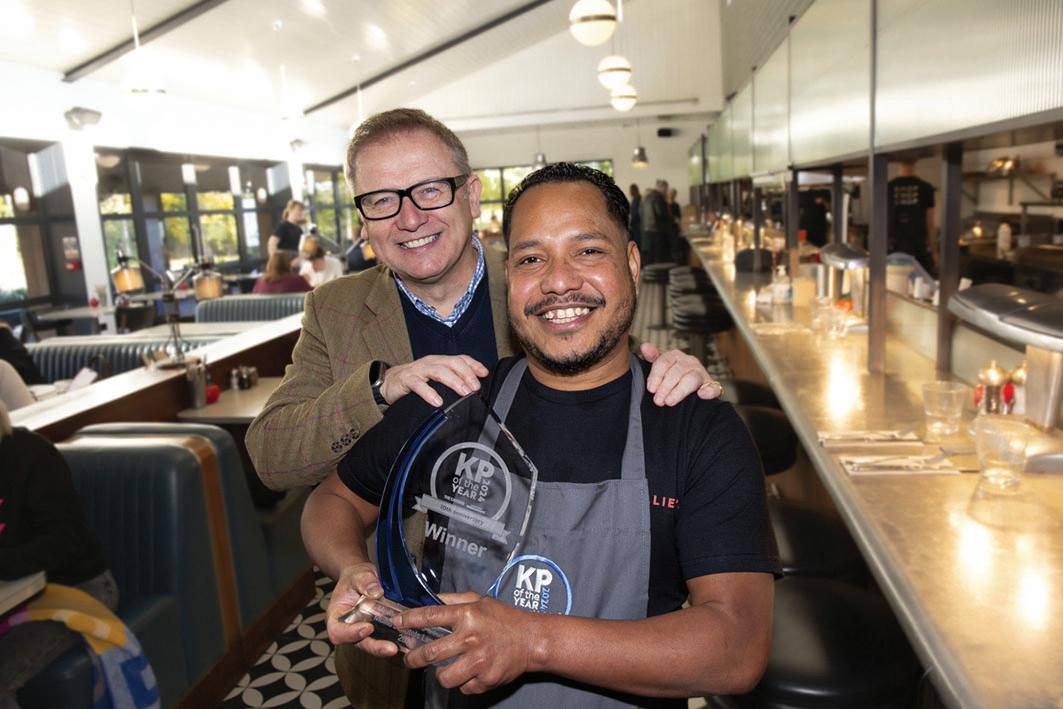
kitchen teams they work with.”
Nominations for this year’s award are now open, with 29th August 2025 the final date for entries. A shortlist of ten will be selected, before a panel of judges made up of industry experts choose the winner.
2025’s KP of the Year will be awarded the coveted KP of the Year tro-
phy, £1,000 in vouchers and a celebratory meal for family and friends in a casual dining restaurant of their choice. Furthermore, the winning KP’s employer will get a Winterhalter dishwasher worth up to £10,000. As well as this, two highly commended KPs will receive a certificate and vouchers for hospitality experiences, and every KP nominated will receive a bespoke KP of the Year Oliver Hardy apron.
“We’re looking forward to learning about more of the UK’s most dedicated KPs,” says Stephen. “If you’ve got someone in your kitchen who you want to celebrate, the time to do it is now!”
Links to the nomination form, as well as more information about the competition and previous winners, can be found at www.kpoftheyear.com.
Winterhalter provides a total solution for dishwashing and glasswashing, from pre-sales advice to after-sales service, training and maintenance, with sustainability fitted as standard.
Alongside its market-leading dish washers and glass washers, the company’s range includes utensil washers, advanced water treatment machines, and cleaning detergents and rinse aids. For further details, call Winterhalter on 01908 359000, visit www.winterhalter.com/uk-en/ or email info@winterhalter.co.uk.
By Christina Earl, Head of Innovation and Business Development at Surrey Choices

The Future of Hospitality and Catering: Embracing Inclusive Recruitment
The hospitality and catering industry thrives on adaptability, yet it faces a pressing challenge; staff shortages and high turnover rates. While businesses scramble for solutions, they often overlook one of the most valuable and untapped talent pools – disabled workers.
This is not about corporate goodwill; it is about strengthening the workforce with skilled, committed individuals who bring unique perspectives and reliability to the industry.
Disability inclusion in hiring is a strategic investment that leads to higher staff retention, improved customer service and a stronger brand reputation.
In an industry where consistency and quality are key, businesses that embrace inclusive hiring practices will find themselves better positioned for long-term success.
Customers increasingly support brands that reflect their values, and inclusivity is becoming a significant factor in consumer loyalty. A diverse workforce fosters innovation and problemsolving, essential traits in an industry that is constantly evolving.
Despite a strong willingness to work, disabled job seekers often face unnecessary barriers in recruitment processes. Employers who actively remove these barriers open their doors to a highly capable, dedicated workforce.
The traditional hiring model often fails to accommodate different ways of showcasing talent. Practical work trials, task-based assessments and alternative interview formats allow candidates to demonstrate their skills in a way that is more reflective of their abilities than a conventional sit-down interview.
Additionally, job descriptions frequently contain requirements that unintentionally exclude talented candidates. Businesses should assess whether criteria such as a driver’s licence or prior experience are genuinely necessary for the role.
Hospitality thrives on enthusiasm, work ethic and reliability – qualities that many disabled workers possess in abundance. The right training and support can unlock their full potential, benefiting both the employee and the employer.
A persistent misconception is that hiring disabled workers requires extensive, costly adjustments. The reality is far different. Most workplace accommodations are simple and inexpensive, with the average cost of a reasonable adjustment being under £50. In many cases, small changes – such as offering flexible shifts, providing assistive tools, or allowing employees to focus on their strengths – make a significant difference in job performance and satisfaction.
For example, a Costa Coffee branch created a role tailored to an employee’s strengths, allowing them to focus on maintaining cleanliness and organisation while others handled customer-facing tasks. This approach not only supported the employee but also optimised the efficiency of the entire team.
Similarly, at a Surrey branch of Nando’s, a deaf employee flourished in a kitchen role, with colleagues learning basic sign language to improve communication. This simple yet effective measure not only enhanced teamwork but also helped the restaurant connect better with deaf customers. These are real, tangible benefits that extend beyond the workplace and into the customer experience.
CREATING AN INCLUSIVE AND ACCESSIBLE WORKPLACE
The fast-paced nature of hospitality and catering does not mean that inclusion is unattainable. Businesses that take a proactive approach to accessibility will find themselves with a more engaged workforce and a better working environment overall.
Structured training programmes that break down tasks into clear, manageable steps benefit all employees, not just those with disabilities. Visual guides and checklists can reduce workplace anxiety and improve efficiency for everyone, not just disabled staff, particularly so in high-pressure environments. A mentorship or buddy system can help employees integrate into their roles more smoothly while also strengthening team cohesion.
TAKING ACTION: HOW BUSINESSES CAN LEAD IN DISABILITY INCLUSION
Hospitality businesses must recognise that inclusive hiring is not just a legal or ethical responsibility – it is a business advantage. The next steps are clear. Employers should reassess their hiring practices, ensure job descriptions are accessible, and consider alternative interview methods. Partnering with supported employment programmes and engaging with initiatives such as the Disability Confident scheme can provide valuable guidance in making meaningful changes.
CONCLUSION: INCLUSION AS A COMPETITIVE ADVANTAGE
Disability inclusion should no longer be seen as an afterthought or a charitable gesture – it is a strategic decision that yields long-term benefits. A diverse, disability-confident workforce brings fresh perspectives, fosters innovation and strengthens customer relationships.
The hospitality and catering industry, by its very nature, is about people – both those who serve and those who are served. Now is the time for businesses to embrace inclusivity, not just because it is the right thing to do, but because it makes undeniable business sense.
CAMRA has announced the winners of its Pub Design Awards 2025, celebrating some of the most visually stunning, historically significant and lovingly restored pubs across the UK.
Judged by a panel of experts in design and conservation, the awards are run in collaboration with Historic England and highlight both the importance and vulnerability of pub architecture, from ornate Victorian gin palaces to imaginative contemporary spaces.
This year’s winners range from sensitive restorations of heritage pubs to ambitious new builds and innovative conversions of historic buildings.
Andrew Davison, Chair of the Pub Design Awards judging panel, said: “The Pub Design Awards recognise the highest standards of pub architecture, rewarding artistic flair and painstaking historical conservation. From inviting streetcorner locals to striking medieval coaching inns, there are some stunning pubs in the UK, and the craftmanship involved in making these venues a gorgeous place to enjoy cask beer and real cider or perry should rightfully be applauded. I encourage heritage enthusiasts and pub lovers alike to visit these inspirational buildings.”
Gary Timmins Chair of CAMRA’s Awards Committee added: “This year’s awards are tinged with sadness, as one of our winners, the Python’s Arms, has had to make the heart-breaking decision to close its doors for good. Due to the financial pressures facing all pubs across the UK, the local community has lost what should have been a valuable new social hub for generations to come. Within just a year from being converted into a beautiful pub, this rapid closure should be ringing alarm bells. Real action is needed to support the pub industry, otherwise we will lose many more locals in the near future.”
THE FULL LIST OF PUB DESIGN AWARDS WINNERS ARE:
New Build: given to pubs built in 2024 where the owners have used imagination and flair to create something new and impressive, whilst recognising the traditional qualities of pub hospitality.
WINNER: BOD LICHFIELD, STAFFORDSHIRE
Titanic brewery, Stoke-on-Trent has previously won awards for its conversions of pre-existing buildings, but this is the first time that they
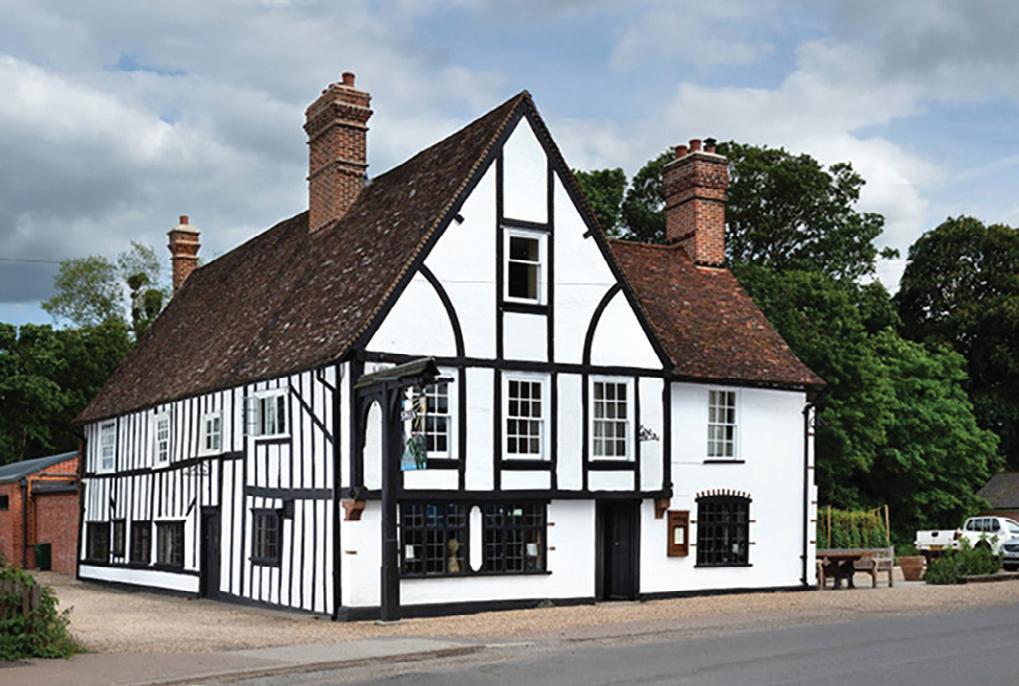
have created a building from scratch. Architect and designer Mark Smith of Mark Smith Design has included several trademark bod design elements in an imaginative and stylish fashion. Judges admired the pub’s industrial chic design, which makes use of recycled wood, distressed paintwork, quirky light fittings and exposed ceiling pipes. The judging panel felt the new pub was a great addition to Lichfield’s beer scene. Historic England Conservation: awarded for work which carefully preserves a pub’s historical architectural features, whilst updating and evolving its facilities to improve the viability of the building, securing it for future generations to enjoy.
WINNER: SWAN, STRATFORD ST MARY, SUFFOLK
The Grade-II listed timber framed pub, believed to date back to the 17th century, has been carefully renovated and conserved by Boudica Inns Ltd, owned by Mark and Sophie Dorber. A glazed conservatory housing a new bar, servery and dining area has been added to the original building, designed by architects KLH of Ipswich. Judges admired how the contemporary design of the large extension, with an exterior finished in steel and glass, made a striking contrast between the older ele-
ments of the pub.
Conversion to Pub Use: rewards outstanding conversions of buildings which were originally built for other uses and have now been transformed into a pub. The judges are looking for conversions which bring out the character of the building and re-use historic features to give atmosphere and a pub ambience.
JOINT WINNER: BOROUGH BEER HOUSE, FARNHAM, SURREY
A conversion of the former Bailiff’s Hall in the historic Grade-II listed Town Hall Buildings, dating from 1674. Architects Madins, commissioned by owner Mark Curran, oversaw the conversion of the former dress shop, sensitively retaining existing features, including beamed ceilings, period fireplaces, wood panelling and a herringbone pattern floor. Custom crafted benches have been designed to be in keeping with the historic character of the building.
JOINT WINNER (NOW CLOSED): PYTHON’S ARMS, LYONSHALL, HEREFORDSHIRE
A conversion of a 13th century rural farm building at Penrhos Court, which once housed the Penrhos Brewery owned by Terry Jones of Monty Python fame, owners Mark Bentham and Laura Lane have carried out a thorough renovation of this characterful building. Judges praised the rustic décor noting characterful design touches such as the lobby doorhandle shaped in the form of a python.
Refurbishment: best refurbishment of an existing pub building, ranging from a complete gutting to enhancing the design of what was originally in the pub. Judges are looking for originality and imagination in the way the building is treated.
WINNER: DRUID INN, GORSEDD, WALES
The latest addition to a small group of pubs owned by Pubs Ltd, a company set up by Jerry Brunning of Brunning and Price, and his wife Beth. Acquired in June 2023 after closure by Thwaites Brewery, the Druid reopened in March 2024 after an extensive yet thoughtful renovation. Judges praised the refurbishment noting the pub’s cosy nooks and crannies, a welcoming central bar, comfortable seating, quirky artwork, soft lighting, roaring fireplaces and a private dining room.
CGA and Stay in a Pub reveal the special appeal of pub accommodation, in new report supported by VisitEngland and Zonal
Consumers love the special atmosphere, food and welcome they get when they stay at pubs—but there’s potential to attract many more guests.
Those are among the key findings from the 2025 Pub Accommodation Review, an exclusive new report based on surveys of more than 4000 consumers and operators commissioned by Stay in a Pub, supported by VisitEngland and Zonal Hotel Solutions and conducted by CGA by NIQ.
At least half of those who stay in pubs or are interested in doing so say pubs provide a friendlier atmosphere (50%), more traditional and historic charm (53%) and more relaxed environments (53%) than any other type of accommodation. Two thirds (67%) think they offer the best range of food and drink—more than double those (30%) who rate hotels best.

Consumers also recognise that pubs are at the heart of the places they want to visit, and 39% think they offer a more authentic local experience than other types of accommodation. The research also revealed that pub staff have a big role to play in linking people with these communities with 78% of consumers saying they are likely to seek local information and recommendations during their stay.
Pub accommodation is particularly appealing to older consumers, and 65% of those who stay in pubs or are interested in doing so are aged 55 or older. The survey highlights lower usage among younger consumers, often because of outdated impressions of pubs’ facilities.
The Pub Accommodation Review also indicates stability in the frequency of pub stays and an average nightly spend of £106. However, the average length of stays has slipped from 2.2 to 1.9 nights since 2023—a sign of the impact of rising costs on consumers’ spending.
A separate survey of operators meanwhile indicates solid optimism among the leaders of pub businesses that provide overnight stays. Nearly half (45%) said they were optimistic about prospects for the market over the next 12 months— significantly higher than figures for other areas of hospitality. Two thirds (67%) say their accommodation revenue is higher or the same as a year ago, and well over half (56%) expect it to grow in the next 12 months.
Reuben Pullan, senior insight consultant at CGA by NIQ, said: “This research makes it clear that Britain’s pubs have a very special place in consumers’ lives. They provide an atmosphere, food and drink and local knowledge that other types of accommodation can struggle to match. Nevertheless, there is room for operators to extend their appeal to millions more consumers, and younger adults in particular. Better discoverability, sharper marketing around the unique characteristics and easier booking can all help pubs become even more attractive destinations for stays.”
Sophie Braybrooke, CEO of Stay in a Pub, said: “Pubs have always been part of the fabric of British life — and staying in one adds an extra layer of charm and character to any trip. At Stay in a Pub, we hear time and again from guests who’ve loved the warm welcome, the conversations by the fire, the freshly cooked food, and the feeling of truly being part of a place. This report backs that up — and shows there’s real potential to grow, by helping more people find the kind of stay that suits them. Every pub is different, and that’s what makes them so special. Stay in a Pub exist to celebrate that, and to make pub stays easier to discover, book and enjoy.”
Stuart Derricott, Sales Director at Zonal, said: “The Pub Accommodation Review highlights the special appeal of pubs as overnight destinations, and the significant potential for growth in the sector. The data shows what is important to consumers when selecting and booking a place to stay. By optimising their online presence, and ensuring they offer a simple, easy-to-navigate booking journey, operators can fully capitalise on the opportunity.”
The BII Licensee of the Year competition is widely regarded as the most rigorous and hard-fought award for individual licensee operators in the UK. Since January 2025, operators from across the UK have been whittled down from a field of over 500 nominations, all vying to become the next BII Licensee of the Year winner.
Following a final judging day on Monday 16th June, where each of the six finalists faced three panels of industry experts and operators, Tommy Higgs and Mike Dove from The Three Horseshoes in Witney, were named as the champions!
Excelling across all areas of the competition, they faced incredibly tough competition from the five other finalists, from a diverse range of business models and experience, with their performance on the final judging day seeing them take the top spot.
Tommy and Mike were crowned winners in front of a crowd of 900 colleagues and industry friends at this year’s BII Summer Event, hosted on Tuesday 17th June, at the beautiful HAC Royal Artillery Gardens in Moorgate. The event was also livestreamed for the first time, allowing the finalists’ pubs to join the event online to cheer them on.

Having taken on their pub just 2 years ago, these best friends, who have been dreaming of owning and running their own venue for a decade, secured the top spot, giving an emotional and heartfelt winner’s speech.
Steve Alton, Chief Executive of the BII commented: I’d like to offer a massive congratulations to Mike and Tommy on behalf of myself and the whole team here at the BII, including our fantastic judges.
This is the most rigorous and intense competition in our industry, so I would like to also congratulate our other wonderful finalists on this incredible achievement.
“Tommy and Mike have proved themselves to be true innovators, taking a traditional country pub and making it into a truly special space for every area of the community. Their leadership and team focus as well as their infectious positivity won them the award on the day.
“The BII would also like to thank everyone who entered this year’s competition. Despite the huge challenges they continue to face, their tenacity and sheer determination for continued excellence has been an inspiration to the whole BII team.
Diners Eating Earlier As 6.12pm Is The New 8pm
A new report reveals that the average preferred start time for a dinner reservation is now 6.12pm, as the post-Covid trend for going out earlier gains momentum.
The report, GO Technology: Why 6.12pm is the new 8pm, produced by leading hospitality technology provider Zonal in partnership with CGA by NIQ, shows that just 2% of bookings in the UK are now for after 9pm.
The survey, of 5,000 British adults, also shows that while in 2024 46% of all bookings were for times between 12pm and 6pm, in the first quarter of 2025, this rose to 48%.
WHEN ASKED WHAT IS DRIVING CONSUMERS TO GO OUT EARLIER, 37% SAID IT IS DUE TO CONVENIENCE, OVERLAPPING WITH OTHER MOTIVATIONS SUCH AS:
• Ease of booking (22%)
• Shorter waiting times (16%)
• Better public transport options (18%)
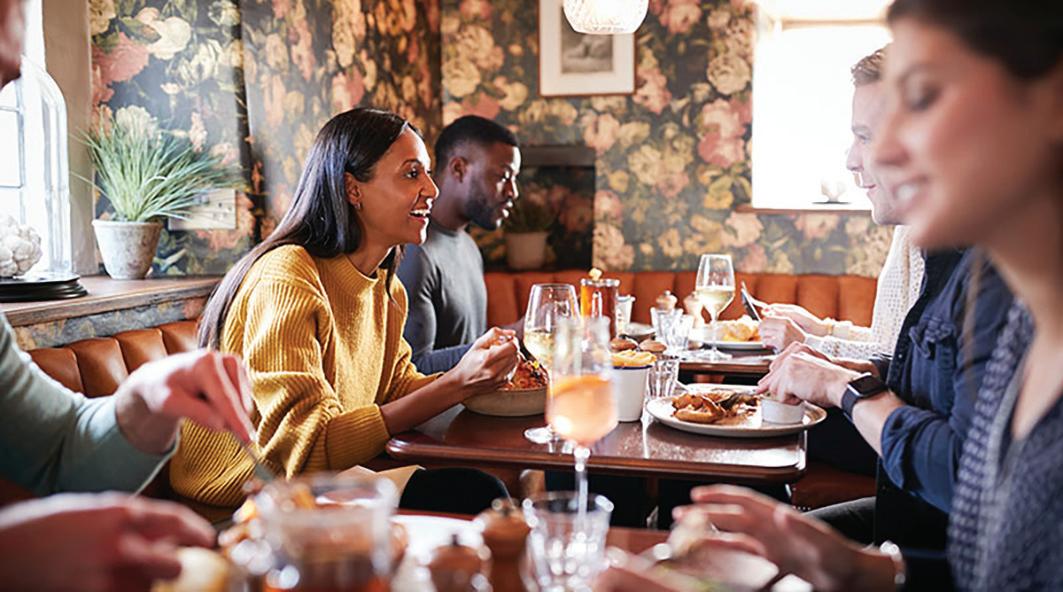
Perhaps surprisingly, the drive towards earlier visits is being driven by younger consumers, with 22% of 18to 34-year-olds going out earlier than they were a year ago (up by 3%). However, there is also a shift for older demographics, with 11% of 35- to 54-year-olds bracket also choosing to go out earlier compared to 2024
(+5%), representing the biggest change across all age groups.
As consumers are tending to go out earlier, the survey shows that technology has an ever-more important role to be convenient for consumers.
Over a quarter of consumers say the ability to book in advance (29%) and pay quickly (28%) via tech could enhance their visit. Another notable benefit is the ability to see how busy a venue is (27%) — particularly appealing for those going out earlier in order to avoid long queues or waiting times.
Tim Chapman, Chief Commercial Officer, Zonal said: “This emerging behavioural trend is having a significant impact on our industry. To meet these changes, operators need to understand the underlying motivators and in doing so they will be better equipped to make the operational changes, experiences and offers needed to give consumers what they want and to make the most of the opportunity.”
Karl Chessell, CGA Business Unit Director – Hospitality Operators and Food, EMEA added: “The movement towards earlier meals and drinks is reshaping the landscape of hospitality. As our GO Technology research shows, traditional daypart boundaries have blurred, and consumers are no longer rooting their occasions in set times of day. This is creating new headaches for some operators, but for those who can flex the offer there are sizeable opportunities too. There’s certain to be more change in timings, and tracking the very latest needs of consumers from morning to night will be crucial.”
By Isabella Mason, solicitor at Taylor Walton Solicitors

A commercial landlord may be able to forfeit a lease (bring the lease to an end) if the tenant breaches terms of the lease for reasons other than non-payment of rent.
DOES THE LANDLORD HAVE A RIGHT TO FORFEIT?
Most commercial leases have an express forfeiture clause which applies if the tenant has breached the express obligations (known as covenants) set out in the lease.
If there is no clause in the lease, they will not have a right to forfeit. They may be able to recover possession through other courses of action, but those are beyond the scope of this article.
WHAT BREACHES CAN THE LANDLORD FORFEIT FOR?
In the case of forfeiture for breaches of the lease, there is a statutory process landlords must follow before forfeiting. The landlord must serve what is known as a Section 146 Notice on the tenant giving them a reasonable period of time to remedy the breach, failing which the landlord can proceed to exercise its right of forfeiture by applying to Court for a possession order. Forfeiture by peaceable re-entry may be considered, but this attracts high risk and is rarely used for tenant breach cases.
Examples of breaches of covenant include:
• Not complying with the user covenant.
• Disrepair.
• Breach of keep open covenant.
• Unlawful alterations or display of signs.
• Illegal assignment or subletting.
• Tenant insolvency.
• Illegal or immoral use.
THE SECTION 146 NOTICE
The Section 146 Notice should contain the following:
• Details of the breach;
• If the breach is capable of remedy a requirement that the tenant do so; and
• If appropriate, a requirement that the tenant to pay monetary compensation for the breach.
It is important to know whether a tenant’s breach is capable of remedy.
If the breach is capable of being remedied, the Section 146 Notice must allow the tenant an opportunity to remedy the breach within a reasonable time. If that is not done, the notice will be invalid. If breaches are left unremedied the landlord can apply to Court for possession.
Remediable breaches include:
• user covenant;
• to insure; repairing covenant;
• unlawful alterations or displaying signs without consent; and
• failure to obtain planning permission.
If a breach is irremediable then no reasonable opportunity to remedy needs to be specified in the Section 146 Notice The landlord can proceed to issue proceedings immediately.
Irremediable breaches include:
• unlawful assignment/subletting; tenant insolvency;
• illegal or immoral use; and
• non-observance of licencing laws.
When a landlord forfeits, the tenant has a right to apply for relief from forfeiture. If successful, the lease will be reinstated by the Court.
In granting relief, the Court will consider various matters including:
• Severity of damage.
Nature and gravity of the breach.
• Breaches beyond the tenant’s control.
• Delay by tenant in seeking relief.
• Ability and willingness not to breach again.
• Conduct of the parties
A tenant should seek relief ASAP after the Section 146 Notice is received.
A landlord may inadvertently waive its right to forfeit if by act or communication that acknowledges the lease as continuing. This may include chasing tenants for rent, sending invoices, or even discussing obligations in the lease with the tenant.
Breaches of lease are either identified as continuing or once-and-forall breaches.
Once-and-for-all breaches lead to the right to forfeit being lost forever if waived by the landlord. This means a landlord needs to wait until a new right to forfeit arises.
Examples of once-and-for-all breaches:
Not to make alterations;
• Illegal assignment/subletting;
• Tenant insolvency.
If dealing with a continuing breach, waiver is less relevant as a new right to forfeit for the breach arises each day.
Examples of continuing breaches:
• Illegal or immoral use;
Breach of user covenant
• Breach of repair covenant.
WRONGFUL FORFEITURE
If a landlord unlawfully carries out forfeiture, it may become liable to the tenant for damages. This may arise, for example if the landlord does not have a right to forfeit, if they have waived their right to forfeit, or the breach is capable of being remedied.
It is therefore important for landlords to seek urgent legal advice if their tenant has breached the lease.
The UK eating out market is forecast to reach a value of £101 billion in 2025, according to Lumina Intelligence’s newly released Eating Out Market Report 2025. This represents a year-on-year growth of +2.6%, led predominantly by high-income households and concentrated in affluent urban areas, particularly London. While this marks a positive trajectory, continued inflationary pressures, tight fiscal policy and rising employer costs are expected to constrain consumer and business expenditure in the near term.
The market is increasingly bifurcated, with growth largely driven by segments such as retail, travel & leisure, and contract catering. Quick service restaurants (QSRs), buoyed by their flexible site formats, tech integration and lower reliance on labour-intensive service, are proving more adaptable to rising costs. In contrast, service-led restaurants and pubs face headwinds from escalating staffing costs and volatile inflation.

Despite the challenging backdrop, operators are recalibrating. The report highlights a wave of portfolio rationalisation and operational streamlining among both established and growth-oriented brands. There is a
notable uptick in data-led expansion, menu innovation, and technological adoption—including AI—as operators seek to futureproof their estates.
These factors are contributing to sustained interest from global investors and private equity, with M&A activity particularly strong in the restaurant and QSR domains.
Consumer behaviour continues to evolve, with value for money cited by 76% as a key driver, closely followed by quality (75%) and health consciousness (44%). Operators are responding with offers that deliver added value through elevated classics, immediate rewards, and premiumised products—trends especially evident in sectors like contract catering, sandwich and bakery chains, and coffee shops.
Looking beyond 2025, the market is projected to grow at a steady +2.4% CAGR, reaching approximately £108.7 billion by 2028. As inflation and economic uncertainty persist, long-term growth will hinge on strategic investments in automation, diversified experiences, and innovative formats that provide consumers with compelling reasons to dine out.
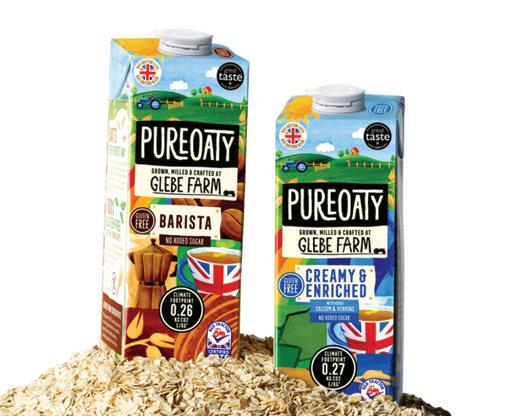

Article by Ella Bond, Senior Employment Solicitor at law firm Harper James

St Austell Brewery’s recent announcement that it has begun a redundancy consultation, driven by the rising cost of wages and business rates, will strike a chord with many hospitality businesses across the South West and beyond. With margins tightening, some organisations are considering the difficult decision of whether to reduce staff hours or let people go entirely. The way redundancies are handled can have a lasting impact not just on your team, but on your reputation and legal position too.
Redundancy can only happen if there’s a genuine business reason, such as a need to reduce costs, close part of the business, or cut down on roles that are no longer needed. Rising operating costs (like staff wages or business rates) may justify this, but you still need to approach the process carefully and fairly.
THE REDUNDANCY PROCESS: STEP BY STEP
1. Planning and preparation
Before speaking to staff, map out:
Why redundancies are necessary
• Which roles might be affected
• How you’ll decide who stays and who goes (this is known as the selection criteria)
You should also think about whether redundancy can be avoided. Could you cut overtime, freeze recruitment, reduce hours, or offer voluntary redundancies?
This is one of the most important parts. Consultation isn’t just a meeting to tell someone they’re at risk. It is a two-way conversation where employees can understand what’s happening, suggest alternatives, and ask questions.
If you’re proposing to make 20 or more people redundant at one location within a 90-day period, there are additional rules about collective consultation, including minimum consultation periods and notifying the government.
But even if you’re only consulting with one or two employees, the process must be meaningful and genuine.
3. Selection and alternatives
If more people are in scope than roles to be cut, you’ll need to use fair and objective criteria to decide who is selected for redundancy. These might include skills, performance, or experience. You must, however, avoid anything that could be discriminatory (such as age or part-time status).
You will also need to explore alternative roles in the business before making any final decisions. Consider any suitable alternatives that become available during the consultation period, even if the employee hasn’t asked for them.
4. Final meeting
Prior to the final redundancy meeting, employees must be informed that if no suitable alternatives are found, their role could be terminated by reason of redundancy. During these meetings, employees also have the legal right to be accompanied by a work colleague or a trade union representative. This ensures that the employee has support and representation, helping to make the process fair and transparent. Employers must inform employees of this right and facilitate their choice of companion.
5. Notice and redundancy pay
Once a decision has been made, affected staff should be given notice and confirmation in writing. Their entitlements may include:
• Statutory or contractual notice
• Redundancy pay (if they’ve been employed for at least two years)
• Pay for any unused holiday and other entitlements
Affected staff should also be offered the right to appeal against the decision to make their role redundant.
INSTEAD?
Some employers may wish to avoid redundancies by reducing staff hours instead, moving a role from full-time to part-time, for example. You can only do this with agreement from the employee, or if your contract allows for it (a clause known as a "variation" or "short-time working" clause). Even then, you should consult with staff and clearly explain the reasons, the impact, and how long the changes will last.
Unilaterally cutting hours or pay without agreement could lead to claims for breach of contract or constructive dismissal.
BEST PRACTICE FOR THE HOSPITALITY SECTOR
In the fast-paced hospitality sector, where many employees are loyal, long-serving, work closely together, and brand reputation is paramount, handling redundancies with care is crucial. Employers should:
• Communicate early and openly, even if decisions aren’t final yet
• Treat people with dignity and respect throughout
• Keep clear written records of the process
• Seek advice early if you’re unsure or if things get complicated
A FINAL WORD
Redundancies are never easy, but doing it the right way makes a huge difference. For employers facing financial pressure, it's worth investing a little time now to make sure your approach is legally sound and sensitive to your workforce. Mistakes can be costly, not just in tribunals, but in staff morale, customer experience and brand reputation.
If you’re considering redundancies or changes to working hours, getting early advice from employment law specialists can help you find the right route forward, both for your business and your team.
The fundraising total for Pedalling To Pubs 2025 has exceeded a record-breaking total of £100k, days after hospitality industry leaders crossed the finish line of their 220km sponsored bike ride across the Lake District.
From 5 – 7 June, the 60 intrepid riders cycled from Penrith to Cockermouth to Carlise and back to raise vital funds for leading hospitality charities the LTC (Licensed Trade Charity) and Only A Pavement Away – with real grit and determination shown by each and every rider
With the fundraising total now standing at over £100k, Pedalling To Pubs 2025 has surpassed last year’s record of £85k. This year’s headline sponsor was Polaris Elements, with the ride also supported by Thatchers Cider, Lucky Saint, and partners BII. The funds raised are vital for allowing both charities to support people entering, currently employed in, or leaving the hospitality sector.

Steve Alton, Lead Rider and CEO at the BII, said: “This year’s ride was very challenging with steep, rolling hills and torrential rain, but seeing the fundraising total exceed a phenomenal £100k makes it all worth it! Thank you to everyone who took part and to everyone who has
donated – your incredible support allows these two charities to continue helping people in the hospitality industry who need it most. It’s not too late to contribute, so if you are able, we would be beyond grateful for any further donations.”
Chris Welham, CEO of the LTC, said: “Completing this year’s Pedalling To Pubs felt indescribable, but seeing the fundraising total surpass £100k is on another level. On behalf of the LTC, I want to thank everyone who has supported this year’s ride. The funds enable us to continue providing vital health and wellbeing support, practical advice, and financial assistance for people in the licensed hospitality community.”
Greg Mangham, Founder and voluntary CEO of Only A Pavement Away, said: “We’re so incredibly proud of each and every one of the inspirational industry leaders who crossed the finish line in the Lake District, and want to thank everyone who contributed to this spectacular fundraising total of over £100k. The funds will allow us to continue building brighter futures, giving those wanting to rebuild their lives a pathway into long-term, stable employment within hospitality.”
CLEAN Linen & Workwear are one of the UK's most trusted laundry companies. They supply tailored workwear solutions provided by real people. Their comprehensive laundry network means they can service customers throughout England and Wales, providing chefswear, workwear and linen rental services. Whether you operate from a single-site hotel, pub or restaurant or have multiple locations, CLEAN can tailor a workwear rental solution to suit your business requirements. They offer various uniform options to support the entire kitchen brigade, from Executive Chefs to Kitchen Porters. With their workwear rental service, you can say goodbye to the hassle of purchasing, storing, and maintaining chef and kitchen uniforms. Instead, enjoy the convenience of a hassle-free rental system that provides freshly laundered garments whenever your team need them. By renting with CLEAN, you can avoid upfront purchase costs, spread the payments over your contract, and
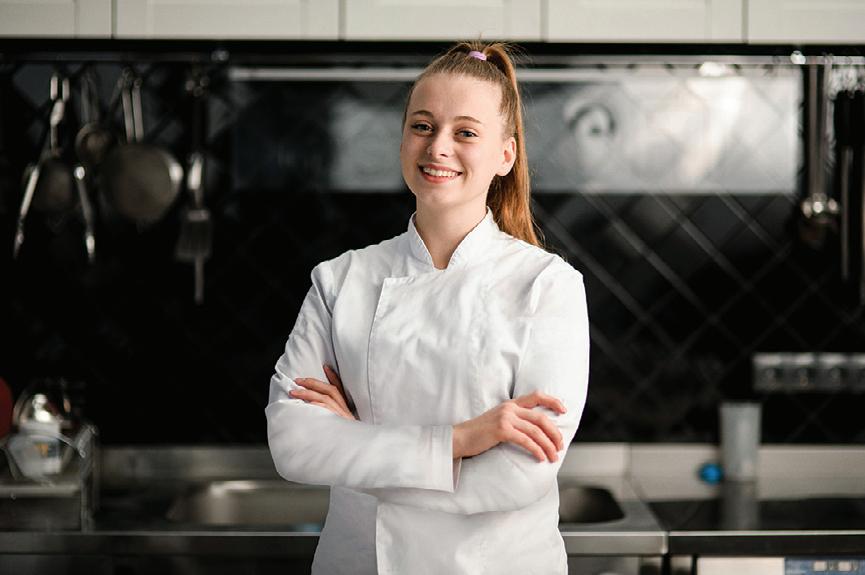
ensure quality and care with every wash. Delivery is free, and there are no hidden charges; contracts even include repairs. Each item of clothing can be branded and tailored to the wearer with logos and embroidery. Their managed service prevents issues compiling when supplying your team with work clothes; a convenient locker valet service helps distribute and store uniforms, and they tackle minor repairs early to extend the service life of a uniform. Ultimately, this avoids costly replacements wherever possible as it reduces uniform losses, and uniforms only need replacing when a repair is not safe or cost-effective. With CLEAN's workwear rental and laundry service, business owners can focus on what matters most — running their business — while CLEAN takes care of the rest.
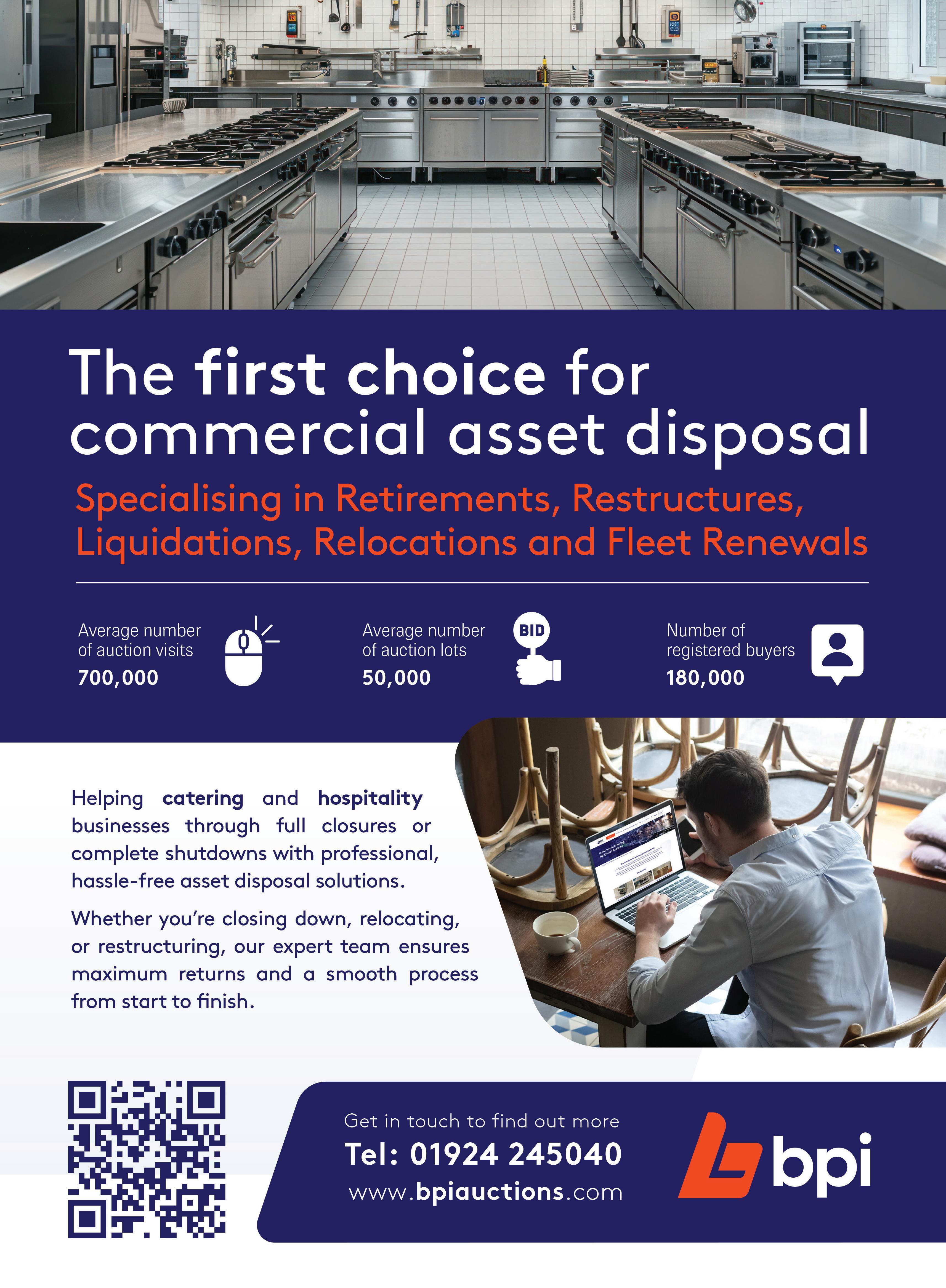
By Michelle Noel, Strategy Director and Founder at

Michelle Noel is founder and strategy director at London branding and design agency, Studio Noel. She empowers established businesses, global enterprises, and charitable organisations to surpass their goals through strategic positioning and unforgettable branding. She excels at transforming brands to reflect their vision and future aspirations. Her work helps clients outshine competitors, attract high-value opportunities, and drive meaningful growth.
With over 40 successful rebrands and design projects delivered through proven processes and a highly skilled creative team, Michelle is dedicated to building lasting partnerships and delivering exceptional results. She has collaborated with esteemed clients on design/rebrand projects such as Bill's, Rotunda, Swan (Shakespeare's Globe Theatre), Fosters and Rose Court Events, helping them engage stakeholders and achieve their goals.
Customer retention and brand loyalty is crucial in the hospitality sector, particularly at a time when competition is very high, and consumers are cautious about spending their disposable income.
Getting customers invested in your brand and service is key to generating repeat business and also for word-of-mouth marketing. Delivering an exceptional experience that people can't get enough of and want to recommend to their peers is a powerful sales tool.
Positive reviews play a huge part in getting new customers through the door, especially in the hospitality sector. Equally, delivering a positive experience is key to people returning. However, this goes beyond in-person service; how easy is it for a guest to book a room online, for example? Is the booking process convoluted and frustrating? Is your website accessible, with up to 24% of the UK population that have a disability? Are customers bombarded with too many marketing emails after making a booking? Basic things like ensuring the pricing on digital menus are up to date with those on-premises helps to prevent unwanted friction.
Brand experience covers any touch point a customer, or potential customer, has with your brand, not just inperson. So evaluating interactions customers have before and after their visit is just as important.
‘Values’ can be somewhat of a marketing buzzword, as brands compete for their target market's attention. If done meaningfully and truthfully, they can be incredibly powerful. However, making false claims without action can be more harmful than making no statement at all.
Before making a political/social affairs statement or sustainability claim, check that your entire business's operations echo this sentiment. Values are not just about words, they are about actions. Customers are savvier than ever, expect any false promises to be called out publicly.
In an era of low consumer trust, particularly towards large corporations, people prefer to buy from brands with interesting, heartfelt stories and relatable people. A founder overcoming adversity to pursue a passion project is always a story worth telling, but it doesn't just have to be about those at the top. A barista who turned their life around after becoming homeless is just as powerful and heartwarming. Speak to people within the business to uncover interesting and impactful stories.
Furthermore, telling customer stories (with their permission, of course) can be even more compelling. Perhaps a couple who have visited your hotel for their anniversary for the past 25 years are celebrating a milestone anniversary this year and you pull out all the stops for them. That's the kind of heartwarming story people love to read and also demonstrates a caring and empathetic brand.
Mass marketing messages and communications rarely make an impact when brands from all different sectors are doing the same. So how does a brand stand out? Personalising communication to make the person feel like they have been seen can be really effective.
For instance, rather than offering a discount off a bottle of wine with a meal on their birthday, why discount their favourite drink, based on their purchase history? It's little touches like this that helps a brand cut through the noise.
Ultimately, brand loyalty centres around putting the customer first at all touch points, being transparent and vulnerable and engaging in meaningful, personalised communication rather than generic engagement.
Hospitality industry leaders are celebrating a monumental achievement as the inaugural cycle challenge under the newly rebranded Hospitality Rides initiative has successfully wrapped, impressively raising over £400,000. The epic 400km sponsored cycle across Taiwan saw 29 dedicated industry professionals push their limits, demonstrating an incredible commitment to supporting vital hospitality charities.
Hospitality Rides, an annual international sponsored bike ride, was rebranded in 2024 from “Pedalling For Pubs.” It is committed to raising crucial funds for the Licensed Trade Charity (LTC) and Only A Pavement Away, two leading organizations dedicated to supporting the hospitality sector.
Katy Moses, Managing Director of leading research consultancy KAM and founder of Hospitality Rides, said: “What an absolutely phenomenal achievement by everyone involved, Taiwan proved to be the hardest ride to date, so I have so much respect for everyone who was a part of the journey. To have raised over £400,000 is truly inspiring and a testament to the incredible generosity and dedication within our industry. These vital funds will directly support the invaluable work of the LTC and Only A Pavement Away, making a real difference to countless lives in hospi-

tality.”
Last month’s challenging ride, which covered almost the entire length of Taiwan, was made possible by the tireless efforts of the 29 industry professionals. Alongside KAM, key supporting partners and sponsors included Avani Solutions, Britvic, DOJO, Fleet Street, Lucky Saint, Punch Pubs and Natural Selection Design.
Building on this success, organisers have announced that the next fundraising challenge will take place in Spring 2026, with cyclists set to embark on an epic journey across Cuba. Interested participants are encouraged to contact the LTC for more information.
Alongside its sister event, Pedalling 2 Pubs, Hospitality Rides has firmly established itself as a flagship fundraising event for the LTC and Only A Pavement Away. Combined, the two events have exceeded £1.5 million in fundraising since their inception, providing critical support to individuals entering, currently employed in, or transitioning out of the hospitality sector.
With over 28 years of experience supplying branded uniforms to businesses across the UK, Kylemark has built a reputation for quality, reliability, and exceptional service. From hospitality and corporate sectors to industrial and leisurewear, Kylemark delivers more than just clothing — we provide confidence, consistency, and style to every member of your team.
At the heart of our operation is our commitment to in-house branding. Unlike many suppliers, Kylemark controls the full decoration process — embroidery, print, and alterations — from our own factory. This means better quality control, faster turnaround times, and a more responsive service tailored to each client’s needs.
One of our proudest achievements is the creation of the Coast & County apron range, manufactured right here in the UK. Designed for the demands of the hospitality sector, these aprons offer a perfect blend of durability, comfort, and visual appeal. They’re

a favourite among chefs and front-of-house teams, with clients including Tom Kerridge, Brasserie Blanc, Restaurant Associates, and more.
Kylemark doesn’t believe in a one-size-fits-all approach. We work with businesses of all sizes — from independent traders to multi-site national brands — offering bespoke solutions, product consultation, high-resolution visuals, and even personalised ordering portals. Whether you need a full uniform rollout or a single embroidered jacket, our experienced team makes the process smooth and stress-free.
We don’t just help your team look the part — we make sure they feel it too.
Tel: 01292 618344
Email: sales@kylemark.co.uk www.kylemark.co.uk
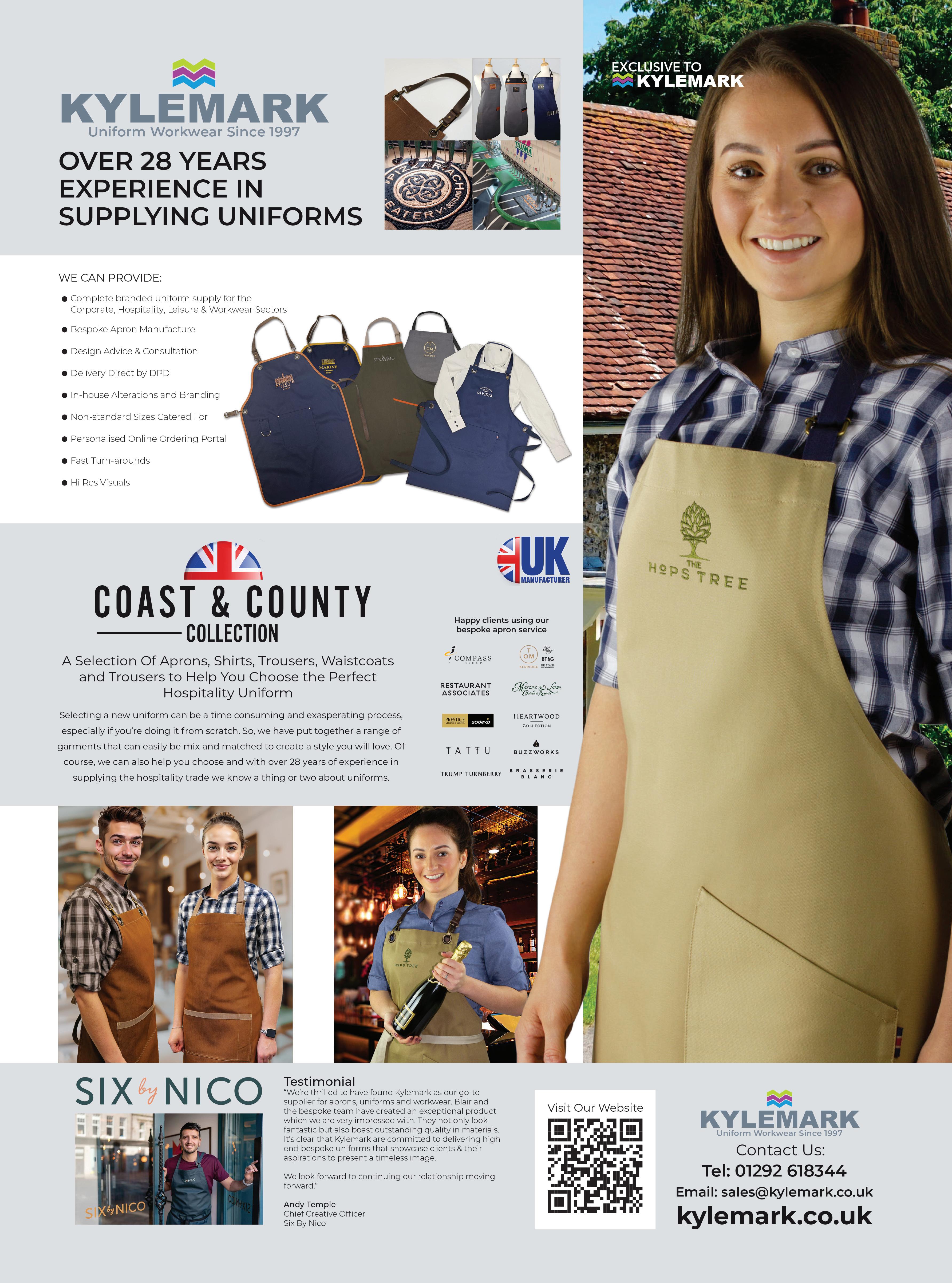
By Katherine Morgan, Senior Associate in the Real Estate team at Thomson Snell & Passmore

The Terrorism (Protection of Premises) Act 2025 (the “Act”), also known as Martyn’s Law, received Royal Assent on 3 April with the intention of strengthening the security of public premises and events in the wake of the tragic Manchester Arena terrorist attack in 2017.
The Government has published a ‘Martyn’s Law Factsheet’ which can be found here: https://homeofficemedia.blog.gov.uk/2025/04/03/martyns-law-factsheet/
The timescale for implementation of the Act is not fixed, but the Government will allow an implementation period of at least 24 months to firstly establish a newly formed Security Industry Authority (“SIA”) function which will enforce the regime provided for under the Act. The SIA will also act in an advisory and support role to assist those responsible for qualifying premises under the Act to understand and enact the new obligations.
Types of venue have been split into two tiers based on the volume of people they could reasonably expect to hold at one time including staff. These are standard (200-799 people), and enhanced (800 people and above).
A ‘responsible person’ is a person or entity with control over a premises. There are a number of scenarios where it may be difficult to specify who the responsible person is. For example, with an industrial estate or a shopping centre, would the person with responsibility be the property owner, the individual landlords or the tenants? In these scenarios it is anticipated that the parties will need to work together to ensure the required precautions are introduced. However, the overall responsibility appears to lie with whoever is in actual control of the property.
There are many situations where it would not be so clear cut as to who has the ultimate responsibility under the Act. This could in turn lead to disputes if the SIA impose sanctions and it is in dispute as to who was the responsible person at the time of the incident.
CRITERIA
All of the below factors must be satisfied:
1.There is at least 1 building (or premises is within a building);
2. The premises are wholly or mainly used for one or more of the uses specified at Schedule 1 to the Act, which include shops, restaurants and venues used for events/activities;
3.It is reasonable to expect that at least 200 individuals may be present at least occasionally; and
4.The premises are not excluded under Schedule 2 to the Act (for example parks).
WHAT YOU NEED TO DO AS THE RESPONSIBLE PERSON
1.Notify the SIA of the premises; and
2.Have in place, so far as reasonably practicable, appropriate public protection procedures to be followed by those working at the premises if an act of terrorism occurs.
Each premises will have different requirements to take into consideration when it comes to introducing safety measures.
All of the below factors must be satisfied:
1.The event will take place at premises within section 3(1)(a) of the Act which includes land without buildings;
2.The relevant premises are accessible to members of the public for the purpose of the event;
3.It is reasonable to expect there will be at least 800 individuals present for the event at once at some point;
4.There will be measures to check entry conditions are met, such as a ticket checks; and
5.The event is not excluded under Schedule 2 of the Act.
WHAT YOU NEED TO DO AS RESPONSIBLE PERSON
1.Complete the standard duty requirements listed above;
2.So far as reasonably practicable, introduce appropriate protection measures to reduce the vulnerability of the premises/event and the risk of physical harm if an attack occurs;
3.Document the public protection procedures and measures in place or proposed to be in place and provide this to the SIA. Include an assessment of how the procedures and measures reduce vulnerability and/or risk of harm; and 4.Where the responsible person is not an individual, they must designate a senior individual with responsibility for ensuring compliance.
Whilst the Government has stated that it wishes to strike a balance between public safety and avoiding undue burdens on an already struggling hospitality industry, the Act will have implications for many types of businesses whether these are hotels, stately homes, restaurants or large commercial premises used for hosting events.
If your business premises or land is or may be accessible to members of the public for the purposes of an event and it is reasonable to expect that at least 200 individuals may be present at least occasionally, you will need to consider your duties under the Act.
If you are unsure as to whether your premises might be captured by the Act, we recommend seeking early specialist advice, as the SIA will have the ability to issue compliance notices, financial penalties and we understand there will also be criminal sanctions, although the specific details are not yet known. There may be contractual or other civil liability risks to consider, too.
Importantly, the Government has made clear that the terrorist attacks referred to under the Act do not need to take place on the premises, and precautions must also be taken in consideration of attacks which might happen on nearby land.
Government guidance is anticipated to be published by the Home Office to assist with the understanding the requirements.
Award-winning Heartwood Inns opened The White Hart in Lymington, its thirtieth pub in the Heartwood estate.
In a ceremony officiated by the Mayor of Lymington & Pennington, Colm McCarthy, the pub was officially opened to welcome the Lymington & Pennington community through its doors. The Mayor was joined by members of Lymington Chamber of Commerce, the RNLI and Go New Forest to celebrate the opening of the pub.
A listed building, The White Hart has undergone a sympathetic refurbishment including the addition of an extension to the rear to create over 150 internal dining seats together with an additional 50 seats outside. To the front, the beamed bar boasts a number of fireplaces together with semi-private spaces for private dining whilst the light, airy dining room provides a space for larger gatherings.
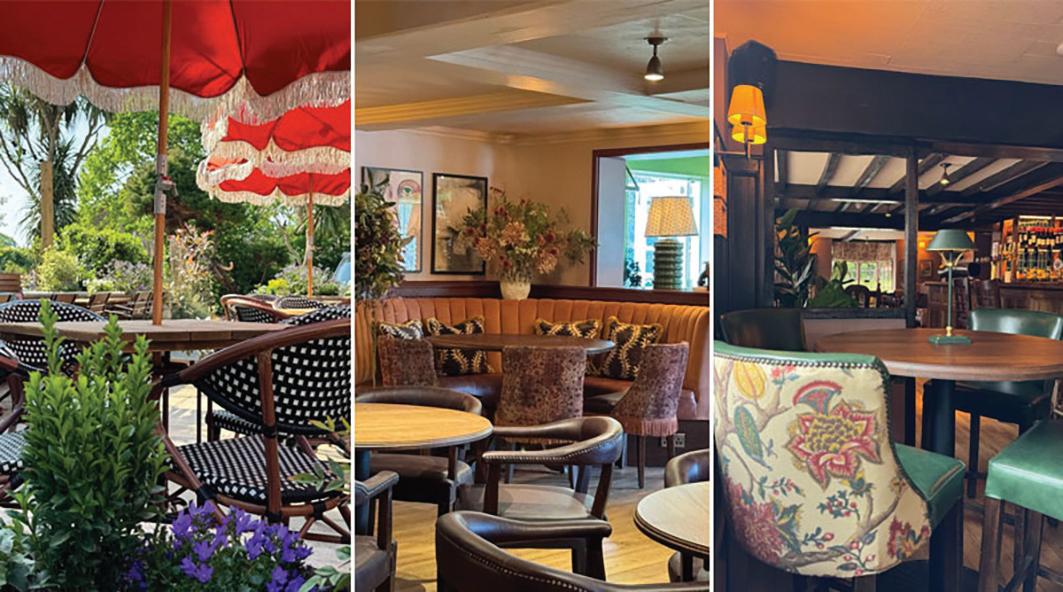
Sir Woofchester’s has the UK’s largest and most specialised product range for dog-friendly hospitality businesses, including several personalised products.
For your BAR OR RESTAURANT
Our Dog Menu features a range of Treat Pots, Dinner Bowls, Dog Drinks and Snacks, displayed with eye-catching point of sale
For your BEDROOMS & ACCOMMODATION
Choose between:
-“All day breakfast” snack bar: a delicious innovative treat for dogs on-the-go!
-“Sleepy Bones” treat pot: relaxing bedtime dog treats.
-“Dog Welcome Pack” PERSONALISED: an nicely presented pack containing poo bags, a ball toy and a pot of Sleepy Bones. (Note: the container also serves as a temporary waterbowl!)
YOUR COMPLETE SOLUTION
Water bowls, waste bags, accessories, top tips & everything else you need to be more dog-friendly.
To ensure the highest quality products, we hold a DEFRA registration, a GB Pet Food Manufacturers registration and much of our range is BRC or SALSA certified.
We look forward to working with you.
David & the Sir Woofchester’s team
Under the leadership of General Manager Pete Hider and Head Chef Amaresh Nandan, guests will enjoy a seasonally changing, sustainably sourced menu in line with Heartwood’s three star rating from the Sustainable Restaurant Association, the highest rating possible. A carefully curated drinks list, can also be enjoyed by guests. Over the coming weeks, the team have put together a programme of activities to celebrate the opening of the pub including live music on the Bank Holiday weekend, face painting and a petting zoo in the garden for children to enjoy.
Richard Ferrier, CEO of Heartwood Collection, said: “We are very excited to have been able to restore this much-loved pub back to the heart of the community. It is a beautiful building with so much history and Lymington is a wonderful town that we are delighted to have become a part of. I wish Pete, Amaresh and the team the very best of luck on opening this beautiful pub.”
You may also wish to consider the following benefits of working with Sir Woofchester’s, to help elevate your wider business:
• Increased average customer spend
• Increase repeat visits
• Enhances staff engagement & enjoyment

• Link to other initiatives – charityfundraisers, online competitions
• Great social media content & word of mouth marketing
• Contributes towards improved reviews
• Fully compliant with legislation etc
WHY DOG-FRIENDLY?
The number of UK dog owners has increased by over 25% since 2020
Many of these are new ‘first time dog owners’ (including pre-family millennials)
Dog owners like to treat their canine like one of the familywhen they visit your establishment
The dogfriendly trend in hotels & tourism etc has been increasing for over a decade!
The pandemic has seen a behaviour change, with more dog owners choosing the UK for their short breaks or annual holidays
The cost of boarding kennels & pet-sitting has risen, so your customers now increasingly want to bring their dog with them!
We see ever-increasing dog-friendly requirements with accommodation providers, food & beverage outlets, as well as tourist attractions.
See the advert on the facing page for details.
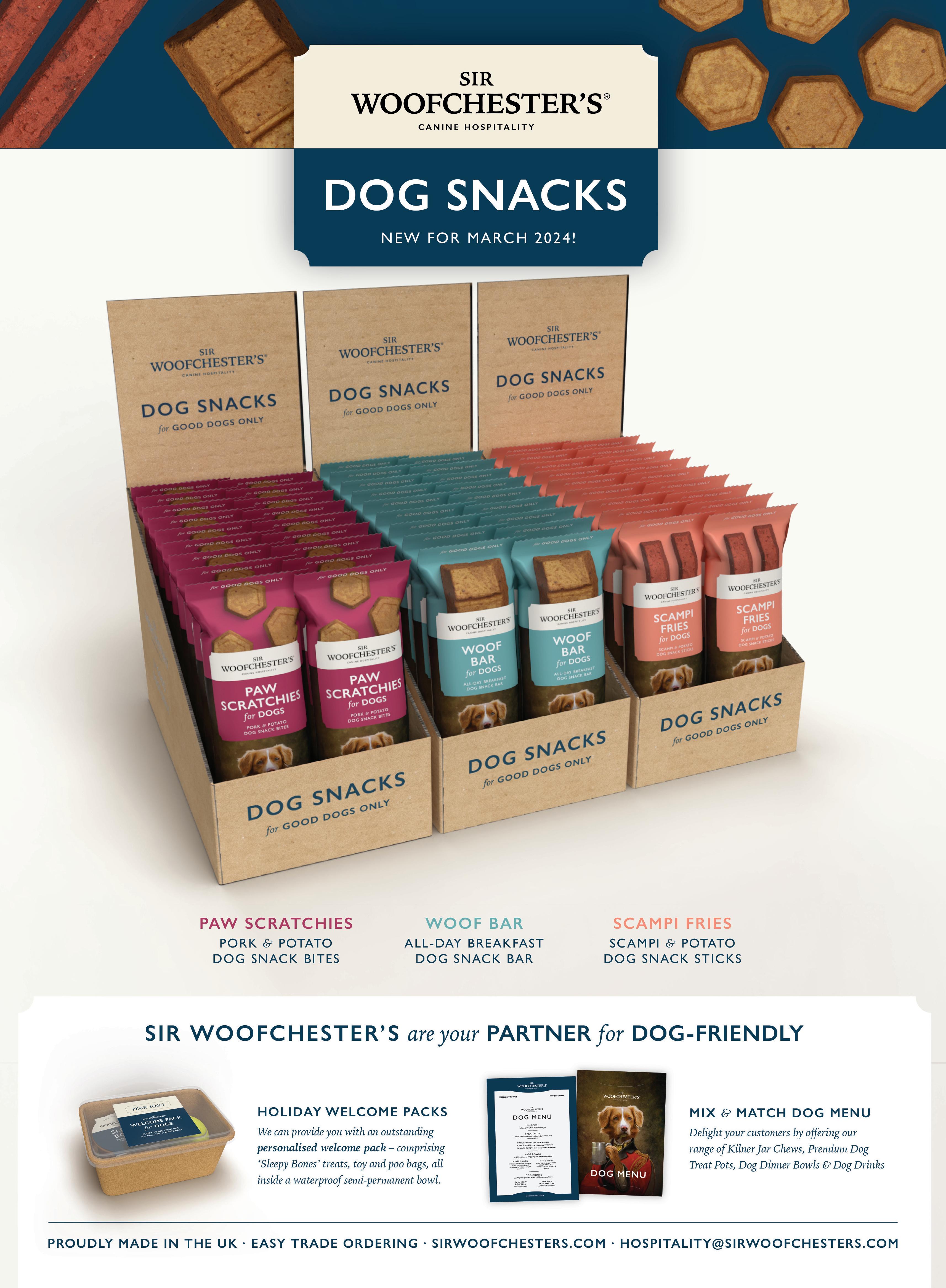

A lack of visible role models in the workplace – particularly in customer-facing roles – is a major barrier to seeking employment for adults with learning disabilities such as Down’s Syndrome, Autism and Aspergers, new research has revealed.
In the UK, there are 1.5 million people with learning disabilities, but only 5% are currently employed.
Hilton’s survey of more than 500 people with learning disabilities and their carers* found that 79% believe businesses should do more to promote job opportunities and the benefits of inclusive hiring.
Doing so could have a significant impact on employment levels among those with learning disabilities, as three quarters (74%) would feel more confident applying for roles if they saw more people with similar disabilities in the workforce.
Despite this, just 16% of respondents who are in the workforce said they have a role model with a similar condition to connect with and learn from.
The study, released to mark Learning Disability Week (16th – 22nd June), highlights the importance of hiring, supporting and celebrating employees with learning disabilities, particularly in customer facing service roles across sectors such as hospitality and retail.
The findings underline the powerful ripple effect role models can have – not only on jobseekers, but their carers too. Yet such moments of visibility remain rare: only a quarter (25%) of carers say they have ever been served by someone with a learning disability. When they have, the impact is clear – 70% said it motivated them to help their dependent find fulfilling work, and three quarters (75%) said it made them realise the person
they care for could be a role model to others. This view is shared by the wider public. Hilton also undertook polling among more than 2,000 consumers, which found widespread support for greater inclusion of people with a learning disability in customer facing roles.
85% said that having more people with learning disabilities in these positions would inspire others to apply, while nine in 10 (93%) said it was important to see staff from all backgrounds in hospitality roles. Three quarters (75%) said there weren’t enough people with learning disabilities in such jobs.

Stephen Cassidy, senior vice president, UK & Ireland, Hilton, said: “Representation matters – seeing people like yourself succeed at work builds confidence and opens doors to career opportunity. Our team members with learning disabilities contribute across a wide range of roles, from front-of-house positions like reception and concierge to behind-the-scenes work in kitchens, housekeeping, and revenue management. They bring unique strengths and a strong commitment that enrich our culture and elevate the guest experience. By providing the right support and fostering an inclusive environment where everyone feels valued, we empower individuals to reach their full potential and demonstrate that inclusion is a powerful driver of success in hospitality.”
This year marks the 10th anniversary of Hilton’s partnership with Aurora Foxes, a hospitality college and training hotel in Minehead that supports young people with learning disabilities. Over the past decade, the collaboration has provided 89 work placements, with 15 former students currently employed in roles with Hilton. A long-standing partnership with the Down’s Syndrome Association (DSA) has also enabled 52 work placements, with almost 40 team members currently working at Hilton through the DSA’s WorkFit programme.
Hydes Brewery has announced a major new appointment and a significant investment in one of its oldest pubs, The Old Plough in Ashton on Mersey, as part of its ongoing transformation of community venues across the North West.
Niamh Kenny has been named as new general manager of the popular Sale pub, following a £550,000 refurbishment that is set to enhance its offering to both regulars and new visitors. Niamh, who brings 14 years of hospitality industry experience, previously served as deputy manager at Hydes’ flagship Manchester city centre venue, The Abel Heywood.
Originally acquired by Hydes in 1911, The Old Plough is currently undergoing a full interior refurbishment that includes a redesigned bar area, new seating, local-themed decor, enhanced beer garden and fresh external signage, part of a multi-million pound investment programme by the family-owned brewery and pub retailer.
Niamh, who joined The Old Plough team last year, has already made a notable impact, leading community initiatives and fundraising efforts for local causes such as St Anne’s Hospice. She also participated in the recent Great Manchester Run with colleagues from Hydes, further strengthening ties with the local community.
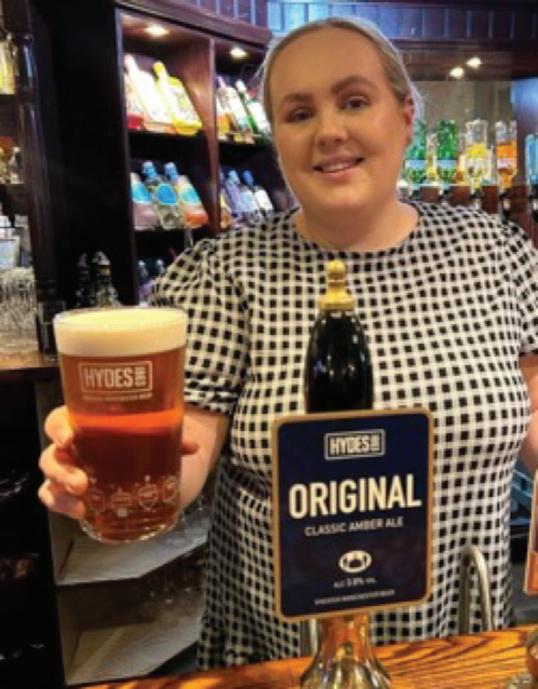
Niamh said: “This is a significant moment for The Old Plough. We’re not just refreshing the look and feel of the pub, we’re investing in its future at the heart of the Ashton on Mersey community. I’m incredibly excited to take on this new role and to build on the fantastic culture and success we already have here.”
Hydes Managing Director Adam Mayers, praised the appointment, saying: “Niamh is a driven and passionate hospitality leader who embodies everything Hydes stands for, exceptional service, community spirit, and forward-thinking leadership. She’s the ideal person to take The Old Plough to new heights.”
The refurbishment comes as Hydes continues a major modernisation drive across its 40+ pub estate in the North West and North Wales.
Having invested over £10 million since 2022, the company plans to continue upgrading both its venues and leadership teams into 2025 and beyond.
Added Adam Mayers: “Pubs like The Old Plough are the heartbeat of local communities. By investing in both our venues and our people, we’re ensuring they remain vibrant, welcoming spaces for generations to come.”
Hoteliers were hit with a double whammy in April, as they faced a rise in employment costs, along with price pressures on room rates, leading to a decline in profits, according to the RSM Hotels Tracker.
The data, which is compiled and produced by Hotstats and analysed by RSM UK, shows UK hotel payroll (as a percentage of revenue) increased from 31.6% to 33.3% in April year-on-year, and from 29.5% to 31.4% in London – likely to be a combination of the rise in employers’ National Insurance contributions and National Minimum Wage.
Average daily rates (ADR) of occupied rooms in the UK fell from £138.29 to £137.54 in April year-on-year and from £198.98 to £196.88 in London. However, UK occupancy ticked up from 75.1% to 77.8% in the same period and from 78.1% to 80% in London.
Increased demand meant revenue per available room (RevPAR) rose 3% year-on-year to £106.98 in the UK and by 1% to £157.45 in London. But that wasn’t enough to offset the increase in costs, with gross operating profits down from 31.8% to 30.1% in April in the UK and from 37% to 35% in London.
Chris Tate, partner and head of hotels at RSM UK, comments:
“The hotel sector was hit with a double whammy in April as they battled with a rise in employment costs combined with deflationary pressure on room rates. In fact, accommodation services inflation fell 1.2% yearon-year in April as hoteliers continue to find it challenging to pass on rising costs to price-sensitive consumers. As a result, they are working harder to sell more rooms and passing on costs this way, rather than charging higher rates.
“Encouragingly, consumers still want to get away, with the late Easter and sunny weather
and mitigating some of the cost pressures in April. While the
RevPAR, the bottom line still took a hit, but it could have been much worse. The challenge is now sustaining this momentum, particularly against the challenging economic and geopolitical backdrop.
“Although consumer confidence took a knock in April, this didn’t put consumers off from booking their holidays, so the improvement in confidence in May and continued warm weather should bode well for the UK’s hotel industry. Summer trade in the UK relies heavily on overseas visitors, so the hope is that the continued uncertainty doesn’t derail demand for UK hotels.”
Thomas Pugh, economist at RSM UK, added: “The RSM Hotels Tracker backs up two trends that we have seen elsewhere in the economy. First, the disruption from US tariffs and subsequent surge in uncertainty last month doesn’t seem to have stopped consumers from spending money. Indeed, we saw stronger retail sales, hotel bookings and pub spending in April. This is probably a reflection of UK households’ real incomes rising strongly over the past few years and, ultimately, that is a bigger driver of UK consumer spending than US trade tariffs.
“Second, even though headline CPI inflation jumped to 3.5% in April, this was almost entirely down to utility, tax rises and the late Easter. We saw little evidence of firms passing on the increase in employment taxes and that is backed up by the data for hotels.
“Admittedly, the economy will weaken in Q2 and is now facing a series of headwinds, including tariffs, uncertainty, higher taxes and slower global growth, which it wasn’t facing at the start of the year. That means growth will probably come in around the same as last year at a little over 1%. But the signs suggest that consumers are getting a bit more comfortable with opening their wallets, which will be a strong tailwind to offset all those headwinds.”
Retailers in London’s West End are expected to be hardest hit as the largest properties occupied by the RHL (retail ,hospitality and leisure) sector faces a £600 million surge in business rates next April according to business rates experts at Colliers. Colliers believes this illustrates how the Government’s policy to “Save the high street” through its new business rates multiplier reforms are likely to misfire.
The Non-Domestic Rates Bill, now passed in Parliament, paves the way for the business rates multiplier to be lowered from Apil 2026 for smaller retail, hospitality and leisure properties.
However, this tax cut is to be funded by increasing the multiplier (and hence business rates) on the larger commercial properties (those with a rateable value (RV) of above £500,000) in all sectors, including the larger high street retailers and hospitality businesses. This higher multiplier can be up to 10p higher than the new standard multiplier- an effective extra 20% new tax on the larger businesses.
Colliers and other critics have consistently said the legislation has been poorly thought through and was rushed through Parliament. It has been pitched by the government as a way of helping the high street – by shifting the tax burden away from high street retailers to make the online giants pay more in tax.
However, as John Webber head of Business Rates at Colliers points out, the new legislation will actually create more damage – by impacting the larger stores and supermarkets on the high street, which often act as anchor tenants for other stores and encourage footfall in UK town centres.
Colliers has estimated that larger food stores, as well as larger shops and retail warehouses will see rises of over £400 million per annum in terms of their rates bills. The grocery sector will also be impactedaround 90% of the property portfolios of Tesco, Asda and Sainsbury’s have RVs above £500,000. And the larger suppliers to food stores- manufacturing, factories, warehouses including the larger bakeries and dairies will all see millions of pounds in extra costs.
Colliers has examined the impact the new legislation will have on a number of our city centres across the country, by examining the number of retail/leisure/hospitality businesses that either have an RV of over £500,000 or are likely to have by next April (following the 2026
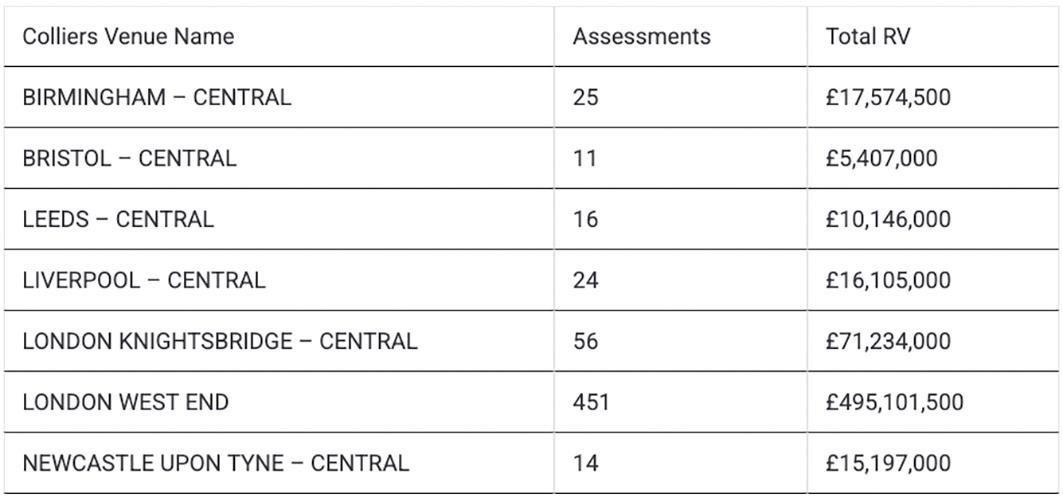
As the table shows the West End of London will be the hardest hit by the changes with a massive 451 RHL properties who will face the higher multiplier (and therefore tax.). But even cities with smaller numbers of large RHL properties will be affected, since they represent the larger anchor stores and supermarkets or leisure attractions that bring the life blood to many of these centres.
Looking more closely at retail alone, new figures from Colliers show there are 335 retail properties in the West End, including Knightsbridge that are likely to exceed the £500,000 RV threshold next year. Colliers estimate rateable values in this area could increase about 30 per cent following the 2026 Revaluation.
With the high multiplier expected to be around 55p in the pound, annual liabilities for these properties are projected to jump from £212 million to £274 million a year. This equates to an average increase of £182,727 per property- a massive leap. Occupiers of multiple properties in the area will need to brace themselves.. No wonder so many retailers and hospitality businesses have been raising their voices in alarm.
The outlook looks even more difficult for the sector, given it is facing the 2026 Business rates Revaluation, which will come into effect in April 2026. The draft list will be published at a similar time to the announcement of the 2026/27 multipliers.
The current rating list (2023) was based on rental levels as of April
2021 which were affected by Covid, but given the new list is based on rental levels as at April 2024, well after Covid, we expect rents to have increased in this period. This will impact rateable values. Colliers estimate RV rises overall for the retail sector to be around 20-25%.
As John Webber comments, “This whole new policy is nuts. At a time whilst our high street is suffering with the cutting of reliefs for the small stores and the hike in employment costs with the increase in employer national insurance contributions and the national minimum wage, why does the government think it is sensible to hit the bigger retail, hospitality and leisure players- the ones that provide anchor tenants for the high street, attract footfall and create the jobs- by an even more punitive business rates taxes?”

“Whilst we won’t know exactly what the new multipliers will be until the Autumn Budget, nor the actual rateable values of the properties in the new list until draft list is published at a similar time, there is no doubt there will be substantive rises for the sector. Businesses are therefore preparing for the worst and it would not be surprising if property expansion plans or hiring plans are put on hold.”
“And even the smaller RHL businesses, who will be the beneficiaries of the lower multipliers, may find this is a hollow victory. This year, these stores faced cuts in business rate reliefs, which will be entirely removed next year. They too may well see steep rises in their rateable values in the new list, which will counter any benefits from the lower multiplier.”
He concludes, “ What we had hoped to see from Labour’s business rates policy was a lower multiplier across the board, rebasing it to a 35p in the £ tax, something which all businesses could afford and which would stimulate growth and investment; and to simplify an already overcomplicated system. Instead, we will have a system that is even more complicated and looks likely to damage rather than save the high street, stifling investment and growth.”
The new Heineken Beer Report 2025: Doubling Growth in the Beer Market shows a category that continues to outpace the wider drinks market, growing faster than cider, wine, spirits and soft drinks in the UK OnTrade and, with a year-on-year value growth of 3%, beer is now worth £13.8 billion to pubs, bars and restaurants.
In terms of subcategories the bigger winners have been Classic Bitter Ale and Stout which has increased its value versus last year by 15% and No and Low which continues grow in the On-Trade, posting an increase of 46% in value.
World Lager continues to be the UK’s most popular pint making up over a quarter (29%) of the total market and is still seeing growth year on year.
In addition to this positive performance, the report identifies significant head room for growth. With the way consumers use the On-Trade and consume beer evolving – fewer regular after work sessions or repeat visits, a move to moderation and a continuing shift to premiumisation – pubs, bars, and restaurants need to adapt. The Heineken Beer Report 2025 outlines a road map to help operators do just that and tap into a potential
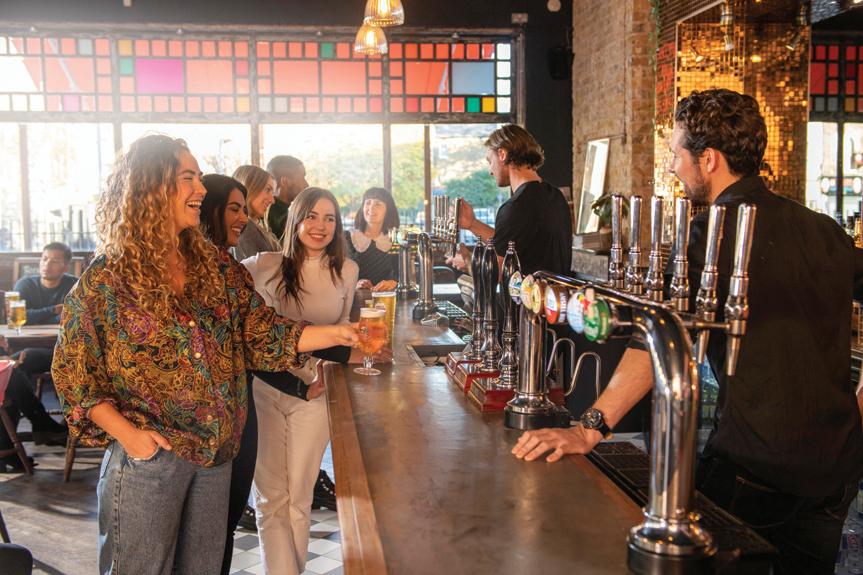
£1 billion growth in the market over the next few years.
Will Rice, On-trade Director from HEINEKEN UK says: “Beer is the biggest alcoholic drinks category in the UK On-Trade and we are really excited about its future.”
“The Heineken Beer Report 2025 reemphasises the importance of the category to the On-Trade with so many consumers viewing beer as critical part of the pub going experience. That said, there is clear evolution to consumer behaviour when it comes to beer consumption. Our hope with this report is that it helps operators to understand these changing consumer trends and equips them to capture the growth opportunity these trends represent.”
The new report gives operators data, advice and expert tips, to help make the most of the beer opportunity. From laying out five key drivers of beer consumption to support long term growth, to key drinking occasions, to the top performing brands, and the roles different beers play on the bar and in
the fridge, the new Heineken Beer Report 2025: Doubling Growth in the Beer Market is available free to all operators at https://www.beerreport.co.uk/
Having worked with hospitality businesses for over two decades, from hotels to pub chains, sports venues, bars and restaurants, we’re often engaged in the conversation – how do operators best protect themselves from dine and dash?
Technology can be a valuable ally in the fight against such opportunism. CardsSafe is designed to securely store a customer's bank cards while they run a tab. It’s the ideal deterrent for anyone contemplating walking out without paying because their card is safely tucked behind the bar in a CardsSafe unit. The system securely stores bank cards and facilitates easy tab-keeping. Rather than insisting on advance payment, businesses can keep tabs and upsell while doing so.
CardsSafe has been a
Deers Hut pub in Liphook, Hampshire, first came to CardsSafe in 2013 to seek help with a large volume of bar tabs for both indoor and outdoor customers. One of the primary motivations for using CardsSafe was to stay on top of where their customers were located outside. Deborah Steel, the Director, told us, "The CardsSafe system is great for servicing customers who enjoy our outdoor areas." CardsSafe is affordable, too. Each unit, containing ten

By Dan Outram, Business Director at Linney (www.linney.com)

From October 2025, hospitality businesses across the UK will face new restrictions under the Less Healthy Food (LHF) legislation, which limits paid advertising of products high in fat, salt, and sugar (HFSS). While most of the spotlight has been on how supermarkets and FMCG brands are responding, the reality is that restaurants, pubs, caterers, and foodservice operators also need a clear strategy to adapt.
With digital ads banned and TV promotion of HFSS products restricted before 9pm, the impact goes well beyond marketing. The legislation calls for a rethink of how hospitality brands develop menus, promote hero dishes, and connect with guests, both on-site and online. But rather than viewing the change as a limitation, it can be a strategic opportunity: chefs and operators who act now can futureproof their menus and strengthen guest trust in a health-conscious era.
The LHF legislation specifically targets paid advertising of foods considered high in fat, salt, or sugar – across 13 categories including crisps, confectionary, and sugary cereals. While in-venue communications like menus and chalkboard specials remain unaffected, the indirect impact on hospitality will be significant.
As customers’ exposure to popular indulgent items decreases, there’s a risk that demand may follow suit. This will affect how diners perceive your menu and what they expect from their dining experience. To stay relevant, foodservice providers must evolve how they design menus and communicate value, without compromising taste and satisfaction.
The most immediate challenge will be how to promote indulgent classics like burgers, pizzas, or milkshakes
without the help of paid media. With traditional channels off-limits, hospitality brands must lean on onsite experiences and storytelling to maintain excitement and visibility.
More importantly, LHF will encourage culinary teams to re-imagine recipes and menu balance. Reformulating familiar favourites to reduce sugar, salt and fat content is one option - as long as flavour isn’t compromised. But the smarter play might be investing in complementary dishes that spotlight bold flavours with a better-foryou appeal.
This means going beyond adding token "healthy" dishes. It requires weaving smarter choices throughout the menu, from plant-focussed plates to leaner proteins and low-sugar desserts. These additions can enhance overall menu mix and appeal to increasingly health-conscious diners.
Caterers and operators with a more flexible menu portfolio or those that are exploring HFSS-compliant innovation will be better positioned to stay agile. Those who delay may find themselves out of step with shifting consumer expectations and the wider industry's evolving direction.
With fewer advertising options, internal marketing becomes more important. If a guest doesn’t discover a dish via social media or a TV ad, their first impression will likely come from your menu copy or signage. That means these touchpoints must now shoulder more of the storytelling weight.
Product names, descriptions, and menu layout matter more than ever. The solution isn’t just offering LHFcompliant dishes, it’s making them feel exciting, rather than restrictive. A nutrient-rich option should never feel like a compromise, it should feel like a discovery.
With less than six months until the legislation takes effect, the time to act is now. Those who start adapting today won’t just meet new requirements, they’ll redefine what progressive, guest-focused hospitality looks like. By blending creativity with health-conscious innovation, hospitality professionals can turn regulatory change into a brand-building advantage.
Urban Pubs & Bars, London’s largest independent pub and dining group, has announced a major new partnership with Great Ormond Street Hospital Charity (GOSH Charity).
The ambitious new initiative will raise £250,000 over the next two years in support of GOSH Charity’s biggest-ever fundraising appeal Build it. Beat it, which is aiming to raise £300m to help build a world-leading new Children’s Cancer Centre at Great Ormond Street Hospital (GOSH).
Over the next two years, Urban Pubs & Bars will utilise its venues and their dedicated teams to launch fundraising activities, city-wide events, and guest-led initiatives, inviting Londoners to join the journey and help beat childhood cancer.
From a cycle ride to Brighton and participation in the London Marathon, through to events in sites across the capital, the full Urban team and its communities are behind this worthy cause. The money raised will help to fund a new bedroom in the state-of-the-art Children’s Cancer Centre at GOSH, designed to feel like home for children and their families facing one of the toughest times of their lives.

The new Children’s Cancer Centre will be more than just a hospital; it will be a place of healing, play, and
learning. Designed with space for families to stay together, accessible private bathrooms, and cutting-edge digital connectivity, these specially designed rooms will support children emotionally and physically as they recover. For many young patients, the space will be their world for weeks, months, or even years – and it needs to be a world where children can still be children.
Chris Hill, Managing Director of Urban Pubs & Bars, said: “We’re passionate about our people, our communities, and the difference we can make together. Great Ormond Street Hospital Charity’s mission is one that resonates deeply with our teams and guests. We’re incredibly proud to play a part in helping build a space where children with cancer can feel safe, supported, and full of hope.”
Sarah Bissell, Deputy Director of Relationship Fundraising at GOSH Charity, said: “We are thrilled to be launching this exciting new partnership with Urban Pubs & Bars, which will raise vital funds to help us build a world-leading new Children’s Cancer Centre at GOSH. Here at GOSH Charity, we believe no childhood should be lost to serious illness and the money raised through this partnership will help in our fight to beat childhood cancer once and for all.”
Food outlets and catering providers understand the serious risks of food labelling errors – both to customers’ safety and a business’s reputation. To help prevent future hazards, there have been significant improvements to labelling standards in the industry.
Natasha’s Law, introduced in October 2021, has revolutionised the way food allergens are labelled on Pre-packaged for Direct Sale (PPDS) foods. While it has brought about positive changes, it also presents new challenges for industry workers as they strive to ensure ‘best practices’ are met and legal requirements are followed effectively.
Food outlets offering consumers PPDS food that is made on-site and packaged by the business, such as grab-and-go sandwiches or meals, must comply with Natasha’s Law by clearly displaying the food name, a full list of ingredients, and highlighting any allergens – which could be bolded or in another colour.
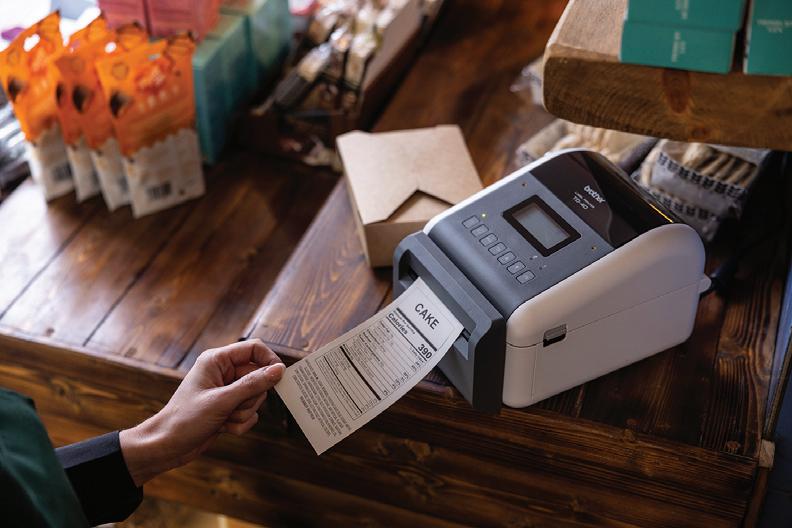
Failure to follow such rules could result in substantial fines or even criminal charges. To avoid penalties and maintain customer safety, businesses should implement effective and accurate labelling solutions.
Brother’s labelling solutions for PPDS foods allow food outlets and providers to produce high resolution
labels. to help businesses meet regulations, streamline labelling process and give customers more confidence in their choices.
Café Common Ground is one such business benefitting from from Brother’s labelling solutions, after it started offering takeaway PPDS food for the first time. Brother’s TD-4520DN professional network desktop printer and free P-touch Editor software was the perfect solution for printing bespoke labels for ingredients and potential allergens as required by Natasha’s Law. The solution delivered fast, professional, and compliant labels that were easy to use.
Additionally, Brother’s stock rotation solution offers complete flexibility and can be integrated into existing digital services or used as a standalone solution with additional battery packs and touchscreen display units available.
As food labelling requirements continue to evolve, businesses should adopt flexible technology that can produce accurate, legible and cost-effective labels, to keep both customers and businesses safe.
Visit https://brother.co.uk/food-labelling to discover our full range of food labelling solutions. See the advert on the previous page for details.
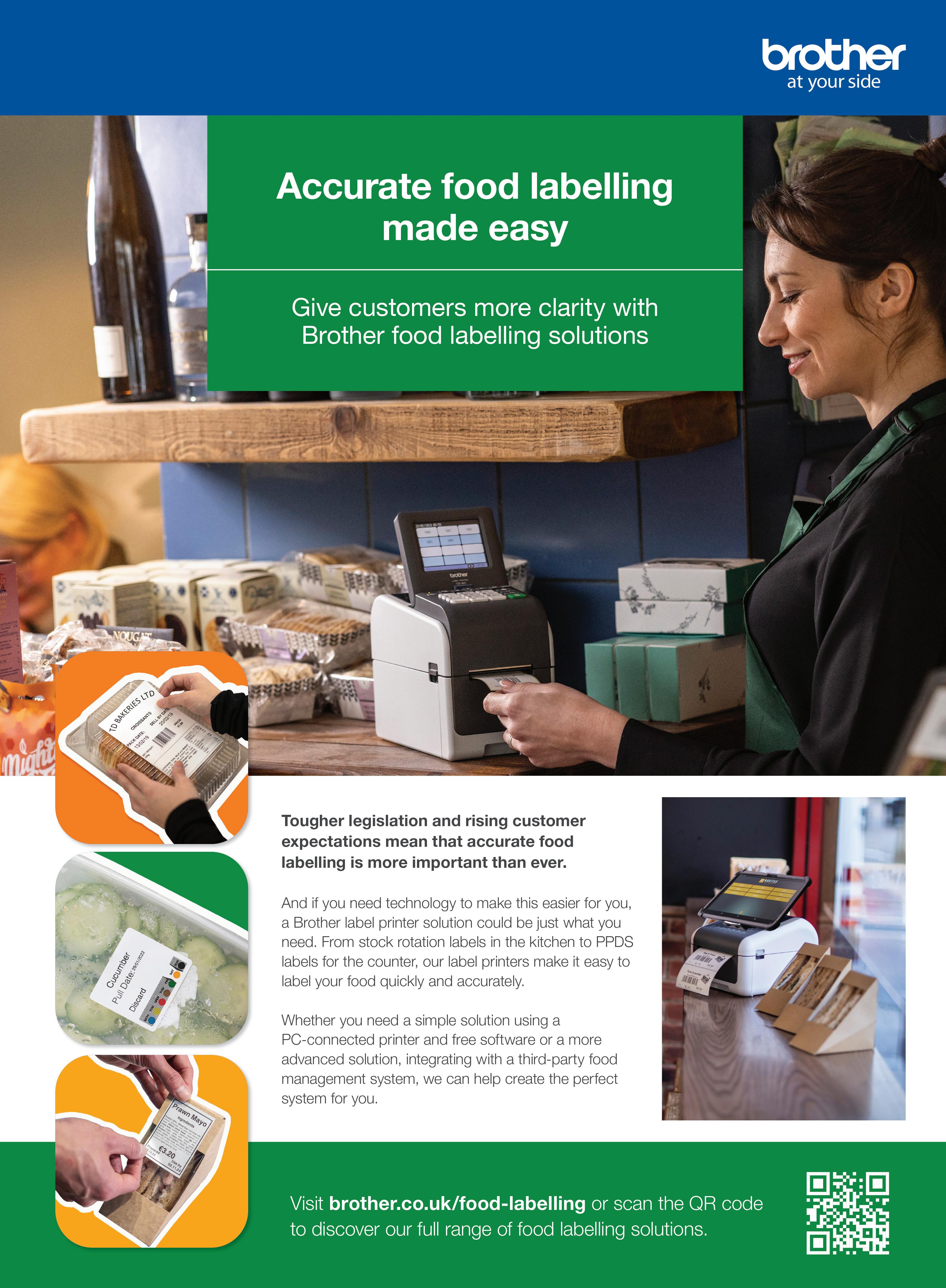

From medieval monasteries to modern beer gardens, cider continues to cement its position as a cornerstone of the UK hospitality sector.
Cider's story in Britain stretches back over a thousand years, with historical records showing that medieval monks were perfecting the art of apple fermentation long before beer became the nation's beverage of choice. What began as a necessity when water quality was questionable has evolved into a sophisticated category that's experiencing remarkable growth in today's challenging economic climate.
The numbers speak volumes about cider's importance to the UK hospitality sector. It has been a positive year for the Cider category, making it one of the most popular of all major drinks categories in the On Premise.
Weston Cider report reveals that Apple Cider remains the most popular type of Cider, driving the category in both value and volume. Across all channels, apple Cider drinkers consume more Cider than those who prefer other types, leading to higher sales rates, volumes, and average spending. Approximately 60% of drinkers and consumers choose apple Cider, reinforcing its position as the leading segment. Notably, premium apple crafted products are experiencing the fastest growth within the Cider market in both channels of trade.
According to the latest Heineken Cider Report, cider is worth £2 billion to UK pubs, bars and restaurants, demonstrating its crucial role in driving revenue across the licensed trade.
This impressive valuation reflects a category that has been consistently outperforming expectations. Over the past 12 months alone, an extraordinary 342 million pints of cider and approximately 114 million bottles have been consumed across the on-trade, underlining the sustained appetite for this quintessentially British drink.
The growth trajectory tells a compelling story of premiumisation and value creation. Over the last two years, cider has achieved a remarkable 5% value growth, with draught offerings being a particular bright spot, signifi-
cantly outperforming packaged alternatives. While volume has seen a 3% decline, this apparent contradiction actually highlights how consumers are trading up to premium options, driving greater value into the market.
"Cider remains a crucial part of the Long Alcoholic Drinks category in Britain and the pub sector is highly important for the category," explains Rachel Weller, Commercial Leader at CGA. "'Premium Local' pubs are a key segment for cider, holding a 19.4% share of total cider sales, while free trade pubs remain the largest tenure, closely followed by managed, which is also in growth."

Apple cider continues to dominate the category, representing, as stated above, approximately 60% of all cider consumption across all channels. This traditional foundation remains robust, with premium apple crafted products experiencing the fastest growth within both on-trade and off-trade channels. The enduring popularity of apple cider reflects consumers' desire for authentic, recognisable flavours even as the category expands into new territories.
However, innovation hasn't been forgotten. Premium flavoured ciders are gaining traction, indicating evolving consumer preferences and the need for operators to cater to diverse tastes. In the period between 2025 and 2035, the category will grow on the strength of innovation in hybrid drinks, functional ingredients, and no- and low-alcohol options. Botanicals, adaptogens, and probiotics will be embraced by businesses for wellbeing consumers.
The demographic profile of cider consumers reveals interesting patterns that savvy operators can leverage. The younger population's preference for the beverage accounted for the category's expansion. According to surveys, those aged 18 to 34 years old were the most frequent users of fruit cider in 2018, accounting for over half of total consumption. This younger demographic

alignment positions cider well for future growth as these consumers mature and develop stronger brand loyalties.
Recent consumer research conducted by business insurance broker Premierline reveals that when asked about their favourite pub drinks, 27% of Brits chose cider, while 18% opted for craft lagers, 14% preferred locally distilled vodka, and only 12% selected gin. This preference places cider as the leading choice among British pub-goers, ahead of many other popular categories.
Summer remains cider's golden season, with beer gardens becoming natural showcases for the category. The refreshing nature of cider, combined with its lower alcohol content compared to many spirits, makes it an ideal warm-weather beverage. The outdoor dining trend, accelerated by recent years' changing social patterns, has only strengthened cider's position as the perfect accompaniment to al fresco dining.
In fact, the humble British pub garden has topped the list of best places for a pint, according to research from Thatchers Cider.
Almost half of Brits (41%) chose the classic pub garden as their perfect location when asked to select the best spots for a pint of cider. This beats the beach, festivals, sports events, mountain views and parks.
Eleanor Thatcher, fifth generation cider maker at Thatchers Cider, said: “It’s a testament to our amazing hospitality industry here in the UK that people would rather be in the pub garden enjoying their perfect pint than anywhere else in the world.
“It is the simple pleasures of getting together at your local with family or friends. You don’t need a special occasion to treat yourself to a glorious pint of refreshing cider, particularly on a sunny day.”
One of cider's most compelling characteristics for operators is its exceptional brand loyalty. Over threequarters of cider consumers specify a brand when ordering, which is five percentage points higher than the average consumer across all alcoholic beverages. This brand specificity creates both opportunities and challenges for publicans.
Almost two in five purchasing decisions are influenced by the availability of favourite brands, making brand selection a more significant driver than value and quality considerations. "With loyalty being so crucial, suppliers must ensure the right cider brands are stocked in the right outlets," emphasises Weller.
As consumers navigate ongoing cost-of-living pressures, the importance of quality in cider has never been more pronounced. Historical trends from previous economic downturns show that while alcohol may not be viewed as a necessity, it's often considered a comfort rather than a luxury. In fact, alcohol sales tend to increase during periods of economic hardship.
This creates a unique opportunity for cider, particularly premium draught offerings. Long alcoholic drinks have traditionally performed better during recessions, as consumers perceive them as offering greater value and affordability compared to more expensive options like wine and cocktails. This positioning allows premium draught ciders to capitalise on consumer behaviour shifts, encouraging customers to choose cider over other beverages in price-sensitive environments.
The renaissance of draught cider represents one of the category's most significant developments. Draught cider maintains a majority share of volume sales while packaged cider has experienced declines. This shift reflects changing consumer expectations and the enhanced experience that draught service provides. For operators, draught cider offers multiple advantages: higher margins, better freshness, reduced storage requirements, and the theatre of service that enhances the customer experience. The visual appeal of cider being pulled from taps, particularly when served in traditional glassware, adds to the premium positioning that drives value.
Understanding consumer behaviour patterns reveals that cider drinkers are actively engaged with the onpremise and are drinking out more frequently than they were a year ago. This increased engagement presents significant opportunities for operators willing to invest in the category.
Range Strategy: Implementing a dual strategy that caters to both draught and packaged cider consumers is essential. While draught should form the core offering due to its growth trajectory and margin benefits, maintaining select packaged options ensures broader appeal.
Brand Selection: Given the exceptional brand loyalty in the category, careful brand curation is crucial. Focus on established brands with strong local recognition while incorporating emerging craft options that appeal to the premium segment.
Seasonal Maximisation: Leverage cider's natural summer seasonality by creating dedicated outdoor displays, garden-specific promotions, and food pairing suggestions. Consider extending the season through autumn with warming spiced varieties and harvest-themed presentations.
Quality Focus: With consumers prioritising quality over quantity, ensure proper storage, service temperatures, and glassware selection. Invest in staff training to communicate the provenance and craftsmanship behind premium offerings.
Innovation Balance: While apple cider remains dominant, introducing carefully selected flavoured options can attract new consumers and provide existing customers with variety. Monitor local preferences and seasonal trends to guide selection.
The cider category's resilience and growth potential position it as an essential component of any well-balanced drinks portfolio. With consumers demonstrating increased engagement with on-premise occasions and a willingness to invest in quality experiences, operators who understand and capitalise on cider's unique characteristics will find themselves well-positioned for success.
Consumers who drink cider are not just loyal to brands but increasingly active in their on-premise engagement. This combination of brand loyalty, increased frequency, and premiumisation creates a powerful foundation for sustained growth.
The ancient art of cider making has evolved into a modern success story, proving that tradition and innovation can coexist profitably. For operators willing to embrace the category's potential, cider offers a path to enhanced revenue, customer satisfaction, and competitive differentiation in an increasingly challenging marketplace.
The message is clear: cider isn't just surviving in the modern hospitality landscape – it's thriving. Those who recognise and act on this opportunity will find themselves raising a glass to sustained success.
Customers care deeply about the environment and want to feel empowered and optimistic about their drink choices. With twothirds looking for a cider that’s sustainably made, choosing the right supplier can boost customer confidence and improve sales.
From turning apple waste into green energy, to capturing carbon created during fermentation and using it to add sparkle to the ciders, Thatchers is committed to sustainability. That’s why we spent three years regeneratively farming before planting 13,000 trees this year, and why we make all our ciders using 100% renewable electricity, including power from the 13,500 solar panels on our roof. But the story doesn’t stop at the orchard. After

more than 120 years working in partnership with nature, we’ve learnt how to make delicious ciders that are as good for the environment as they taste in the glass. Pairing those ciders with robust flavours such as cheese, meat, fish and spice will enhance menus and offer diners unique experiences. We recommend a quality apple cider like Thatchers Gold - the No.1 brand for apple cider drinkers, alongside Thatcher’s award-winning fruit cider range (Blood Orange, Cloudy Lemon and Apple & Blackcurrant), and the No.1 low/no cider, Thatchers Zero, to ensure you have something to delight everyone.
See the advert on this page for further information.

To mark 145 years of cider making, Westons Cider – the UK’s leading independent cider maker – is running a nationwide summer giveaway aimed at rewarding and recognising its valued on-trade partners.
From 1st May to 31st August 2025, pubs and bars across the UK will have the chance to win a share of over £112,000 in cash prizes, with four lucky winners taking home £10,000 in cash and 145 more each receiving £500 to support their business.
Running throughout the key trading period over spring and summer, the campaign is giving back to the venues that have supported the brand over the decades. With significant cash prizes on offer, it’s a simple way for operators to get rewarded for stocking a trusted cider range that consistently performs behind the bar.
The competition is open to both new and existing Westons stockists, including those purchasing via national, regional wholesalers and pubcos.
“Celebrating 145 years is a huge milestone for us,” says Darryl Hinksman, Head of Business Development at Westons Cider.
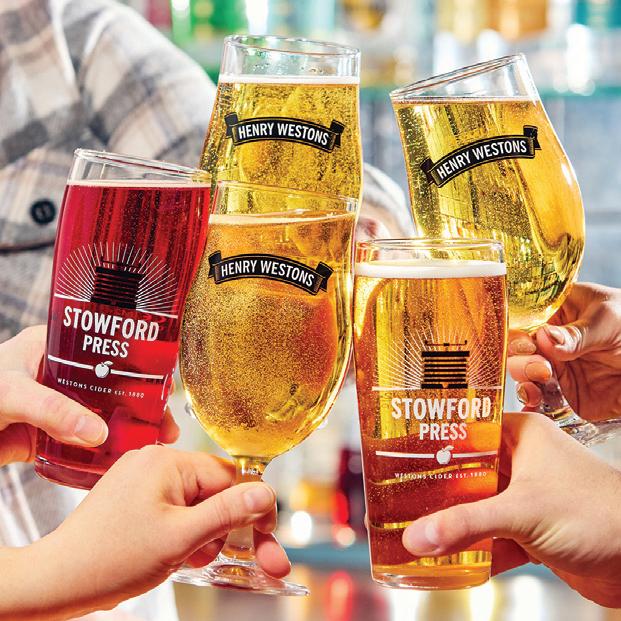
“Pubs and bars have always been at the heart of our story and this campaign is our way of saying thank you, giving our customers an easy way to get even more from the brands they choose to serve. Whether the prize money goes towards a garden revamp, team incentives or new kit behind the bar, we hope it delivers real impact to our trusted partners.”
Sheppy’s Cider, renowned as one of the oldest cidermakers in the world, has been producing premium traditional cider in Somerset for over 200 years.
Established in 1816 by David Sheppy's ancestors, the company expertly blends time-honoured techniques with contemporary technology, all while upholding a steadfast commitment to quality.
CRAFTSMANSHIP AND EXPERTISE
David Sheppy, the Master of Cider, expertly manages the detailed cider-making journey from apple to bottle, guaranteeing exceptional quality through his extensive knowledge. The apples used by Sheppy are cultivated across 90 acres of orchards on their farm, and they employ a natural fermentation process that utilises wild yeasts.
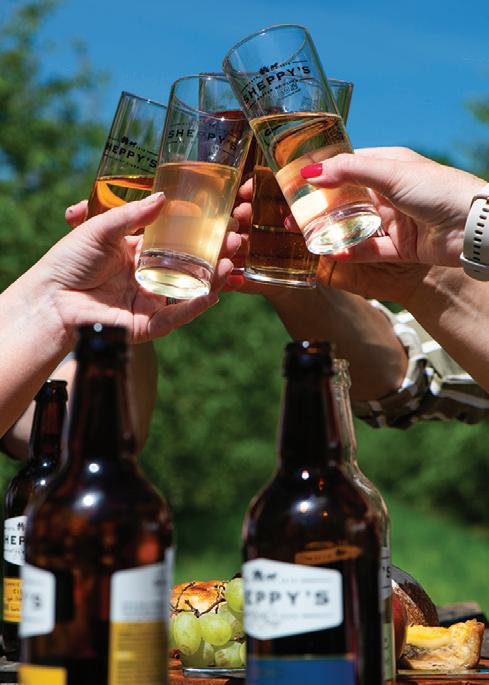
Located at Three Bridges Farm near Taunton, Sheppy’s takes pride in producing pure apple juice products and using natural ingredients to create an exceptional range of ciders for discerning consumers. Furthermore, Sheppy’s is dedicated to environmental protection and sustainability. The company reduces waste in production by directing used water into swales, which foster habitats for diverse wildlife. Additionally, Sheppy’s collaborates with sustainable packaging suppliers to uphold robust environmental practices.
These initiatives reflect Sheppy’s unwavering dedication to sustainability while celebrating its rich heritage.
For further information, see the advert below or visit www.sheppyscider.com

To enter, outlets simply need to purchase three kegs of qualifying Westons draught cider – including Stowford Press Apple, Stowford Press Dark Berry, Henry Westons Vintage and Henry Westons English Berry Draught – and enter through the following webpage: https://westons-cider.co.uk/10000.
Every additional three kegs purchased gives pubs another entry, meaning the more kegs ordered, the better the chances.
There’s also the opportunity to earn bonus entries through Westons’ ‘Refer a Pub’ feature – if a participating pub refers another venue to the competition, and that venue makes a qualifying entry, the referring pub will gain an extra entry.
Renowned for its premium, crafted ciders such as Stowford Press and Henry Westons, Westons is proud to still operate as a fourth-generation, family-run business. Every drop of cider is pressed, fermented, and packed at its mill in Much Marcle, Herefordshire, using traditional cider apples grown and harvested within a 50-mile radius. Westons’ ciders reflect the quality of the local orchards and the expertise built over 145 years of cider making –earning the brand a reputation for quality, consistency and craftsmanship across the trade.
For full details, terms and conditions, and how to enter or refer a fellow publican, head to https://westons-cider.co.uk/10000.
As the mercury rises and cider season kicks into high gear, Magners is making a bold move to reignite consumer passion with its most ambitious campaign in over a decade. Backed by a multi-million-pound investment, the new initiative, aptly named ‘That’s Magnertism’, is set to energise the on-trade and bring a refreshing buzz to bars across the UK.
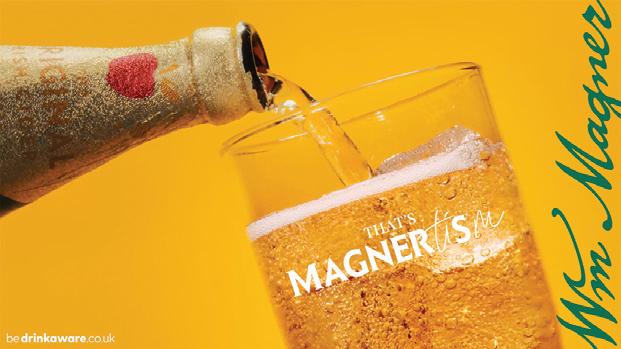
Launching in May, the campaign is a full-force celebration of the unique energy that Magners brings to social moments. At the heart of the campaign is the hero TV spot ‘Fizzy Feet’, a vibrant, foot-level visual capturing the contagious joy of that first sip of Magners over ice. It’s a sensory experience designed to resonate with customers and drive footfall during the crucial summer trading months.
For the on-trade, this campaign is more than just noise - it’s a business opportunity. The 2025 Magners Trade Programme will engage 2,000 venues across England, Scotland, Wales, and Northern Ireland. With a scan-towin mechanic offering prizes including a trip to New York, it’s a compelling reason for customers to choose
Magners at the bar. This initiative not only boosts engagement but also adds value for operators looking to differentiate their cider offering.
Jane Parlon, Director of Brand Marketing (Cider) at C&C Group, describes Magnertism as “the unique and infectious energy that comes from Magners, and the power to draw the best out of people and moments spent together.” It’s a sentiment that aligns perfectly with the ontrade’s role in creating memorable social experiences. Outdoor advertising featuring glistening macro shots of Magners over ice will complement the TV and digital rollout, reinforcing the brand’s refreshment credentials. With cider sales historically peaking in June through August, the timing couldn’t be better.
For publicans and bar managers, this campaign offers a ready-made platform to drive sales, attract new customers, and capitalise on the seasonal uplift. With strong brand heritage, a compelling consumer promotion, and a nationwide media presence, That’s Magnertism is set to be the spark that lights up the cider taps this summer.


Brand new consumer research from premium snack brand Tyrrells shows pubs remain in high demand and at the heart of social culture in the UK, with 49% of people favouring their local pub over other venues and 51% of people going to the pub to catch up with friends and family.
Great food, drink, and service lead as the top three distinguishing factors that create a great pub experience, with sport screenings (24%), live music (41%) and beer gardens also proving to be important features for consumers as they continue to value traditional pub experiences.
The research conducted by leading snacks provider and owner of Tyrrells, KP Snacks, also highlights ways in which the hospitality industry can increase spend and make visits more pleasurable. Feedback shows that 1 in 4 visitors go to pubs to celebrate a special occasion and that 24% of consumers identify premium snacks as a core element of making a visit feel more like a social occasion. Half of customers are also more likely to purchase a bar snack from a premium brand, with 38% of people purchasing a snack at a pub to share with family and friends.
Tyrrells is supporting pubs and bars in driving sales with The League of Tyrrellbly Good Taste by delivering free POS to signpost the availability of snacks and support pubs in driving sales.

There are certain elements of a visit to the local pub that customers take for granted.
Beer, wine and bar snacks are usually a guarantee but in the early months of 2025, normality came under threat by a foot and mouth outbreak amongst animals in Eastern Europe.
This severely impacted the supply of pork rind leading to a shortage of Pork Scratchings across the trade.
Landlords, wholesalers and factory owners were left scratching their heads!
The team at Snack Brands, home of Uncle Alberts Porkshire Pig were suddenly inundated with panicked phone calls from competitors desperately trying to plug holes in their supply.
Alex Morrisey, Head of Sales and Marketing at Snack Brands shares his thoughts on the unique challenges the industry has faced and is optimistic about the resilience of the humble Pork Scratching.
‘’We started the year riding the coat tails of the keto diet phenomenon, our Crunch product was seeing
Robert's Dorset provides an unparalleled snack experience that will elevate your trade and hospitality offerings to your customers.
At Robert's Dorset, we understand the diverse dietary preferences of your patrons, whether they follow a vegan, keto, or allergen-free lifestyle. Rest assured; our selection of snacks caters for all.
As a trusted supplier to independent shops, pubs, and the hospitality industry, we offer a range of sizes in all our products for direct reselling.
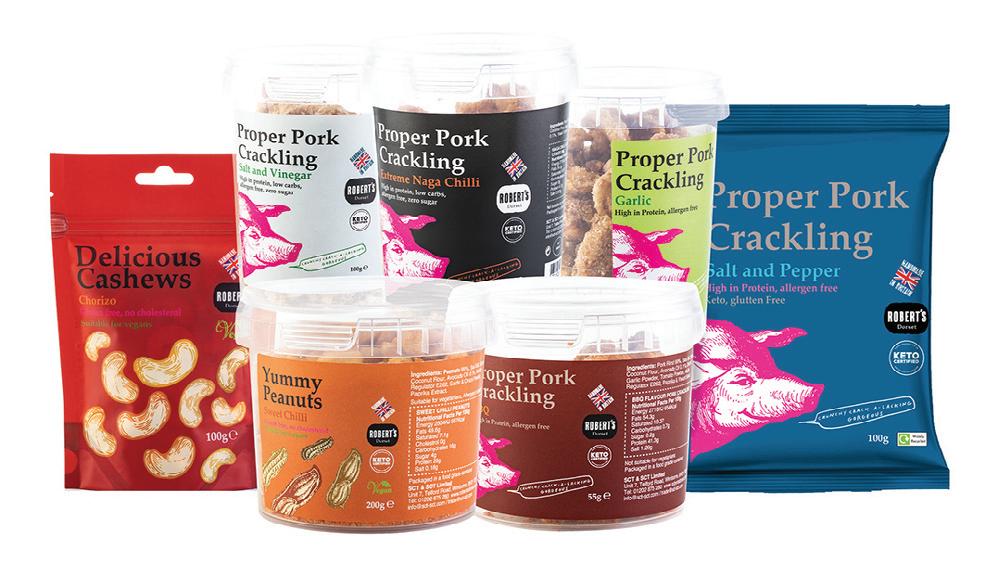
Our vibrant packaging is designed to catch the eye, while the contents are sure to satisfy. From our stackable pots which optimise your shelf space, and fit most cup holders, to our elegant mason jars which add the "wow factor" to any display.
Discover the perfect bar snacks to complement your fine beverages or enhance your guests' welcome baskets with something truly special.
WHY CHOOSE ROBERT'S DORSET?
Established in 2011, we are a family-owned and operated business. At the core of our operations lies a personal touch, ensuring our trade customers enjoy the following advantages:
• Delicious snacks to delight your customers.
• Exceptional customer service, led by a dedicated Account Manager.
• Convenient ordering options, whether online or by phone.
• Handcrafted products made in beautiful Dorset, England.
• Every item is prepared to order, ensuring customers always receive the freshest products
• All our packaging is fully recyclable or reusable and we have a 99.9% waste free production process
• Proudly certified by the Roundtable of Sustainable Palm Oil (RSPO) - palm oil is only used in Fudge
• All our ingredients are of the highest quality. Contact Robert for an online catalogue and more information regarding our perfect snacks. robert@robertsdorset.com | 01202 875280 | www.robertsdorset.com
See the advert on page 5 for further information.
Sam Trabelsi, Out of Home Controller, KP Snacks, says: “We know recent increases in National Insurance Contributions and other rising costs have left many pubs fighting for survival. As a market leader in snacking, we want to do our bit by sharing some valuable insights with owners to support the hospitality industry to drive sales during such a difficult time. Our research shows that Brits continue to support pubs and bars and are actively seeking out a memorable pub experience with a focus on excellent delivery. With evidence showing that premium snacks also enhance pub experiences and make them feel more upmarket, this new data gives valuable insights on how to drive consumer engagement and maximise sales”.
Pubs can register their business to become a “Tyrrellbly Tasteful Establishment” via a bespoke platform to avail of their free POS kit and the chance to win a year’s supply of Tyrrells crisps, worth more than £5,000. To join or find out more, visit here: https://www.tyrrellscrisps.co.uk/league/
With over 90 Great Taste Awards across the range, Tyrrells is a leading premium snacking brand, worth £71.3m and growing ahead of the overall Bagged Snacks category at +9.5%[1]
really strong sales and our scratchings and crackling were flying out too.
April was a difficult month, we were essentially rationed by our suppliers and our sales took a 20% hit on the previous year.
Bumps in the road can also present an opportunity, our Jalapeno and Roast Pork Crackling were readily available and we were able to push these products into some of our larger stockists. The industry has faced 9 years of challenges from Brexit to the energy crisis via a global pandemic but we are optimistic about growing our business in a more stable business environment.
Thankfully the restrictions have recently been lifted by DEFRA,
‘’We are fully stocked and have just launched our brand new website, www.snackbrands.co.uk, trade customers can sign up for exclusive discounts.’’
See the advert on the inside front cover for further details.
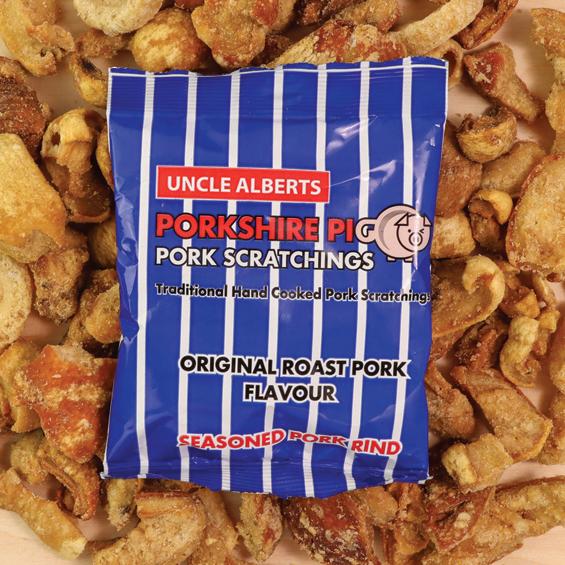
DON’T MISS OUT ON REAL HAND COOKED CRISPS’ MASSIVE TRADE EXCLUSIVE COMPETITION… WIN YOUR SHARE OF £25,000 WORTH OF FREE STOCK!
REAL, the foodservice focussed premium hand cooked crisps with bags of character, is running its biggest ever competition, giving away over £25,000 worth of free stock.

Every month from May to September, five lucky winners will each receive £1,000 worth of REAL Hand Cooked Crisps stock. That's five chances every month for five months to win a share of this incredible prize!
Mark Dyer, Tayto Food Service National Account Controller shares, “We’re REAL-ly excited about our biggest ever trade exclusive on-case promotion. With over 20 years of supporting the food service channel, this MASSIVE stock giveaway - alongside our ongoing partnership with the Springboard Charity - underlines our commitment to this vital sector.”
Entering is easy - purchase any case of REAL Hand Cooked Crisps from your delivered wholesaler or C&C and visit realcrisps.com/win
Upload your receipt and be entered into the monthly draw.
With a draw every month you have even more opportunities to win if you buy REAL regularly!
REAL is a Great Taste Producer with a range of 9 ‘in your face’ flavours that are all gluten free, vegetarian and with no added MSG.
With five chances to win every month, there's never been a better time to get your hands on some of best-selling flavours!
This is a REAL-ly big prize that you don't want to miss!
Tayto Group is the largest family-owned, Britishmade snack company, with a stable of well-known British brands:
• Great Taste Award winning pork scratchings
- Midland Snacks, the ultimate and traditional pub snack
• Golden Wonder fully-flavoured crisps – the iconic favourites
• Animal Adventures - the fun, gluten-free, vegan, family-friendly snack
• Marmite Crisps – your customers will LOVE these moreish crisps
With the perfect product for everyone, Tayto has food service snacking sorted…


In a professional kitchen, sharpness isn’t a luxury — it’s a necessity. From the first prep of the day to the final plating at night, chefs count on their knives to deliver precision. That’s where the Tormek T-2 Pro Kitchen Knife Sharpener comes in — a sharpening solution trusted by culinary professionals around the world.
Backed by over 50 years of sharpening expertise, and developed for the intensity of the commercial kitchen, the Tormek T-2 Pro Kitchen Knife Sharpener gives chefs full control over their edge. The machine is gentle on knives — it sharpens, not shortens. Thanks to the slow-rotating diamond grinding wheel and high-precision guide, it only removes minimal steel, preserving the life of your knives while delivering exceptional sharpness. What sets the Tormek T-2 Pro Kitchen Knife Sharpener apart is its blend of sim-
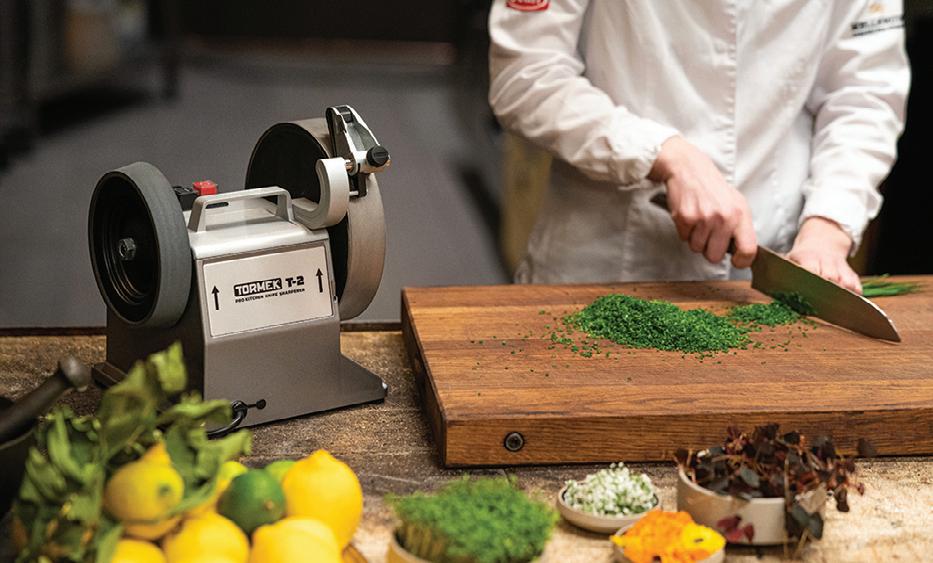
plicity and professional-grade results. No guesswork. No overheating. Just consistent, razor-sharp edges — time after time. With its low-noise operation and compact design, it integrates seamlessly into even the busiest culinary spaces — and is also suitable for sharpening other blades commonly used in food preparation.
The Tormek T-2 Pro Kitchen Knife Sharpener is designed to handle a wide range of kitchen knives — from large chef’s knives to small paring blades — and can also be used to sharpen other common kitchen blades, including mandoline blades and S-blades.
Ever since its launch in 2010, LittlePod has been exporting its natural ingredients range to Germany.
So when it came to choosing a venue for a European book launch in May, Berlin proved to be the perfect place.
Written by Janet Sawyer MBE BEM – the company’s Managing Director and founder
– Real Vanilla: Nature’s Unsung Hero tells The Rather Large Story of LittlePod.
Having introduced her latest book at an intimate event at Mansfield Park – home of ‘the best vegan cakes in Berlin’ and a long-time LittlePod customer – Janet is preparing for this summer’s UK launch event with a vanilla-themed dinner at Darts Farm’s award-winning restaurant in East Devon.
“LittlePod is a glocal company, doing business both at home and abroad,” said Janet.
“Having long exported our products, we have never lost touch with our friends in Europe and it was a great pleasure to take this book to Berlin. Having launched Real Vanilla: Nature’s Unsung Hero in Germany, we are delighted to be holding our UK
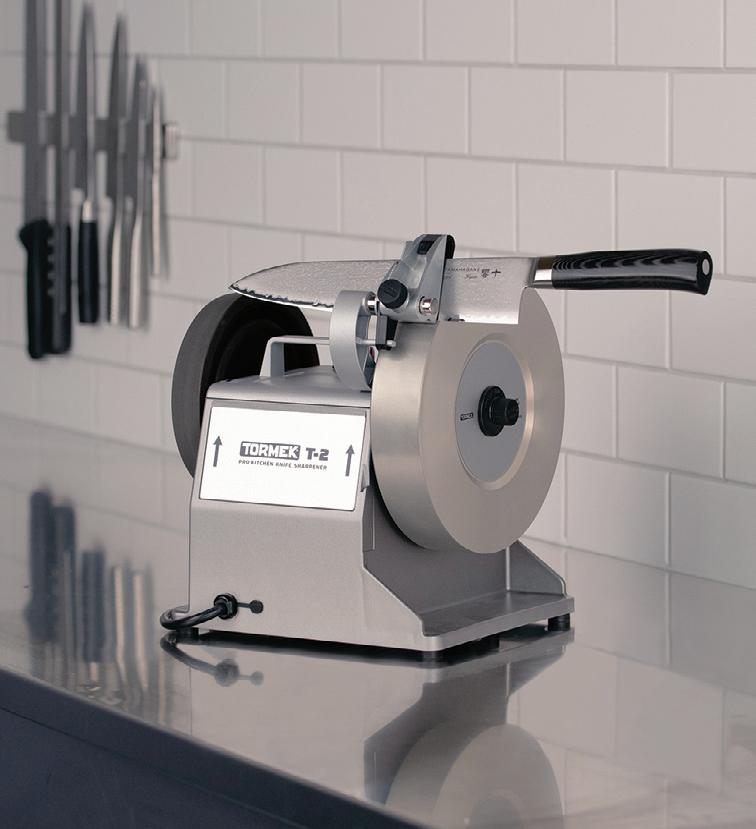
No matter the task, a properly sharpened knife is essential for efficiency and control. The Tormek T-2 doesn’t just sharpen knives — it elevates the entire kitchen workflow.
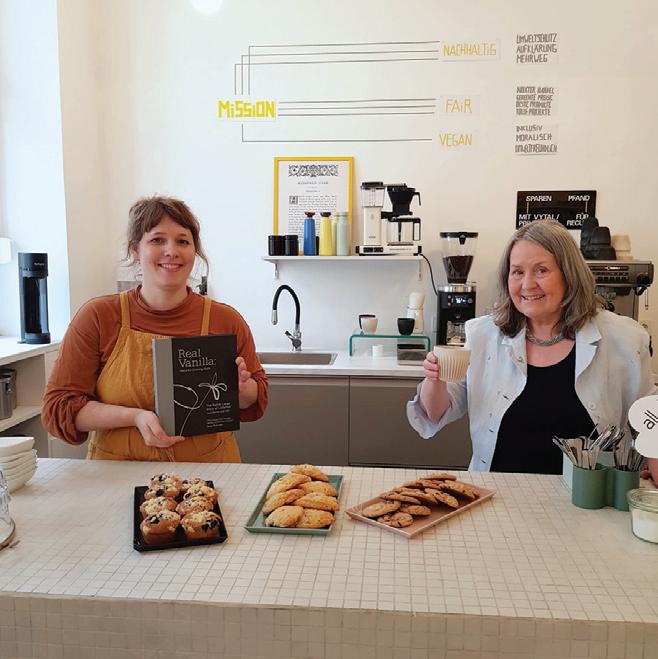

tormek.com
Phone: +46 581-147 90
Email: info@tormek.se
See the advert on page 7 for details.
event on our doorstep here in Devon. The team at Darts Farm have always been fantastic advocates for our Campaign for Real Vanilla and this is the perfect place to launch a book telling The Rather Large Story of LittlePod.”
Published fifteen years after LittlePod first launched its innovative natural vanilla paste in a tube, used and loved by professional chefs all over the world, Janet’s second book is available from all good retailers this summer.
Having unveiled Real Vanilla: Nature’s Unsung Hero in Germany, Janet is preparing to launch her book in the UK at The Farm Table – named the Best Farm Restaurant 2025 at the recent Farm Restaurant Awards – on Wednesday, 2nd July. Including a delicious four-course vanilla-themed dinner prepared by head chef Tom Chivers using responsibly-sourced ingredients from the LittlePod range, tickets are on sale now. Limited availability, please visit https://www.dartsfarm.co.uk/events or email sales@littlepod.co.uk to find out more.
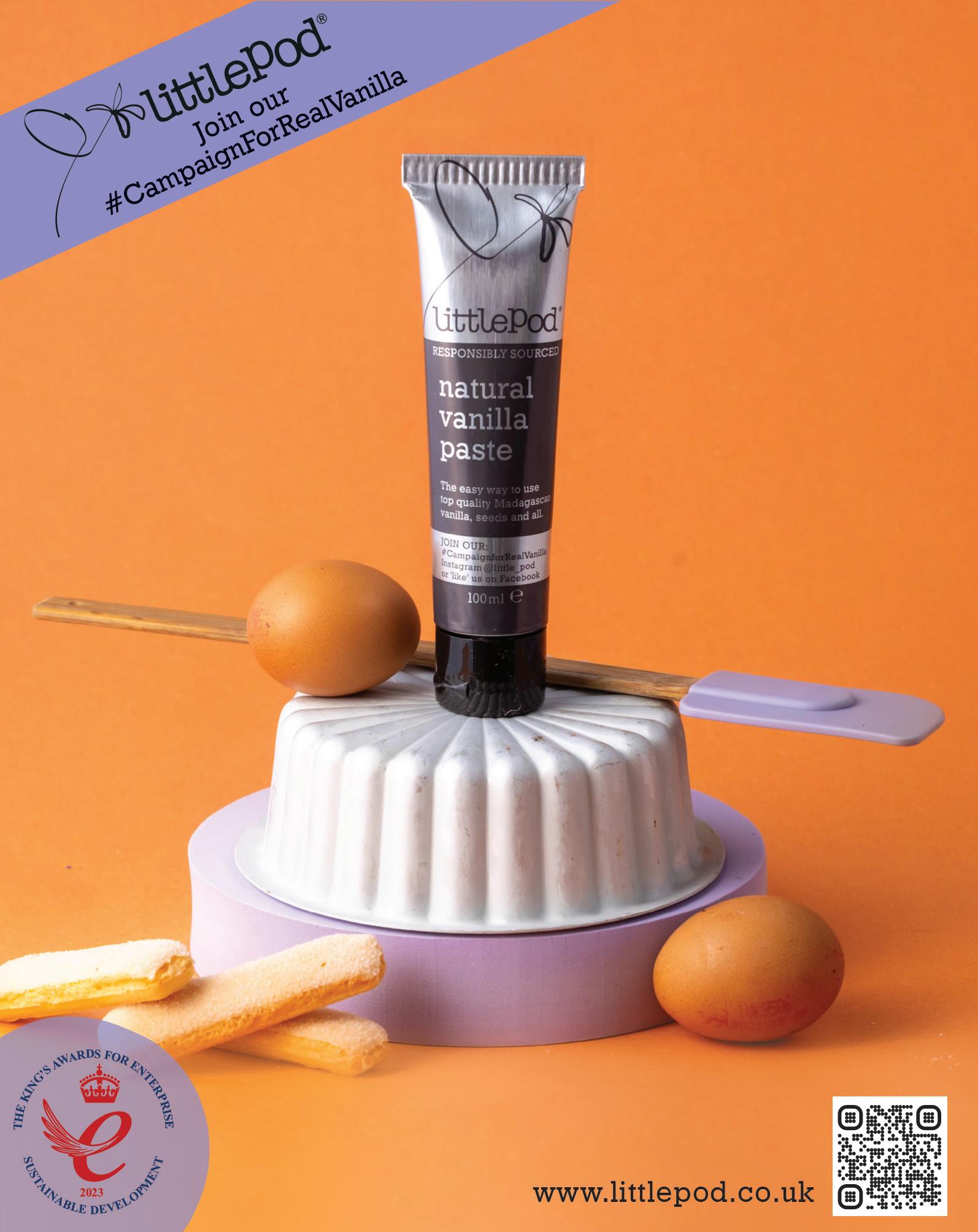
Are you looking for an affordable and yet effective way of increasing visitors into your business? Are you fed up watching the scores of high street shoppers walk past and not come in?
Let’s take a moment and put yourself in the shoes of a passerby. You’re walking down the street, heading home or to meet friends. You pass by a pub that you’ve never really noticed before. Outside the front door, there’s a pavement A-board with a blackboard surface. It reads: “National Fish & Chip Day! Two for £12 – today only.”
Suddenly, you’re hungry…
You didn’t plan to stop, but the message was clear, relevant and inviting! You weren’t thinking about food. But now, you’re interested. That’s the power of a simple blackboard on the pavement. It works in real time, catching the attention of people walking by, right when they’re open to being influenced.
There is still something very powerful about a message written on a chalkboard. It feels personal, immediate and real. Almost 8 in 10 high street consumers said they had entered a store they had never visited before purely based on the signage alone.
A-BOARDS: NO DEGREE NEEDED
The good news? You don’t need a marketing degree to use one effectively. No expensive agency. No fancy design skills. No high-tech equipment.
All you need is a blackboard A-board, a chalkpen and a clear idea of what you want to say.
Think of your A-board as a way of talking directly to your potential cus-
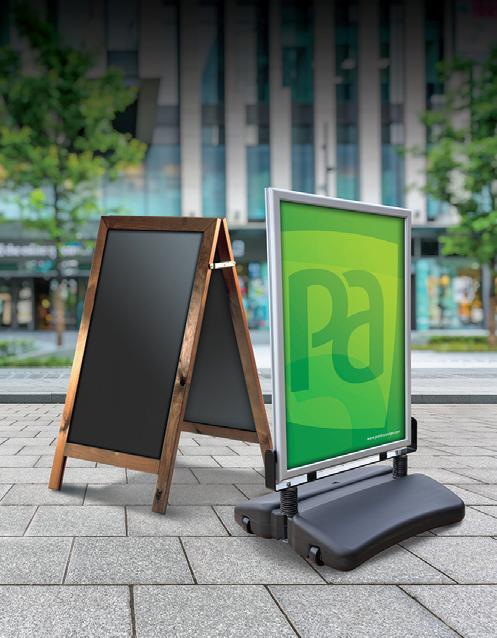
tomers. It sits quietly outside your business, working all day to bring people in. Over time, one A-board could attract hundreds – or even thousands – of people into your venue.
Before you start writing, take a moment to think. What do you want people to know?
Is there a special event happening? A limited time offer? A new dish on the menu? Are you showing live sports this weekend? Use your A-board to promote these occasions and tell people what you are doing.
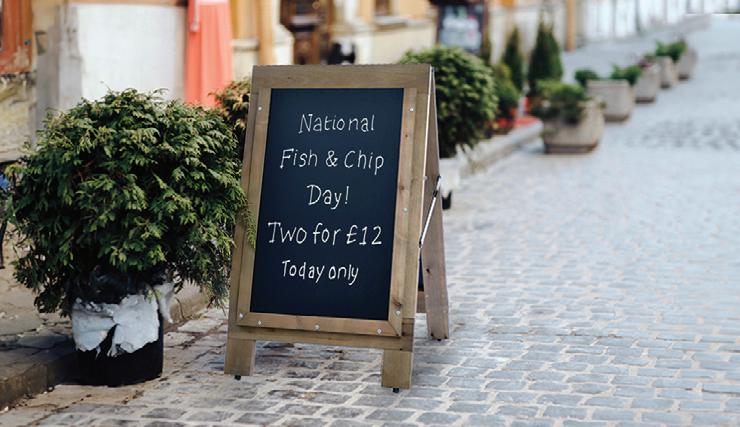
Make your message clear and relevant. Think about what would make someone stop and take a second look. A well-timed message can be just enough to tempt someone inside.
If you’re not sure how to write your message or worry that you’re not very artistic, don’t panic. You don’t need to be an expert. Just keep your design simple, bold, and easy to read.
Use liquid chalk markers instead of traditional chalk. They come in lots of colours and make your writing look clean and professional. These pens use a pump-action mechanism that feeds ink to the tip, giving you much better control.
Here’s a tip: lay your A-board flat on a table or the floor while you write. It’s easier to work with, helps prevent mistakes, and stops the ink from running. If you want to make your message look extra tidy, try using letter stencils. It gives your board a neat and uniform look.
BUILT TO LAST – DESIGNED TO SELL
At Majisign, we’ve designed and built our signature blackboard A-boards with pubs, cafés, and shops in mind.
Each board is made in our UK factory using responsibly sourced timber. We apply a specialist blackboard coating ourselves – one that’s been developed to last in all kinds of weather. It’s highly durable, easy to clean, and designed for regular use.
So, when the sun suddenly disappears and those inevitable British summer showers arrive, you can quickly change your message from “Beer Garden Open” to “Covered Beer Garden – Come In!”
Majisign A-boards are made for the real world. They’re tough, good-looking and made to work hard – every single day.
Compared to digital advertising, printed flyers or other marketing tools, a good-quality blackboard A-board is incredibly cost-effective. Once you’ve got it, there’s nothing more to buy – just update your message when needed and keep it clean.
It’s one of the simplest and smartest investments you can make. Need help choosing the right A-board for your business? Get in touch –we’re happy to advise. At Majisign, we’re here to help you stand out, one message at a time.
Try a Majisign Blackboard A-board and see the difference for yourself. See the advert on this page or www.majisign.co.uk for details.
Summer is finally here, it’s warm outside and the sun is shining, your beer garden looks lush and colourful, and your beer is ice cold. Your pub is the destination everyone needs; an opportunity to quench their thirsts and catch up with friends, meet up with family, or just have a pint with a colleague after a hard day at work.
But even better, you’ve just added a new menu with some great sharing platters and tapas dishes, which will help keep those punters there for a little bit longer and increase your turnover to boot!
Oh…and wait, you have a live band on Saturday night, a really good one, they play all the hits!
Problem is…how do you let people know? Put it on Facebook or Instagram…but are your customers following your socials? And what about new customers? What about the potential
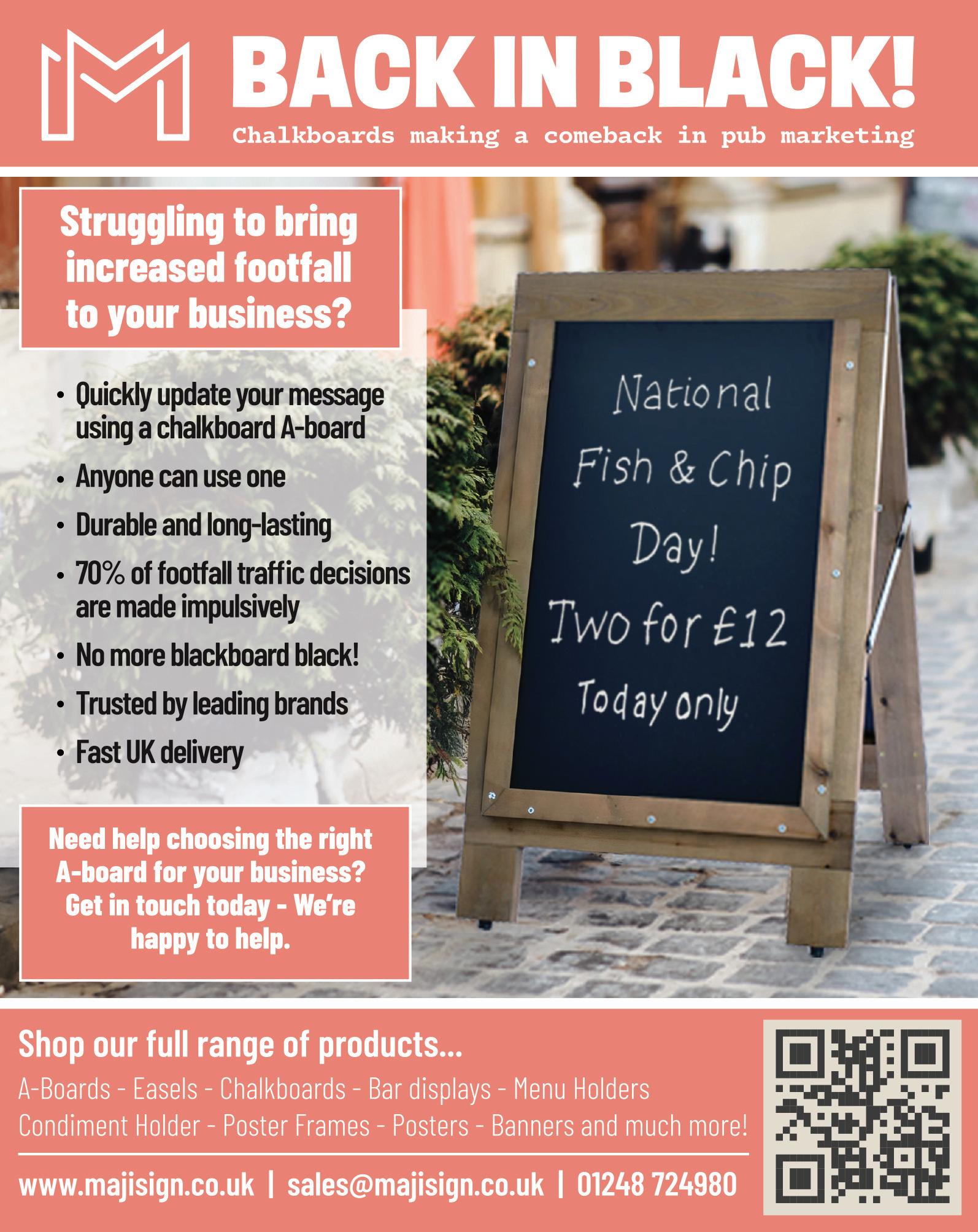
new customers that are right outside your pub now, busy with their shopping, heading home after work, mooching around town on a nice warm Saturday afternoon? How do you let those people know?
For those people - the ‘fancy a pint after work’ crowd, the afternoon retail therapists, the people gasping for a drink on a warm sunny day - you need an A-Board from Peerless-Assigns, specialists in supplying the hospitality industry for over 25 years.
We have a huge selection of A-Boards and Pavement Signs ranging from traditional chalkboard A-Boards to heavy duty Forecourt Signs with sturdy water-fillable bases. For outdoor advertising, Peerless-Assigns has got you covered.
We’re a friendly bunch, so give us a call on 01462 672 000, or check out our website at www.peerlessassigns.com
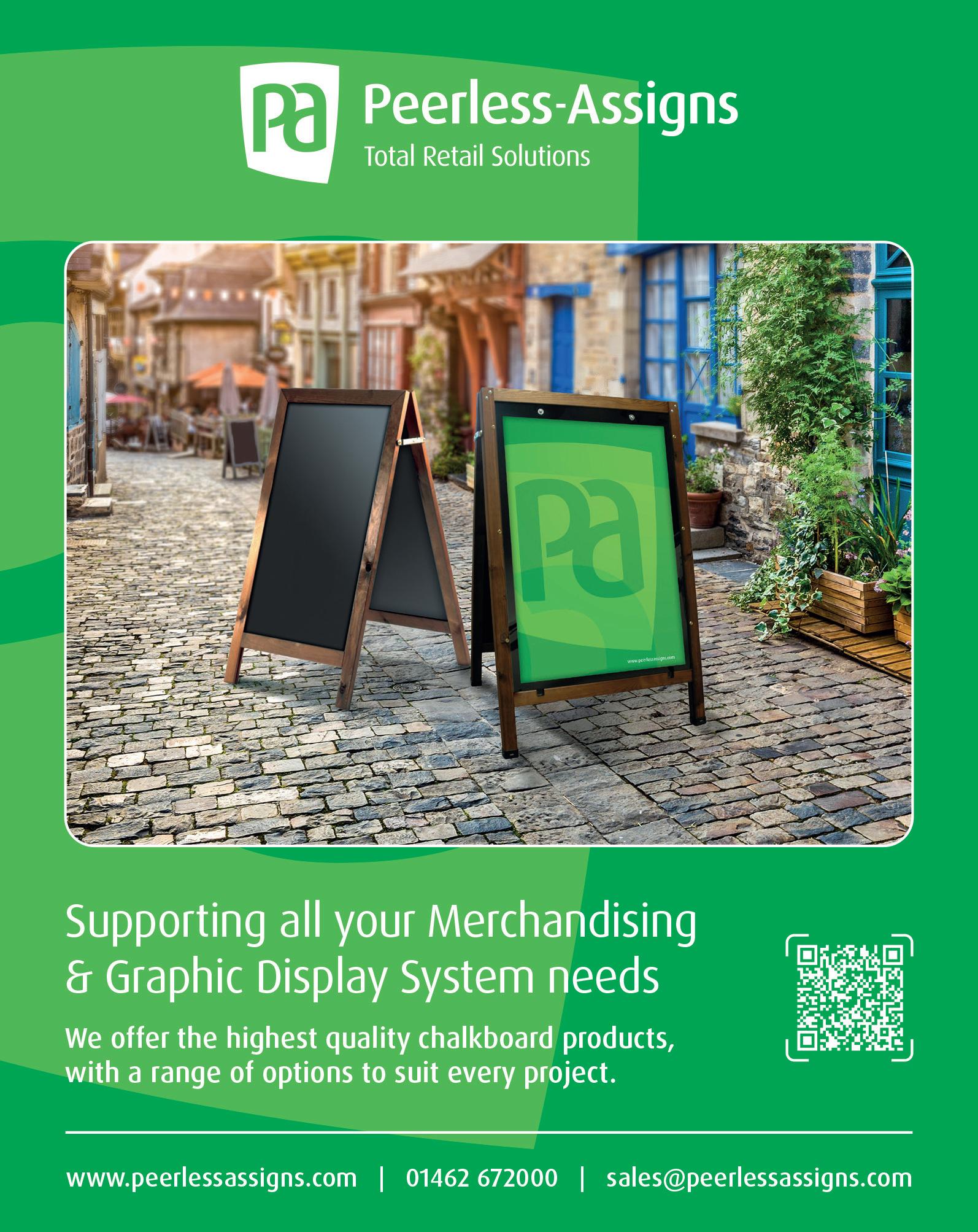
New research from eco-friendly toilet paper brand, Who Gives A Crap, reveals just how damaging a bad bathroom can be to hospitality businesses. More than three quarters (76%) of customers believe that toilet conditions reflect the overall hygiene standards of venues, and 61% would never return or recommend a venue due to bad toilet experiences.
To stop businesses flushing money down the loo, Who Gives A Crap has launched the “Loo-Print” - a practical 10 step guide for bathrooms, to boost businesses’ reputations, retain customers and get their (back-of) house in order. THE LOO PRINT
1. Clean it like you mean it: Regular cleans keep your bathrooms looking and smelling heavenly.
2. Restock regularly: Start a restock schedule for your loo roll, soap and towels.
3. Don’t leave them high and (not) dry: You can’t go wrong with eco-friendly paper towels, reusable cloth towels or energy-efficient dryers.
4. Show your loo some love: Upgrading your loo with modern fixtures, colourful tiles, fun signage or a cheeky mirror adds some ooh to your loo.
5. Room to move: Roomy cubicles and lots of mirrors are an easy way to win over customers.
6. Set the mood: Add low lighting, soft background music, and subtle scents with a diffuser or candle.
7. Treat their cheeks: You can tell a lot about a business by their loo roll. Customers love thick, soft and, of course, eco-conscious toilet paper (hint, hint).
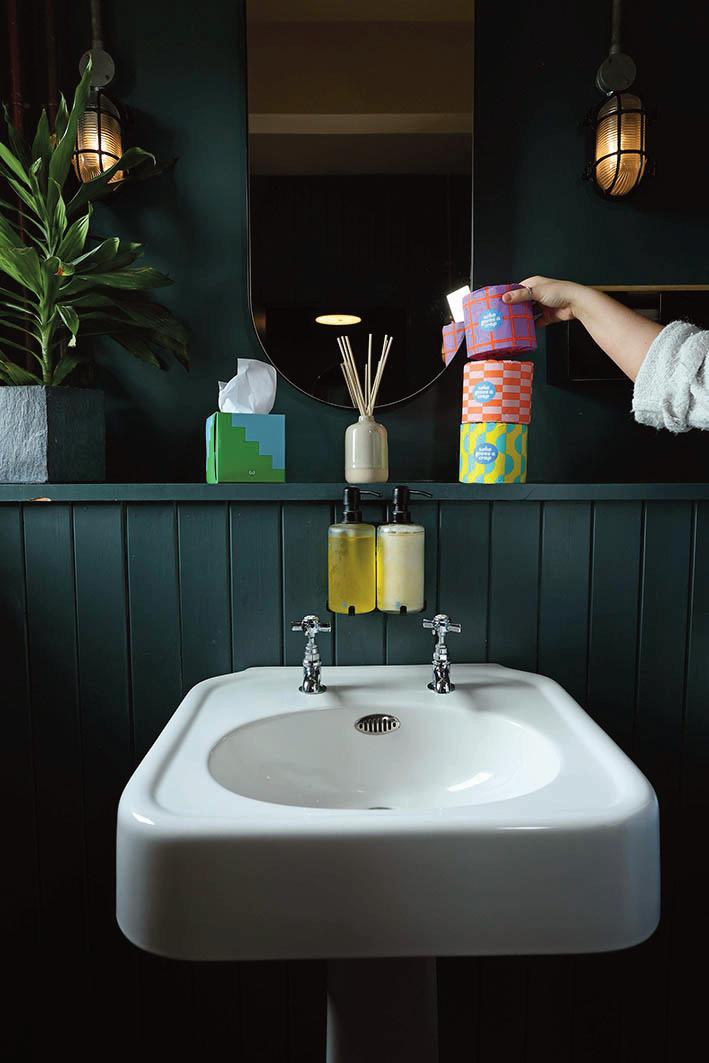
8. Not too hot, not too cold: Add some heating or ventilation to keep the temperature just right all year round.
9. Make accessibility a priority: Thoughtful touches like grab rails and lower sinks show your business values inclusivity and the comfort of every guest.
10. It’s the thought that counts: Consider providing some extras like hair dryers, free period products, emergency deodorant or tissues.
According to the research, when a venue’s bathroom is up to scratch, 71% of customers are more likely to return, with 67% more likely to recommend the place and 50% more inclined to leave a tip. Additionally, 43% of respondents claimed that a positive toilet experience shows the business cares about its customers.
David Titman, Marketing Director at Who Gives A Crap says “Our Loo-Print lays out the must-haves for hospitality spaces to ensure their bathrooms are fit for the best of Britain. Nothing ruins a great meal or drinks like stepping into a neglected bathroom. Businesses are losing bums on seats by overlooking this crucial touchpoint - and there’s a simple way that we can tackle this problem.”
Lovely loo experiences are grounded in Who Gives A Crap’s commitment to water, sanitation and hygiene (WASH). The business donates 50% of all of its profits to WASH causes.
Due to support from customers, over the years, Who Gives A Crap has been able to donate over £9m to WASH causes so far.
To join more than 1,800 other businesses using Who Gives A Crap, and find out how it can help your business, go to: https://uk.wholesale.whogivesacrap.org/

A spa hotel resort on Windermere is benefiting from a major renewable energy project with the addition of 385 photovoltaic solar panels to roofs across its site.
Low Wood Bay Resort & Spa has installed the solar panels on five buildings around its grounds, with each cluster facing south or south westerly to maximise sunshine hours and light exposure.
English Lakes Hotels Resorts & Venues has invested £195,000 in the project which is aligned with its ecotourism and sustainability commitments. The hotel group commissioned Kirkby Lonsdale based firm RJ Solar to instal the PV panels.
The new solar panels are expected to provide annual electricity generation of over 130,000 kwh. As well
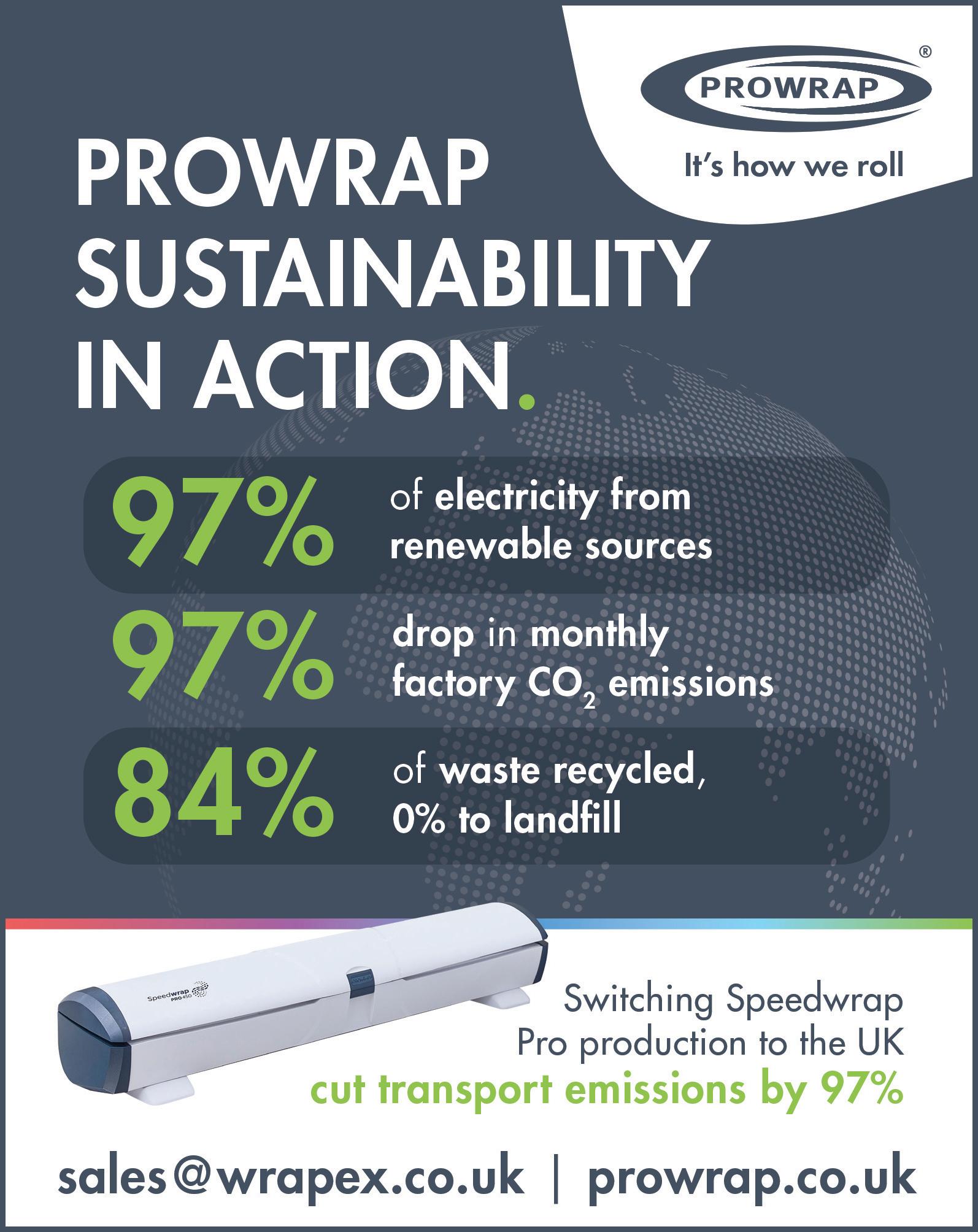
as contributing to environmental targets on carbon reduction, they will save the resort a significant amount of costs in energy consumption.
Low Wood Bay already generates around 12% of its own electricity from its hydropower water turbine fed from a fellside stream. It generated 209,269 kwh of the hotel’s green energy production in 2024, saving around £36,000 in operating costs.
English Lakes Hotels estates director Tim Berry says: “This is another major renewable energy project for the venue and, based on projected annual electricity bill savings, has the potential to have paid for itself within around six years. And the estimates provided indicate savings of over £1.3m over the lifetime of the PV solar panels.

“The environmental benefits are hugely significant too, with around 33 tons of CO2 emissions prevented each year. Over the PV system’s lifetime, that will equate to planting over 6,000 trees – or equivalent to saving on nearly a million kilometres of car journeys or 700 long haul flights.
“Our aim for future years is to be able to run the venue as close to ‘carbon neutral’ as possible, helping to protect the environment as well as significantly reducing our energy and operating costs. A continued drive for innovation will be crucial if we are to succeed, but projects such as these are proof that there is significant return on investment in renewables.”
Low Wood Bay Resort & Spa recently received the nationally recognised Greengage ECOsmart gold award. It is the leading certification system for hotels, hospitality and meeting venues which includes UN sustainable development goals into its benchmarking processes.
‘Kitchen waste’ probably conjures images of spoiled ingredients or leftover meal scraps – but when it comes to sustainability, these are not the only forms of waste that matter. Innovations like the Speedwrap Pro are at the cutting edge of catering sustainability, offering solutions that are smart for the kitchen and smart for the planet.

The Speedwrap Pro is a film, foil and parchment dispenser that uses refill rolls that do not require plastic adapters. These refill rolls are fully recyclable after use, meaning they add up to significant plastic savings over their lifespan. For example, the design can potentially save a large catering business 54kg of plastic over a year – enough to reach a height of 351m if the adapters were stacked on top of each other.
Further environmental benefits are gained through the Speedwrap Pro’s eco-smart construction. Manufactured at our UK facility, which now runs on 97% renewable energy, this innovation delivers high performance with low carbon emissions. Prowrap has partnered with a British injection-moulding company
to optimise production and move dispenser assembly in-house, which has reduced its CO2 emissions by 16,150kg per year – the same as planting 8,000 trees.
What’s more, Prowrap has launched a dispenser recycling scheme to tackle waste far beyond the lifespan of its product. This industry-first scheme sees Prowrap collect old or broken dispensers of any brand, which are recycled and used to create other dispensers and components across the Prowrap Group range. This keeps their materials in use and contributes to the circular economy.
Through the Speedwrap Pro, Prowrap is supporting businesses to think differently about their materials, supply chains and lifecycle impact. With smart design and a greener value chain, this innovation is helping professional kitchens do more with less – creating less waste for a healthier planet.
Visit www.prowrap.co.uk or see the advert on this page for details.


INTRODUCTION
As the UK continues its transition toward greener energy sources, businesses, including hotels, have started to explore renewable energy solutions to drive sustainability and reduce operational costs. Solar photovoltaic (PV) systems have emerged as one of the most effective and accessible options. Harnessing the power of the sun allows businesses to not only reduce their carbon footprint but also gain financial and reputational benefits. This document delves into the advantages of installing solar PV systems for hotels and other businesses operating in the UK.
ENVIRONMENTAL BENEFITS
Reducing Carbon Emissions
One of the most significant advantages of solar PV is its ability to help hotels and businesses reduce their carbon emissions. By generating clean and renewable electricity, solar PV systems replace the need for energy derived from fossil fuels, which are major contributors to greenhouse gases. This transition aligns with the UK government’s netzero emissions target by 2050, offering businesses a chance to contribute actively to the fight against climate change.
Supporting Sustainability Goals
Modern consumers are increasingly demanding environmentally responsible practices from businesses. Hotels, in particular, are under pressure to showcase their commitment to sustainability. Installing solar PV systems demonstrates proactive environmental responsibility, enhancing a business’s green credentials and appealing to ecoconscious customers.
Reducing Energy Costs
Solar PV systems provide a tangible mechanism for reducing energy costs. The electricity generated can significantly offset a business’s reliance on the grid, especially during peak daytime hours when solar generation is at its highest. For hotels, which often operate 24/7, this can lead to substantial savings on utility bills, freeing up capital for other operational needs.
protection against price volatility offers financial predictability, which is invaluable for long-term planning.
Government Incentives and Support
The UK government offers various incentives to businesses installing solar PV systems, such as tax benefits under the Enhanced Capital Allowance (ECA) scheme and opportunities under the Smart Export Guarantee (SEG). With SEG, businesses can earn payments for surplus electricity fed back into the grid, further improving the return on investment.
Energy Independence
For hotels and other businesses, energy independence is critical, especially during periods of grid instability or outages. Solar PV systems ensure a steady and reliable power supply, safeguarding operations and minimising disruptions. Hybrid solutions, when paired with battery storage, make this independence even more robust.
Low Maintenance and Longevity
Solar PV systems are known for their durability and low maintenance requirements. Once installed, they require minimal upkeep, and warranties often cover them for 20-25 years or more. This longevity ensures a consistent return on investment over decades, making them an attractive choice for businesses looking for stable, long-term solutions.

Protection Against Rising Energy Prices
Energy costs in the UK have been rising steadily, creating financial strain for many businesses. Solar PV systems allow businesses to lock in cheaper energy costs by reducing dependence on traditional power sources. This
Attracting Eco-Conscious Customers
In the hospitality sector, customers are increasingly choosing accommodation providers that prioritise sustainability. Hotels with visible solar panels and commitments to green energy practices stand out as environmentally responsible choices. For other businesses, being associated with renewable energy enhances corporate social responsibility (CSR) profiles and fosters customer loyalty.
Enhanced Brand Image
Adopting solar energy sends a powerful message to stakeholders, partners, and consumers. It exemplifies innovation, forward-thinking, and a commitment to environmental stewardship, all of which contribute positively to a business’s brand image. This advantage is


particularly valuable in competitive markets where differentiation is key.
PRACTICAL CONSIDERATIONS
Space Utilisation
Hotels and businesses often have unused rooftop space, which is ideal for solar PV installations. Rooftop solar panels utilise existing infrastructure, maximising energy generation without compromising valuable ground space.

Solar PV systems are highly scalable, making them suitable for businesses of all sizes. For large hotels, extensive solar installations can supply a significant proportion of energy needs. Smaller businesses can start with modest systems and expand them as operations grow.
Mitigation of Seasonal Variations
Though solar generation fluctuates with seasons, pairing solar PV systems with battery storage ensures energy availability even during cloudy days or at night. This makes solar energy a reliable option throughout the year.
For hotels and businesses in the UK, installing solar PV systems offers a wealth of benefits that extend across financial, operational, and environmental realms. From reducing energy costs and achieving sustainability goals to enhancing brand reputation and ensuring energy independence, solar PV is a forward-thinking investment that pays dividends in multiple ways. As the world moves toward greener solutions and consumers grow more ecoconscious, solar PV systems represent an opportunity for businesses to step into the future with confidence.
Whether you're managing a bustling hotel chain or a small local business, the adoption of solar PV systems is a leap toward sustainable growth, operational efficiency, and a greener tomorrow.

As cyber threats rise in hospitality, cyber resilience is now crucial for pubs, hotels and restaurants. Steve Burden, Director of Connectivity & Cyber Security at Wavenet (www.wavenet.co.u), explains why the industry is a growing target and talks through the steps venues can take to protect bookings, payments, guest data and Wi-Fi.
In hospitality venues, the tills can’t stop, the booking systems can’t break and the guest Wi-Fi must always work. Yet, many pubs, hotels and restaurants are now operating under a silent but growing threat: cyber attacks. With high-profile breaches making headlines and ransomware incidents on the rise, cyber resilience has shifted from a ‘nice to have’ to a non-negotiable.
A UK government survey into cyber security breaches found that food and hospitality businesses have traditionally placed less emphasis on cyber risk than other sectors . That’s starting to change. The global industry’s cyber risk score rose sharply from 7.4 in 2023 to a full 10.0 in the first half of 2024 , signalling growing threat levels. As a result, focus is increasing, with 72% of food and hospitality firms now viewing cyber security as a high priority – nearly in line with the UK average of 75% .
However, significant gaps remain. Just 22% of businesses in the sector have a board member responsible for cyber security – one of the lowest rates across all UK industries . With attacks rising and data breaches carrying both reputational and financial consequences, these are red flags the industry can no longer afford to ignore.
Cybercriminals see hospitality as a goldmine. The industry handles large volumes of personal and financial data, including guest names, email address, payment details and loyalty accounts. And it shows: the Hospitality Sector Threat Landscape report revealed that 31% of hospitality businesses globally have experienced a data breach, and 89% were hit more than once in a year. The average cost of a breach? A staggering $3.4 million (or £2.5 million) .
But it’s not just about the money. When IHG was attacked in 2022, operations were paralysed, bookings were lost and brand trust took a hit. The recent Motel One breach saw 24 million files stolen, including sensitive guest information and payment data.
It begs the question: what makes the sector so vulnerable? The hospitality industry is uniquely exposed. Multiple points of entry, such as reservation platforms, payment terminals, third-party vendors and guest Wi-Fi create an attack surface that’s hard to defend.
Phishing and malware delivered by email remain the most persistent and damaging threats to hospitality venues. In just one quarter of 2024, over 932,000 phishing attacks were recorded across the sector, but the tactics are getting more sophisticated. Social engineering, in particular, exploits the natural customer service mindset of hospitality staff, tricking well-meaning employees into clicking links, disclosing credentials or
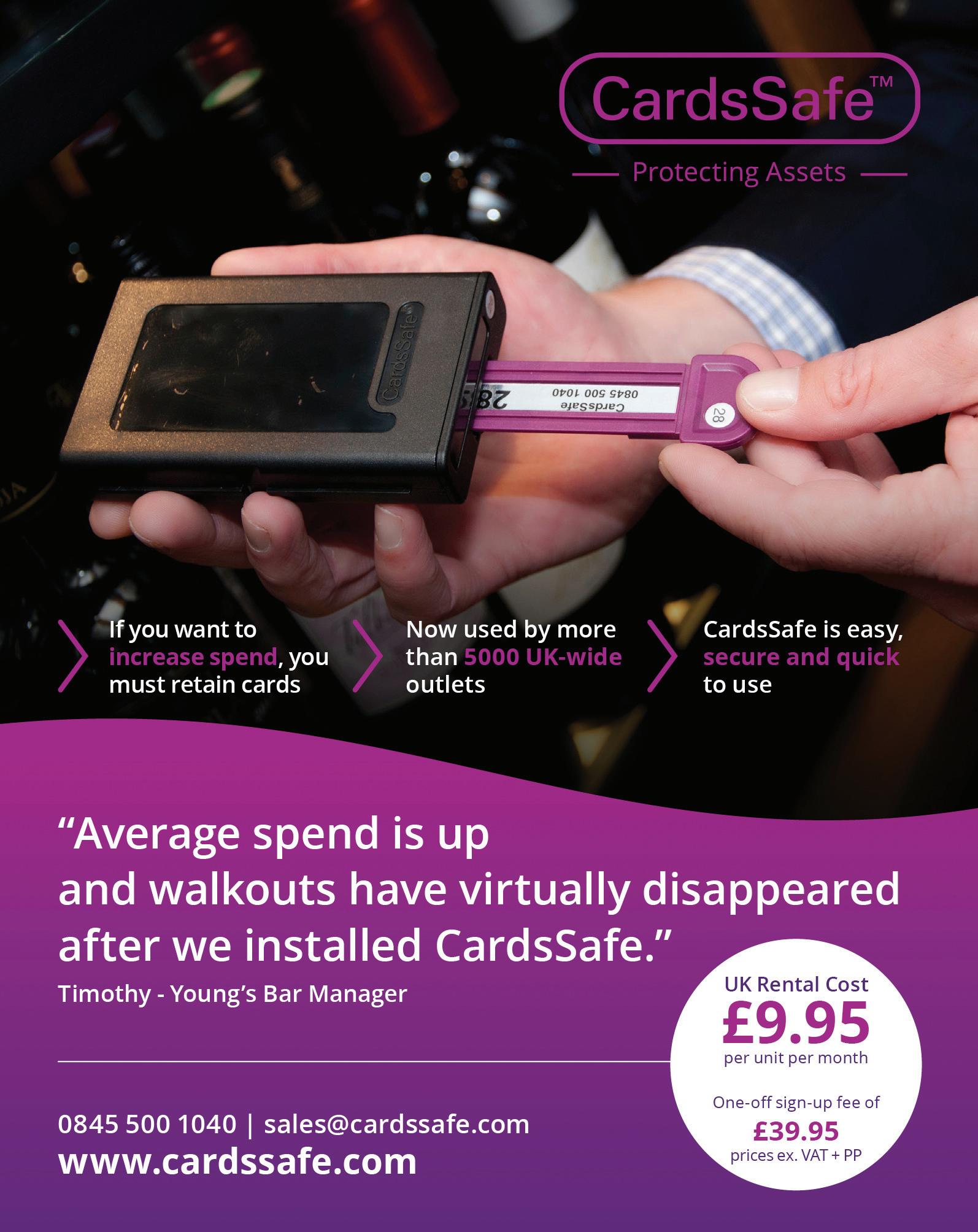
installing malicious software.
The good news is that an in-house IT department isn’t needed to significantly improve your cyber security posture.
First and foremost, training your staff is one of the most effective defences. Regular sessions help create a culture of awareness and caution, and staff should feel confident to double check when something doesn’t seem right. This lack of preparation has consequences: by 2025, Roiback has found that 99% of hotel breaches are expected to result from basic misconfigurations or end-user error.
Backups are another essential safeguard. It’s not enough to back up your booking data, payment systems and POS configurations, but these backups need to be tested to ensure that they can be restored. Ideally, copies need to be both onsite and in the cloud, with test recoveries every quarter to ensure you're covered when it counts.
With that, device protection is critical too. Every laptop, POS terminal, tablet and smartphone should have endpoint protection installed, and guest Wi-Fi should always be segmented from internal systems to limit the damage if a breach does occur.
Controlling access within your systems can also make a big difference. Each staff member should have their own login credentials – shared passwords absolutely need to be a thing of the past – and access should be granted only to the data and systems they need for their role, with logins deactivated as soon as someone leaves the business.
Even without a round-the-clock IT team, basic monitoring can help detect suspicious behaviour early. Regularly reviewing access logs, setting up alerts and using simple monitoring tools can provide vital visibility.
IT’S ABOUT MORE THAN IT
The hospitality sector thrives on reputation, reliability and guest experience. When systems go down, bookings disappear or guest data is compromised, the impact goes far beyond the IT department; customer trust and business viability is damaged as a result.
With cyber threats showing no signs of slowing, now is the time for hospitality businesses to prioritise resilience. Whether you’re managing one venue or a national chain, Wavenet’s experts can help assess your digital risks, secure your systems and support your compliance journey.
In a year when National Insurance increased, bringing more financial headaches for hospitality businesses, there is finally some good news on the horizon. A new social media platform, Me Attend, intends to turn the fortunes of leisure time businesses around by offering new and innovative ways to connect them with customers looking for a great day or night out.
Me Attend is a business web portal and social media app, and was created over five years by tech entrepreneur Tyrone Reid. What makes Me Attend groundbreaking is that it eliminates the most persistent pain point of socialising - wasted evenings not knowing where to go or when to go there. Me Attend subscribers - your customers - will reclaim both their time and money through use of the app’s intelligence and live time updates.


transforming their entire day or night out. And businesses can take back control of their marketing by having a presence on a social media platform designed purely to showcase the best events, venues and foodie destinations for those key leisure moments.
Catering, leisure and hospitality sector businesses can reach this new customer base by signing up to the business web portal on Me Attend, and benefit from Me Attend’s distinctive marketing - only available via the app. Me Attend shows new and potential visitors comments, reviews, pictures, videos and even live streams from your premises – and each business can make a stream of revenue from this, that can grow week on week.
The benefits are simple but revolutionary: app users never have to waste another night out. They make
As Tyrone Reid, Me Attend’s Founder, puts it; “Me Attend is going to be revolutionary for the leisure and hospitality industry. I honestly think we can change the way businesses and customers engage, and do this in a way that will increase business revenue and make everyone involved happier too. A win-win all round.” Me Attend is free to all customers to download and use, though businesses will have to register and subscribe to join the app.

A special introductory rate for CLH readers that sign up before 31 August 2025 is now available. To find out more please email sales@meattend.com or visit www.meattend.com/signup
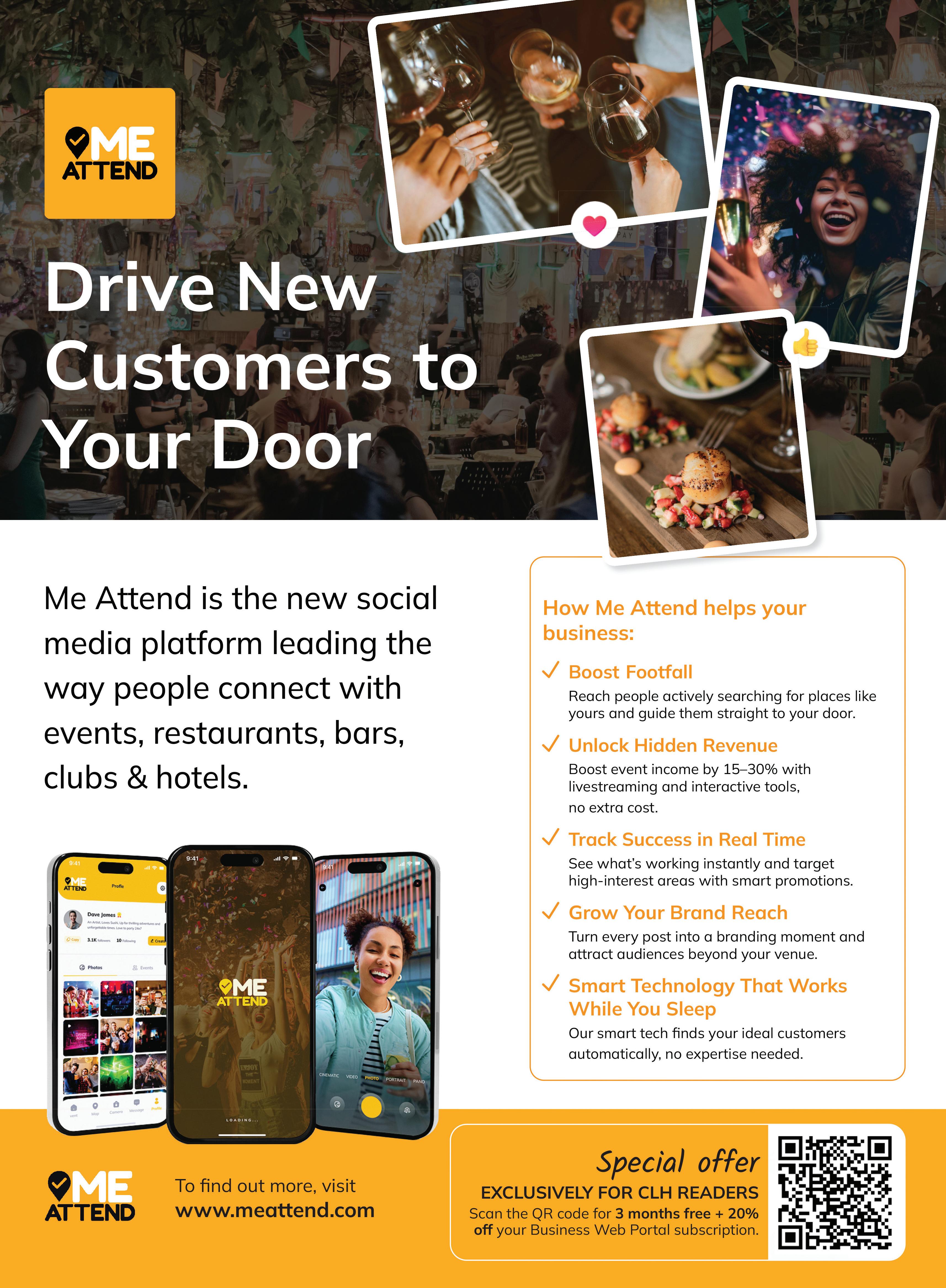
By Joanne Gilliard, CEO of Jangro (https://www.jangro.net/)

Hygiene is non-negotiable in hospitality, from protecting guest health to shaping first impressions and maintaining customer trust and loyalty. Joanne Gilliard, CEO of Jangro, the UK and Ireland’s largest network of independent janitorial distributors, shares forward-thinking best practices to help venues lead with hygiene.
It’s often said - half in jest but rooted in truth - that you can judge a place by the cleanliness of its bathrooms. Nowhere is this truer than in hospitality. Hygiene and cleanliness isn’t optional and it isn’t just about how a place appears, it’s a foundational pillar of public health, safety, trust and long-term profitability. CONSISTENCY IS KEY
In hospitality, hygiene depends not just on having the right products but on using them correctly and consistently. Disinfectants must stay on surfaces for the recommended time to be effective, especially on high-touch areas like door handles, lift buttons and payment terminals.
In kitchens, correct cleaner use and frequent handwashing protect food safety. Front-of-house, low-scent, streak-free products keep spaces clean and guest-friendly. In allergen-sensitive spaces, fragrance-free products help ensure guest safety and comfort.
With the right approach, hygiene contributes to a more seamless, professional and trusted environment.
More than ever, hygiene is a key part of sustainability strategy. It can be used to drive progress against ESG goals, reduce waste and build brand credibility. Many operators are now embracing closed-loop cleaning systems to minimise chemical and water usage, switching to recyclable or refillable packaging, and publishing hygiene and sustainability policies. In a sector where guests and clients are increasingly making values-based decisions, this kind of visible leadership sets venues apart.
Beyond cleaning, guest-facing hygiene measures are essential. Installing hand sanitiser stations at entry points, dining areas and communal spaces reinforces a culture of cleanliness, while maintaining well-stocked soap dispensers in all bathrooms and kitchens for staff ensures basic hygiene.
Post-pandemic, guest expectations are higher than ever. Initial Hygiene’s Global Reset Report, conducted after the COVID-19 pandemic, found that 74% of people are now more concerned about how others' poor hand hygiene could impact their health than they were before the pandemic.
The smartest operators are responding by incorporating touch-free technology, like sensor-activated taps and automatic soap dispensers, to help reduce shared surface contact and lower the risk of contamination. These features don’t just reduce risk and help create a safer, more reassuring
The Dose Easy cleaning concept from Zep introduces the Dose Easy cap, delivering a 20ml dose with each tilt of the bottle, controlling chemical usage and helping your team to optimise cleaning results, whilst you start saving immediately. Dose Easy can also be dispensed via traditional wall mounted dosing systems as well. The high-concentrate Dose Easy products from Zep UK require a low dosage, with maximum results, at an extremely low cost per use, be they dispensed manually or through the dosing system.
environment for both guests and staff, they also build trust – and trust drives bookings.
HOW TO ENGAGE STAFF IN UPHOLDING HYGIENE STANDARDS
While product use and implementation are important, maintaining high hygiene standards begins with well-informed and engaged staff. Regular training sessions should go beyond basic protocols, explaining the why behind each hygiene measure so staff understand their role in protecting themselves, their colleagues and customers.
Clear staff training is vital - covering dilution ratios, storage and safe use. Misuse can reduce effectiveness and pose health risks. Visual aids, colourcoded zones and clear labelling help ensure the right products are used in the right places.
Interactive workshops and real-time demonstrations also boost retention and encourage compliance. Recognising and rewarding good hygiene practices reinforces their importance. By involving staff in developing and refining procedures, businesses can foster a culture of accountability and pride in maintaining a clean, safe environment.
MAINTAINING HIGH STANDARDS
In hospitality, hygiene isn’t a background task, it’s a core pillar of guest experience, safety and business success. From selecting the right products to training staff and embracing touch-free innovations, every detail counts. By prioritising spotless standards, hospitality venues not only protect health but also build trust and lasting loyalty with guests.
and dishwashing with simple-to-use, differentiated products in distinct pack colours and a clear numbering system.

Dose Easy concentrated cleaning products offer optimum economic usage via compact packaging, thereby reducing transportation and storage; ensuring lower CO2 impact and less waste. The comprehensive range delivers a solution for all your institutional cleaning needs, throughout kitchens, bathrooms, washrooms and other public areas.
The Dose Easy range spans disinfectant, sanitary ware cleaning, floor cleaning, glass, multi-surface, bathroom
The Dose Easy Cap offers smaller sites, a compact range of cleaning consumables that are easily stored, without the need for bulky dispensing equipment. However, for the larger facility, Zep can offer a range of controlled dosing systems which connect simply with your water supply and help manage your consumable usage levels, and so, consistently control your costs, even with larger cleaning teams. The Dose Easy cap and the Dose Easy wall mounted systems are easy to operate for staff, consigning overdosing and method errors with cleaning chemicals to be a thing of the past.
To see the Dose Easy range, follow the link: https://zep.co.uk/product/search.asp?P=dose or send Zep UK an email to info@zep.co.uk or call 0151 422 1000 to speak with a local representative.


As the busy holiday season fast approaches, UK hoteliers, holiday let owners, and B&B operators are being urged to prioritise Legionella risk control as part of their summer readiness plans – following reports that UK cases have reached an all-time high.
Legionnaires’ disease is a potentially fatal lung infection caused by inhaling droplets of water containing Legionella bacteria. It can be found in a range of man-made water systems including taps, showers, air conditioning units, spa pools and hot tubs.
In the most recent government statistics, there were 604 cases of Legionnaires’ disease reported in 2023 across England and Wales – the highest annual figure seen in the UK to date and significantly higher than the 488 reported in 2017.
Legionella, the bacteria that causes Legionnaires’ disease, thrives in stagnant water, particularly in temperatures between 20°C and 45°C – common in unused or little-used water systems. The risk is particularly high in hotels, B&Bs and holiday lets that may have been vacant or experienced intermittent use during off-season. According to statistics, global hotel inoccupancy rates were as high as 32% in May 2024.2
With this, Hydrosense, the UK’s leading authority in rapid Legionella testing technology, is urging the sector to pay due diligence to increasing Legionella risk – especially the effects of dormant water systems – as an absolute safety priority in preparing for peak season.
“As bookings ramp up for the busy summer season, it’s crucial that hoteliers, holiday let owners and the like don’t overlook the importance of ensuring a robust approach to water safety,” said Greg Rankin, CEO at Hydrosense. “Legionella bacteria can build up quickly in

Hygiene should be a top priority for all businesses, especially those that regularly host and feed the public. But in many cases, and particularly for larger hospitality settings, achieving good hygiene efficiently can seem like a struggle. Settings can have many washrooms, and multiple systems can be difficult to maintain. For restaurant owners, it may not be apparent that hygiene maintenance and stocking of hygiene products throughout the facility can often be as complex as food operations, and equally as important to maintain. Without the appropriate protocols in place, catering settings run the risk of reputational damage and fines. It is, therefore, crucial for operators to invest in the most up-to-date systems to maintain and attract customers and boost environmental credentials.
EFFICIENT
Clean front-of-house and washroom facilities should be a top priority to encourage repeat visits and maintain guest satisfaction. But in many cases, the number of washrooms in a facility can pose a challenge, so it’s no surprise 71% of cleaners wish their washrooms were easier to restock1
The key here is to reduce the refill frequency. By using solutions such as the Tork Xpress® Multifold Hand Towel System, caterers can free up staff time and improve the guest experience. In fact, the system means you can serve twice the number of guests before needing to refill.2
In a busy catering environment, staff often must perform various roles, such as taking orders, serving food
stagnant or underused systems, especially during warmer months – creating the perfect conditions for bacteria to grow. Taking action now – flushing systems, checking temperatures, carrying out risk assessments to incorporate rapid Legionella testing, can make a big difference in keeping guests safe and properties compliant.”
Under UK health and safety law, all property owners and duty holders are responsible for identifying and controlling the risk of exposure to Legionella including hoteliers, B&Bs, holiday let owners and managers.
Along with regular maintenance, frequent flushing, and risk assessments, Hydrosense asserts there is also a clear case to incorporate regular rapid Legionella testing – which can detect Legionella in just 25 minutes – as part of any water safety regime.“The reality is that Legionella cases in the UK are rising at unprecedented rates. As with most health risks, prevention is far easier – and far less costly – than dealing with an outbreak and becoming another statistic. Incorporating rapid Legionella testing into their peak season preparations empowers hospitality operators to minimise potential exposure, gain peace of mind, and preserve their reputation with every stay."
Unlike conventional culture-based methods which can take days, modern rapid Legionella testing solutions can deliver results within minutes. With real-time data to assess contamination levels, users are able to implement corrective measures quickly should a risk arise, ensure compliance with health and safety regulations and provide peace of mind for the customer - especially in high-turnover environments like hotels, B&Bs, and holiday lets.
For further information please visit: https://hydrosense-legionella.com/
and drinks, and welcoming guests. As a result, cleaning can fall down the priority list for many as staff struggle to juggle tasks and instead, understandably, prioritise customer-facing requests. Ensuring your facility has the efficient cleaning systems in operation allows staff to target their cleaning efforts to areas that matter, freeing up time to do what they do best: provide a welcoming and warm environment to guests.
To help educate restaurateurs on improving cleaning practices, Tork Workflow™ for Restaurants is an expert consultation designed to reduce interruptions, increase efficiency and maintain a hygienic environment across all aspects of a restaurant’s operation. In fact, over three-quarters of kitchen staff would be happier if their workplace were more organised.3 Training staff on the most up-to-date cleaning practices is one of the most important responsibilities for a manager, to ensure everyone takes responsibility for hygiene.
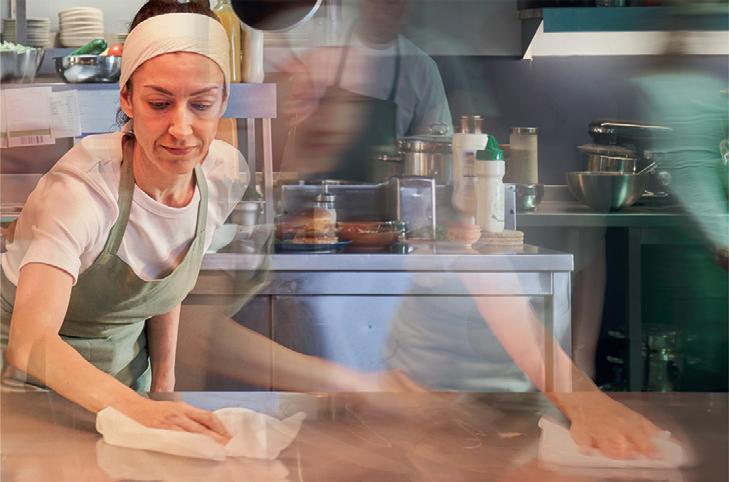
Prioritising hygiene isn't just about cleanliness—it's about protecting your business, your staff, and your customers. By investing in efficient systems and smart workflows, hospitality businesses can create safer, more welcoming environments that keep guests coming back.
torkglobal.com/gb/en/foodservice
1
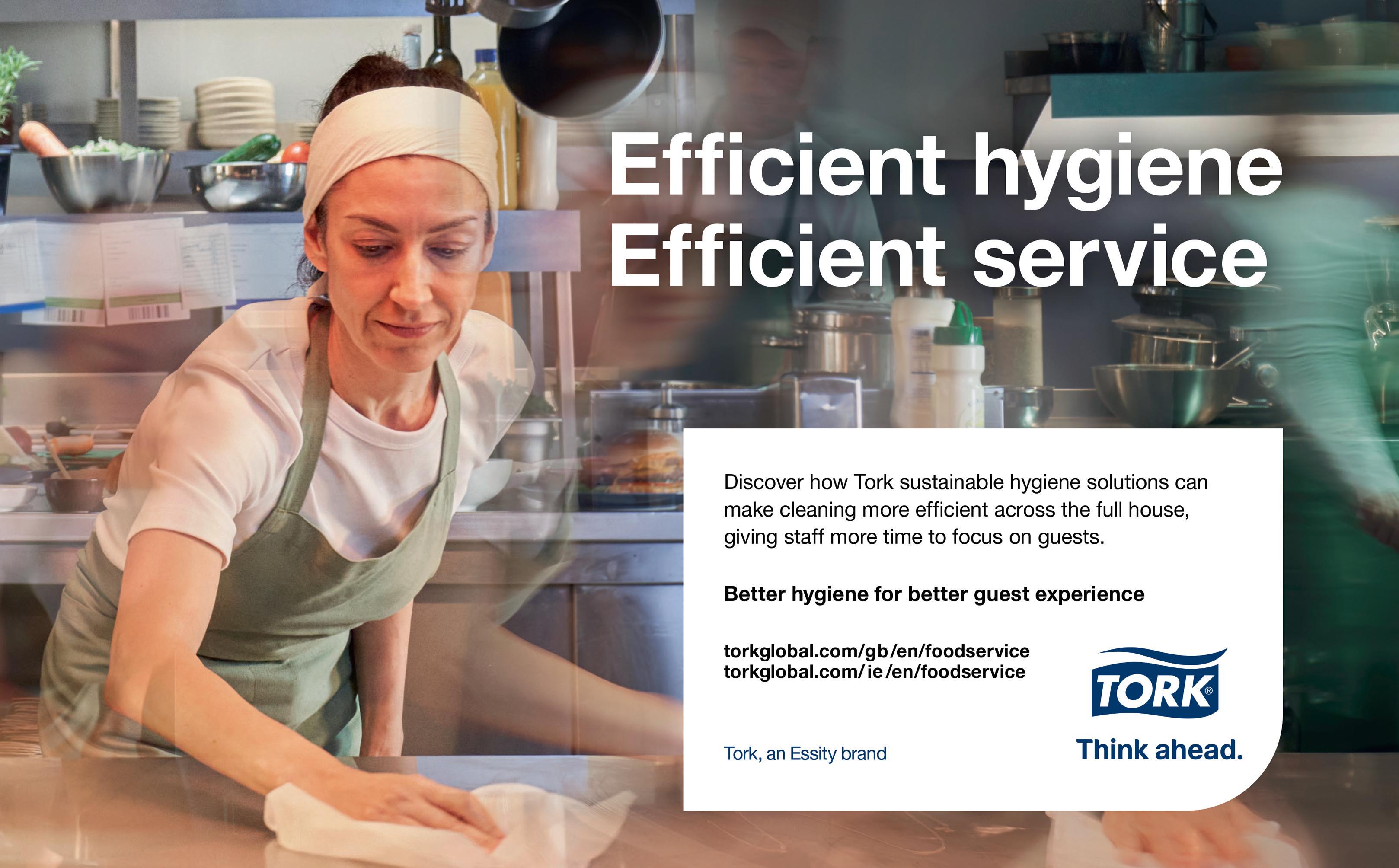
In today’s hospitality landscape, first impressions count. Guests expect visible cleanliness, quick turnarounds, and seamless service. For front-of-house teams, traditional spray-and-cloth methods just can’t keep up. That’s why many are switching to ready-touse sanitising wipes, and not looking back.
Reusable cloths, even when laundered regularly, can harbour bacteria and spread germs. During busy service, it’s easy to lose track of what’s been sanitised. Ready-touse wipes remove that uncertainty. Each one is fresh, pre-dosed with the right amount of solution, and disposed of after use, minimising cross-contamination and boosting hygiene confidence.
They also save time. Whether you're resetting tables, wiping menus, or cleaning card machines, wipes are faster and more convenient. No need to juggle bottles and cloths, just grab, wipe, and go. It’s efficient, consistent, and ideal for high-pressure environments. Introducing Sani Professional – The No.1 Foodservice Wipe Brand

And when it comes to sustainability, there’s no need to compromise. Innovations like Protect 360° biodegradable sanitising wipes are 100% plastic-free, plant-based, and packaged in recyclable materials, helping venues stay green while staying clean.
“These wipes are thicker, more effective, and even gentle on my skin. No
no irritation, and perfect for quick cleans during events when time’s tight,” says Debbi Scobell, Hospitality & Events Coordinator at Forest Green Rovers, the greenest football club in the world.
In a sector where hygiene and perception go hand in hand, ready-to-use wipes help teams deliver visible, effective cleaning, quickly and responsibly.
Request your FREE samples today!
�� samples@sanipro-intl.com

PDI EMEA Ltd
A: Pywell Road, Willowbrook East Industrial Estate, Corby NN17 5XJ, UK
T: +44 (0) 8081 697 945
�� pdi-intl.com
�� hello@sanipro-intl.com

Rotowash machines are among the most robust and efficient floor cleaners available in the UK. Designed to handle all flooring types, they vastly outperform traditional rotary machines. Their patented brush system reaches deep into uneven surfaces like grouted tiles, studded rubber, matting, and even escalator steps, while also excelling on flat floors such as vinyl, wood, and terrazzo. On carpets, they clean, lift the pile, and leave the surface dry in minutes.
Health and safety is central to our approach. We provide free training to all operators for the machine’s lifetime to ensure safe and effective use, protecting both users and the machine’s longevity. Our SafeContractor SSIP accreditation reflects our commitment to high safety standards.
Rotowash machines are also extremely environmentally conscious, using up to
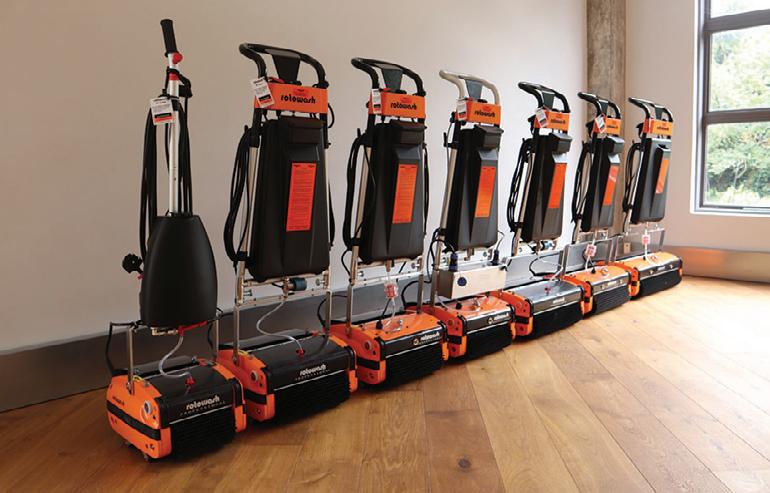
90% less water and chemicals than conventional alternatives making them a sustainable choice for any business.
Our customer relationship doesn’t end at the point of sale. Through our dedicated service department and nationwide team of engineers, we offer a Preventative Maintenance Agreement (PMA) that includes planned service visits every five months and covers callouts and labour for emergency repairs.
Looking ahead, we have undergone a recent digital transformation, adopting online purchasing and smart innovative online tools including an interactive savings calculator to help businesses to make more informed, cost-effective decisions. For further information visit www.rotowash.com or see the advert below.
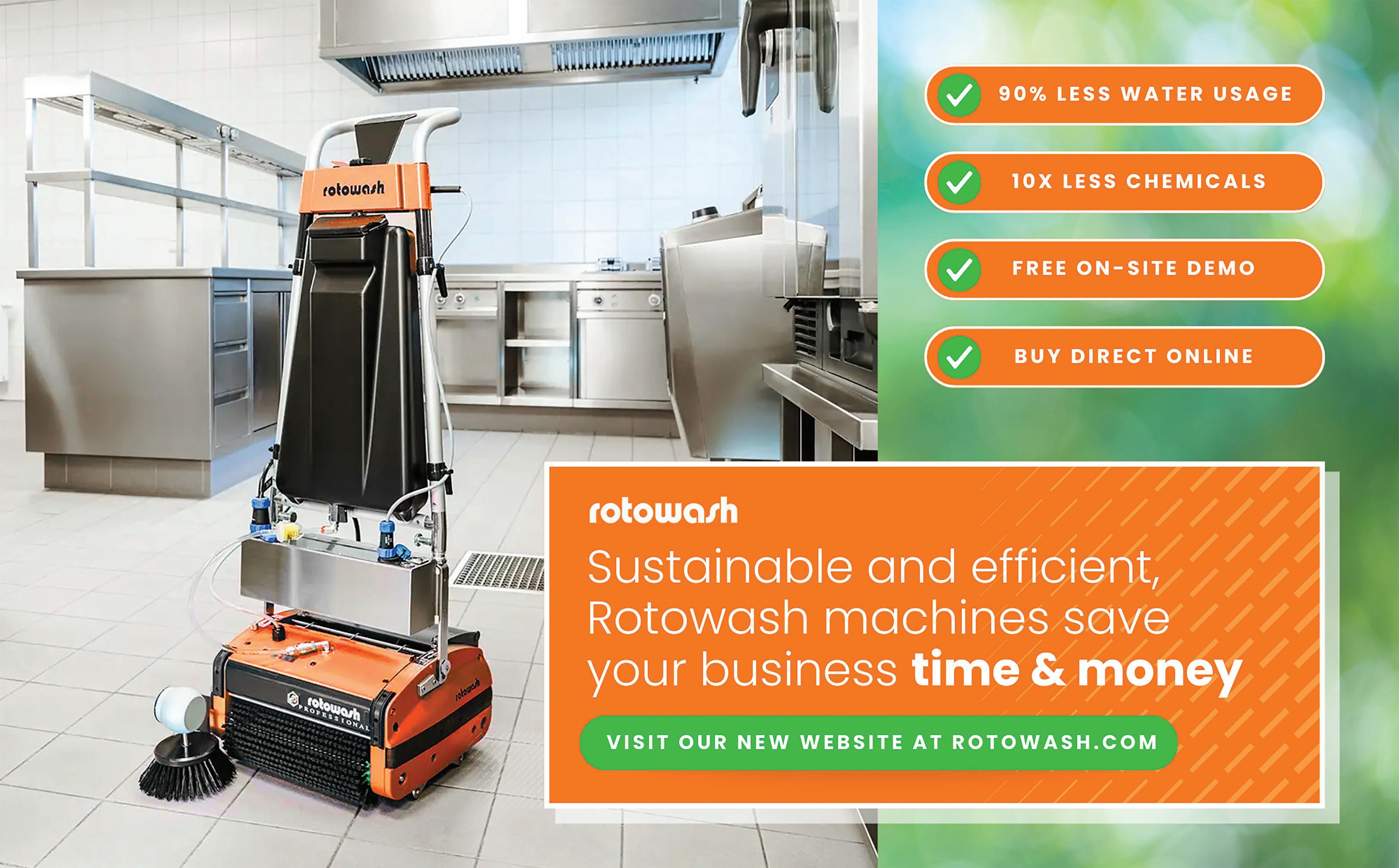

A badly poured pint can ruin a customer’s experience. It creates unnecessary waste and costs you in revenue. There is a way to avoid it, says Avani Solutions.
Imagine the scene a warm summers day, not a cloud in sight. You’re enjoying a stroll and come across a pictureperfect pub, - a pint beckons!
You arrive at the bar ready for that thirst-quenching mouthful. Except it’s poured a little haphazardly, nozzle in the liquid, beer sloshing over the top and spilling down the sides, - the head, lost in the drip tray. A flat pint is thumped on the bar, with the barperson’s hand gripped tightly right at the point you would sip from. The pint isn’t served in branded glassware, in fact you are not even sure if its clean. Suddenly, your excitement is gone, the experience 100% ruined.
On the other side of the bar is a bartender, not in the job very long and covering for the summer. They know the basics and feel they’re delivering as they should. They know no better.
The manager, who does know better, is out the back oblivious to what has just occurred because they are in the cellar attending to a delivery.
The consequences look like this…
Adams Gas are specialist bottled gas distributors and suppliers based in Kent. We have been distributing bottled gas throughout the UK via our large stockist network, for over 25 years.
We offer a local delivery service for bottled gas in Kent, East Sussex and South London.

Adams Gas can offer a cost-effective beer and cellar gas solutions for all small, medium and large businesses looking for a better bottled beer, pub and cellar gas services.
With our own cylinders filled at our own filling depot, you can count on us as gas suppliers to offer the right service, at the right price, when you need it. We can also offer this product on a re-seller basis to breweries, beer wholesalers and shipping companies throughout the UK.
We also Supply:
• Food Grade Co2 gas cylinders for Coca-Cola Frozen, Fanta Frozen, Tango Ice Blast, and Slushy Jack’s frozen drinks machines
• CO2 for Glass Frosting. Food grade liquid Co2 for instantly cooling glasses Simply attach your machine to our cylinder for fast effective delivery of food grade Co2 strait into your glass!
Adams Gas have been proud bottled gas suppliers to the UK for over two decades. We endeavour to provide our customers with premium quality gas to best suit their requirements.
You can discuss your queries with us by phone on 01843 220 596 or free phone 0800 195 4445 Alternatively, you can send an email to sales@adamsgas.co.uk or simply fill out and submit our online contact form and a member of our team will be in touch as soon as possible. We look forward to hearing from you.
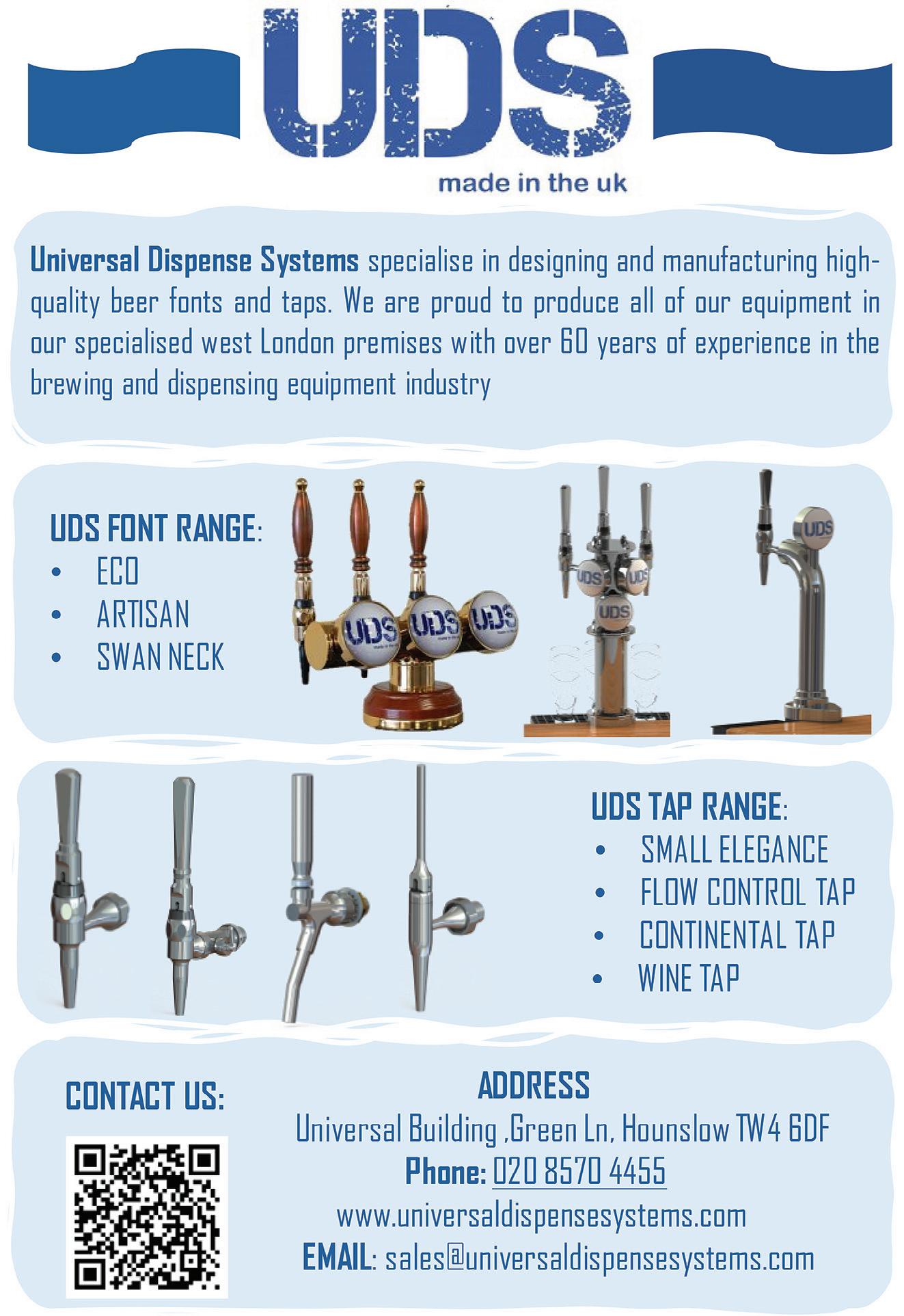
You won’t be back, did not finish your pint. Not wanting to make a fuss, you didn’t say anything to the bartender.
All in all, you, the customer have been let down. The pub has lost out.
The worst part is that the pub staff are unaware of what just happened.
If the pub manager tracked the waste, they would know something was wrong. This was not the first sloshy pint served, in fact, bar staff would empty drip trays more than once a day.
By tracking the waste, they could quantify what they’re losing. They are losing 6% of beer in 3 of every 4 pints served,
This venue serves 3,000 pints on an average month. That’s 2,250 resulting in waste and at 6% its costing them £4,649.40 per year, ensuring they lose £10,530 in revenue*.
What a horrible scenario.
Could it be avoided? 100% YES, with the Avani WasteWatchers!® Workshop
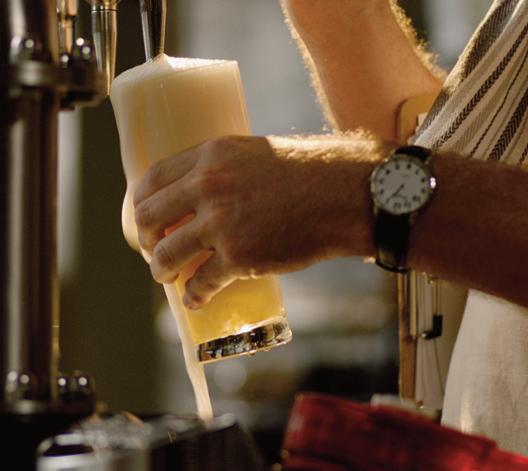
The WasteWatchers!® training initiative, supported by the BII and UKHospitality, offers low-cost, on-site training for bar teams that teaches how to deliver the Perfect Pint and best customer experience, all whilst reducing both waste and cost and improving sustainability. It’s a win-win.
Head to www.avanisolutions.co.uk/wastewatchers and
costs NOW.
Whilst we know not every venue is a

With over 60 years experience of UK manufacturing for the beverage dispense industry, Universal Dispense Systems (UDS) have an unrivalled reputation in the design and manufacture of a large range of dispense fonts, taps and beverage dispense systems which are designed and manufactured in the UK and exported worldwide.
From the clean lines of the Eco Tube Font to the hand-crafted Artisan range of fonts, there is something to fit every theme and concept. If you require a bespoke font, we are able to create customer specific
designs to meet your requirement and these are available in a full range of finishes and branding options.
Our range of fonts have been specifically designed and hand-crafted at our London based manufacturing facility to meet the ever-growing need for brands to stand out from the crowd. Reflecting the heritage of both established and craft beer brands along with providing stylish fonts that are at home in today`s marketplace.
Our range of stainless-steel taps are available in free flow or with flow control capabilities. All our taps are precision engineered using the highest quality materials and manufactured at our purpose-built engineering facility in London.
Contact us here for more information or a quotation- sales@universaldispensesystems.com
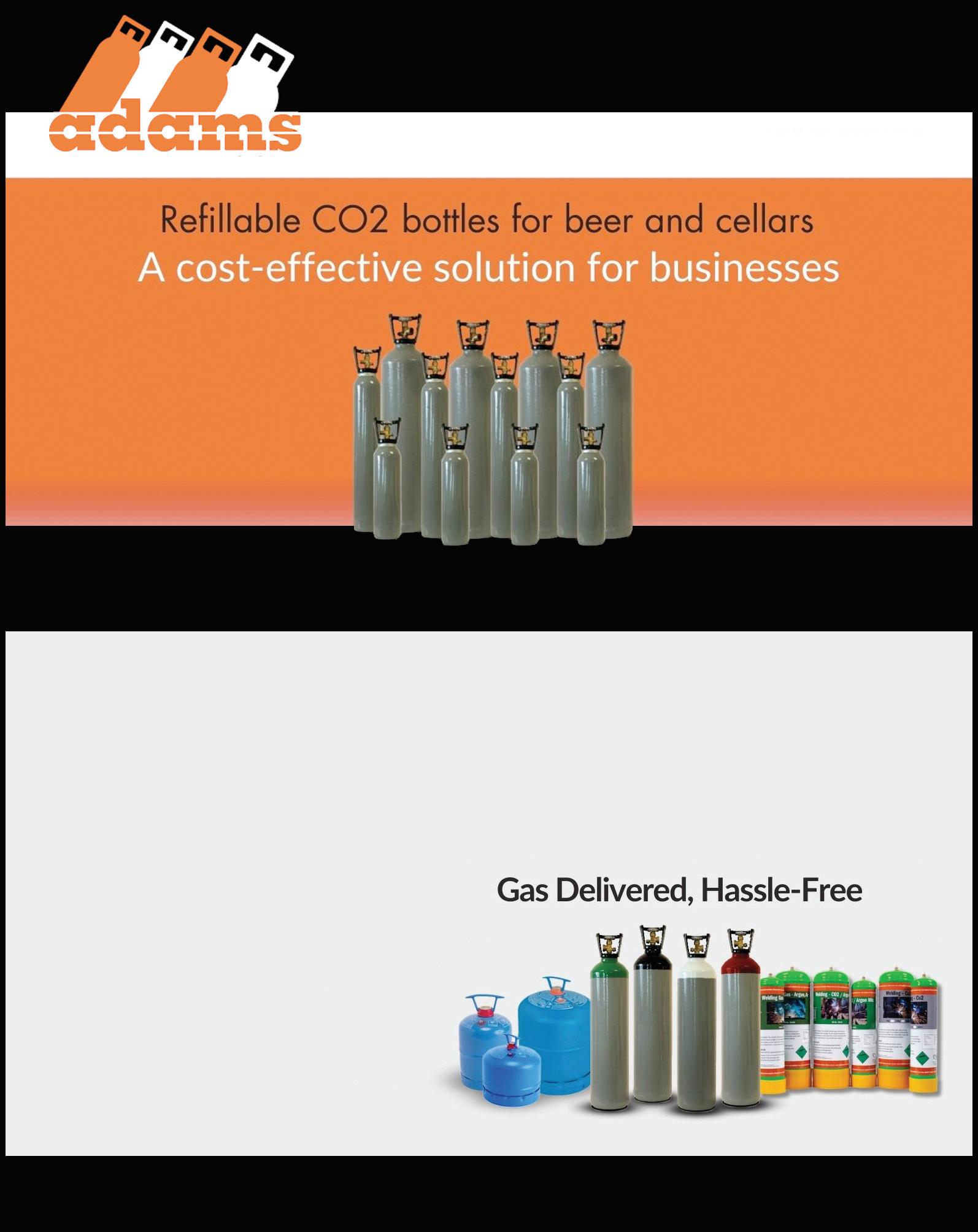
CaskWidge Cellar Equipment Ltd was established in July 2000. Making this year our 25th anniversary. We are the original floating system for the upright dispense of Cask Ales. serving great cask ales – hassle free. When only the BEST will do!

For a quarter of a century, we've been proud to serve the British brewing community, delivering top-quality, British-run and manufactured cellar equipment to ensure your cask ales are poured to perfection, every time.
The CaskWidge is an upright dispense system that has a flexible pipe with a floating filter attached that draws the beer from near the top of the cask. The floating filter (Float Head) sits below the 'top break' and follows the beer down until it reaches the bottom of the cask. By taking beer from below this sub-surface layer, any oxygenation and contamination is prevented
from spreading down into the beer below, keeping the beer in its best condition.
Why choose the CaskWidge system?
Optimal Dispensing Quality – ensures perfect, consistent pours of your cask ales every time. Easy Installation & Maintenance –designed for a hassle-free, fit and forget set up, saving you time and money. Innovative Design – as the original upright dispense system, our unique design maximises space efficiency in your cellar, eliminating the need for racks or hoists. Long-Lasting Durability – build to last, offering reliable performance year after year, even in the most demanding environments.
Here at CaskWidge we pride ourselves on quick delivery times and friendly service, so please head to www.caskwidge.com to place your order today. If you need any guidance or assistance, please email us at info@caskwidge.com or call 08453707606.
EASYRACK is a leading supplier of high-quality cellar handling equipment and cask racking solutions designed to improve efficiency and safety in your brewery, pub, or beverage storage facility. We provide a wide range of products, from keg handling and cask racking solutions to drop mats and more.
We understand the unique challenges of cask racking and cellar management. That’s why we offer durable and reliable equipment to optimize your operations, including:
• Cask racking systems: Maximise your cellar space and ensure safe storage of your casks with our robust racking solutions.
• Freestanding Autotilts: Insure full usage of barrel contents so nothing is wasted!
• Keg handling equipment: Effortlessly move and man-
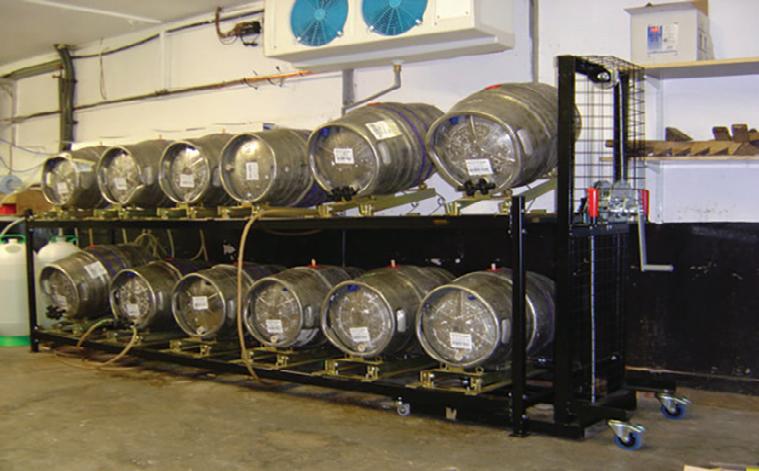
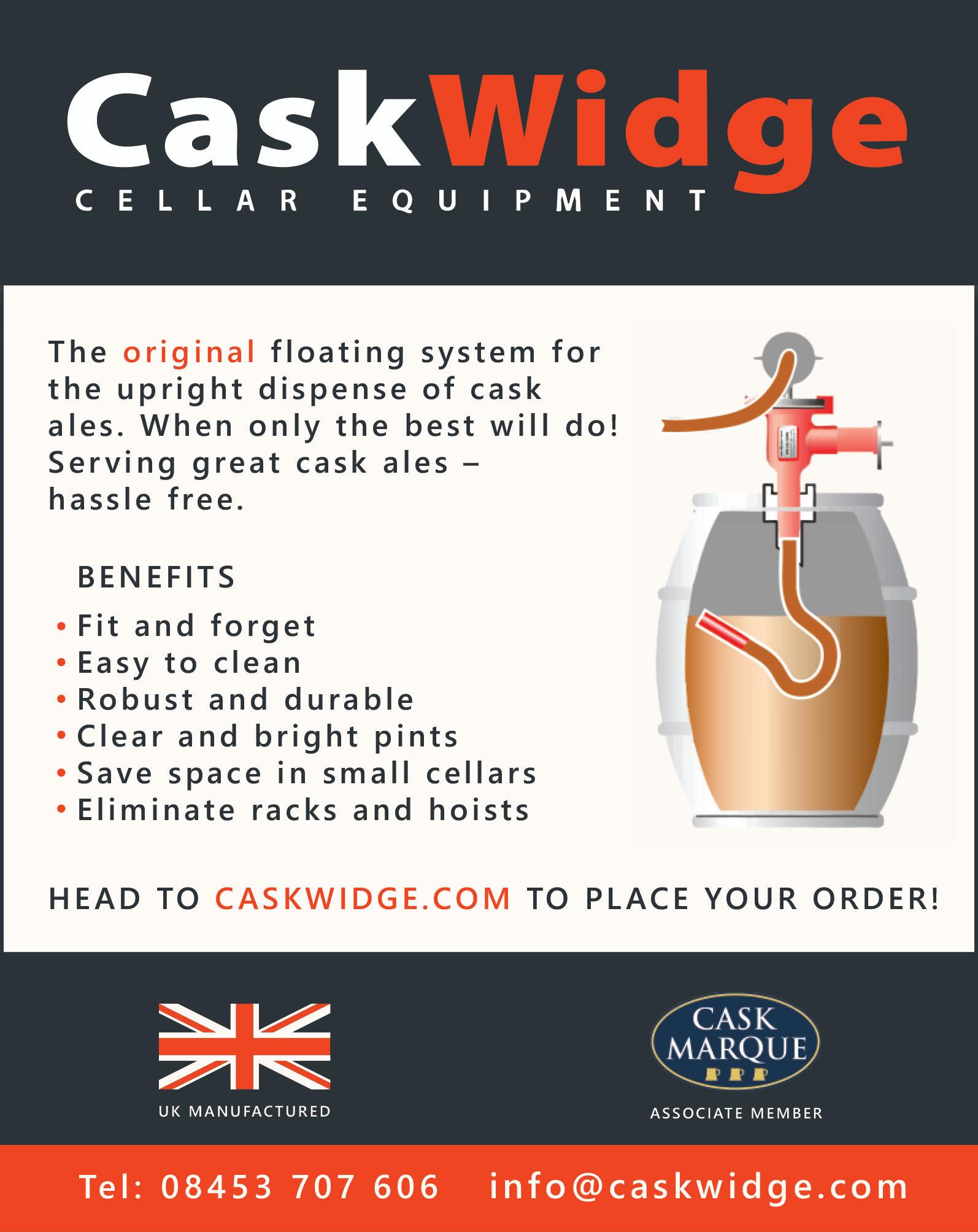

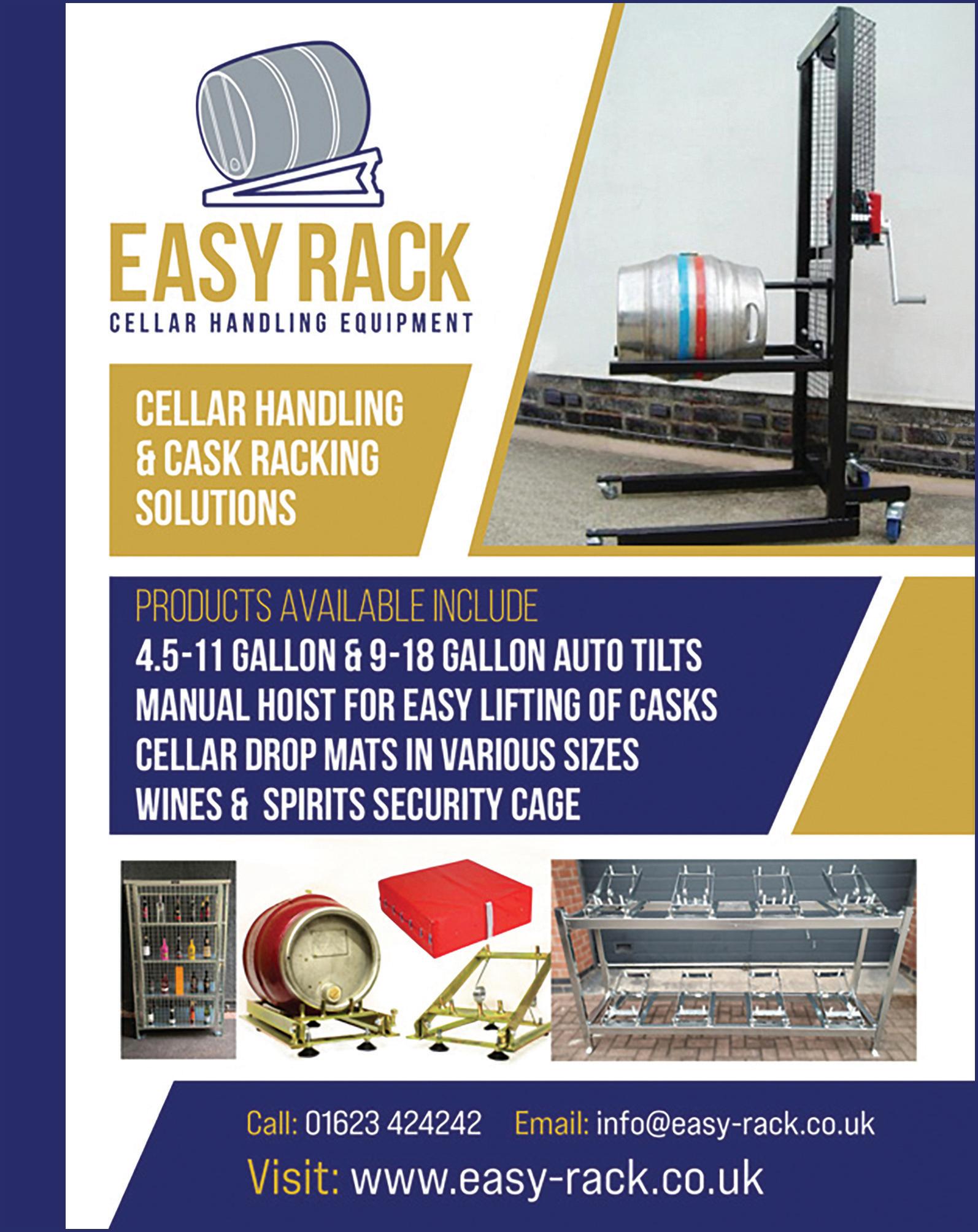
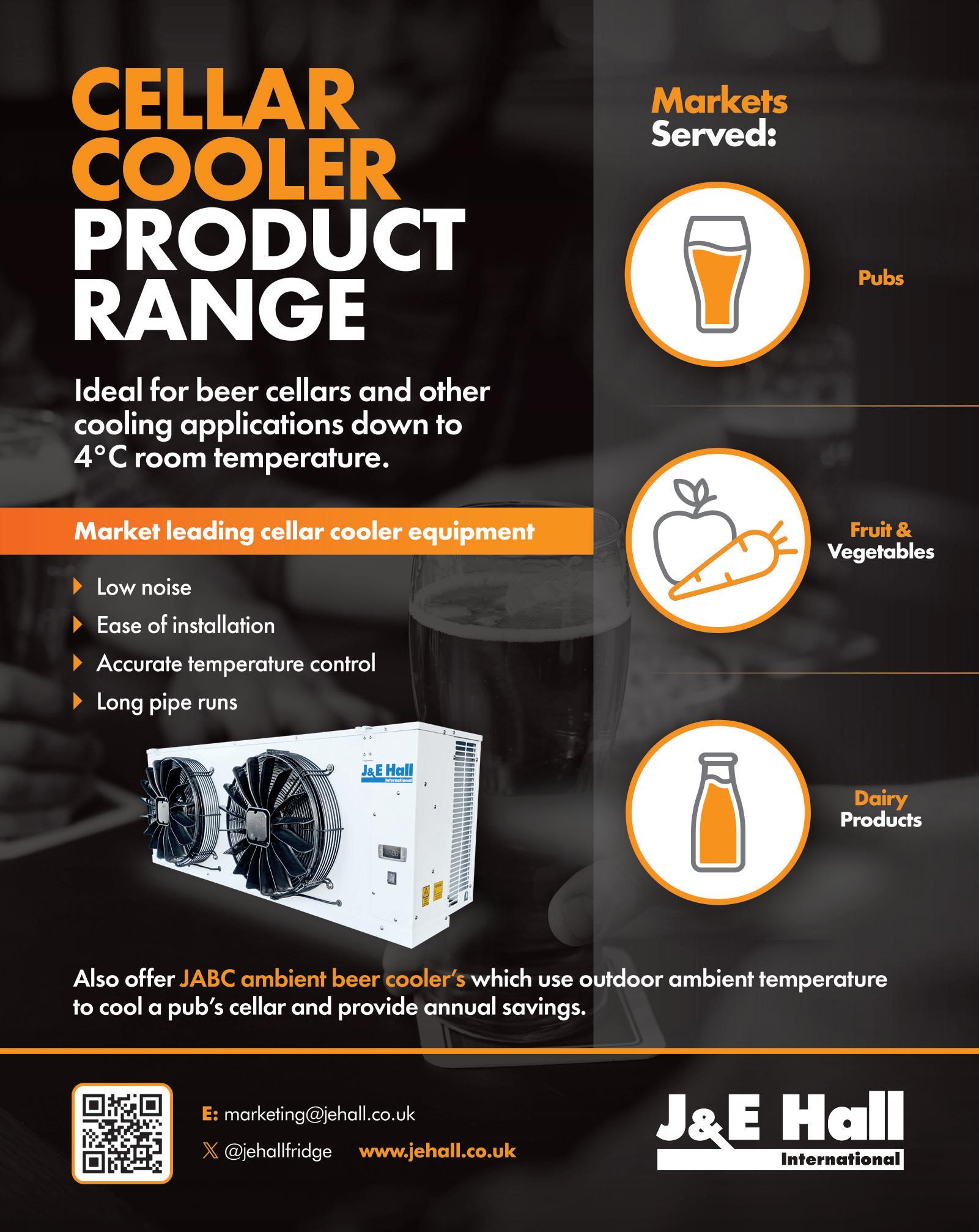
While games such as axethrowing, crazier golf and augmented reality darts are proving to be a major draw, quality food and drink also contribute to a formula with a multi-generational appeal.
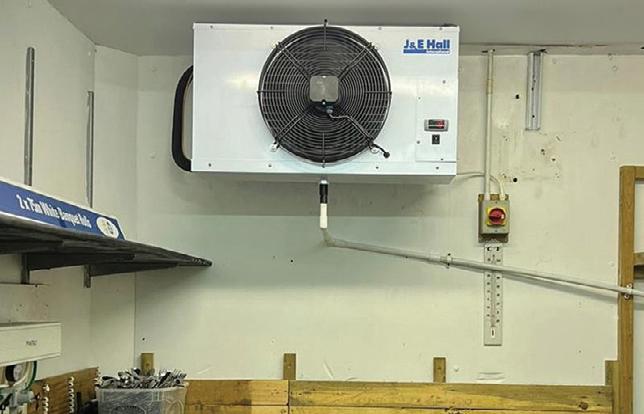
The business opened its first venue in Norwich in December 2020 and has grown steadily since. Boom Battle Bars are a high-volume business serving a lot of draught refreshments, so quality cellar cooling is essential. Having a very good cooling system for the customer-facing area is critical to the experience that the customers expect.
Heat Recovery (HVAC) has installed J&E Hall cellar cooling equipment in a dozen venues so far. Co-owner
Mike Higginson says: "In mid-2020 I had a call from one of the Boom Battle Bar designers who I had done a lot
of work for over the years –presenting a great opportunity.
We became involved in work at the Liverpool bar in late 2020 during lockdown and it all went on from there. We have installed J&E Hall cellar cooler equipment of varying sizes and specifications in a dozen venues so far. The units are good quality, easy to use and maintain. They are a very good product for the price range."
Ideal for beer cellars and other applications down to 4°C, J&E Hall’s complete range of cellar coolers provide a cost-effective and reliable solution to maintain specific temperatures required for beer and wine cellars.
Boom Battle Bars is the market leader in a new entertainment concept, competitive socialising, offering games including American shuffleboard, augmented reality darts and axe-throwing as well as conventional pool and beer pong.
See the advert on this page or visit www.jehall.co.uk for details.
Summer drinking habits may not be changing dramatically - crisp whites, delicate rosés and sparkling wines remain seasonal staples - but we’re seeing a noticeable shift toward wines that are fresher, lighter and more mineral-driven.
High-acid, ultra-refreshing styles like Albariño are increasingly popular, while New Zealand Sauvignon Blanc, with its zesty citrus and herbaceous punch, continues to be a key sales driver, especially as pricing becomes more competitive.
Provence Rosé remains a firm favourite, but customers are exploring further afield. We’re seeing growing interest in terroir-driven pink wines beyond the usual names, helped in part by rockstar rosé brands like Whispering Angel elevating the category. Provence rosé’s crisp acidity and subtle fruit notes make it an incredibly food-friendly choice, pairing beautifully with seafood, grilled chicken or summer salads.
Alfresco menus often focus on lighter, fresher dishes, think grilled fish, chicken, seasonal veg or plant-based options. Choosing the right wine to match can elevate the entire experience. Here are two perfect pairings from our range:
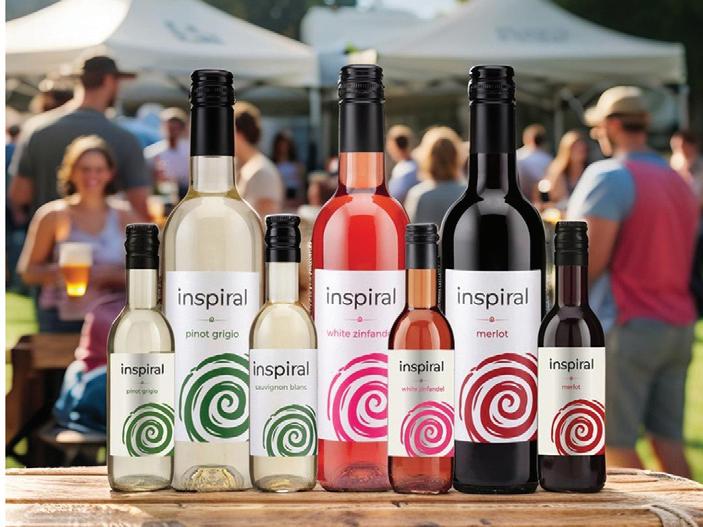
• Aimee’s Garden Moscato is a low-alcohol, delicately sweet wine that pairs effortlessly with summer salads or lightly
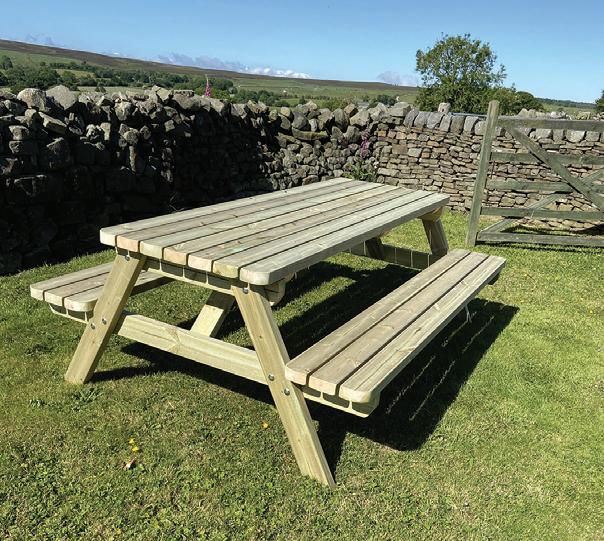
grilled white fish. Its floral aroma and fresh fruit profile make it an easy-drinking, refreshing match for lighter dishes.
• Seaglass Chardonnay is ideal with BBQ prawns or langoustines. Its zesty citrus and tropical notes lift the natural sweetness of shellfish, while a touch of oak adds complexity. The crisp acidity balances beautifully with smoky grilled flavours.
Whether it’s festivals, picnics or rooftop terraces, not every alfresco venue can allow glass. But that doesn’t mean compromising on wine quality. At Lanchester Wines, we’ve developed innovative, sustainable packaging solutions that ensure premium wines are ready to serve - wherever your customers are.
With Lanchester Wines, alfresco dining can be both environmentally conscious and a celebration of great taste. Our innovative packaging solutions ensure you can offer highquality wines that are practical and sustainable, enhancing the outdoor dining experience for your customers.
For more information or to explore our full range, visit www.lanchesterwines.co.uk or contact our team at sales@lanchesterwines.co.uk | 01207 52 1234
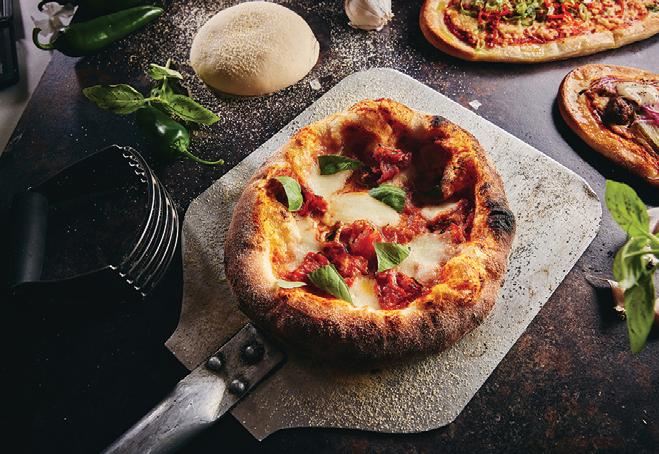
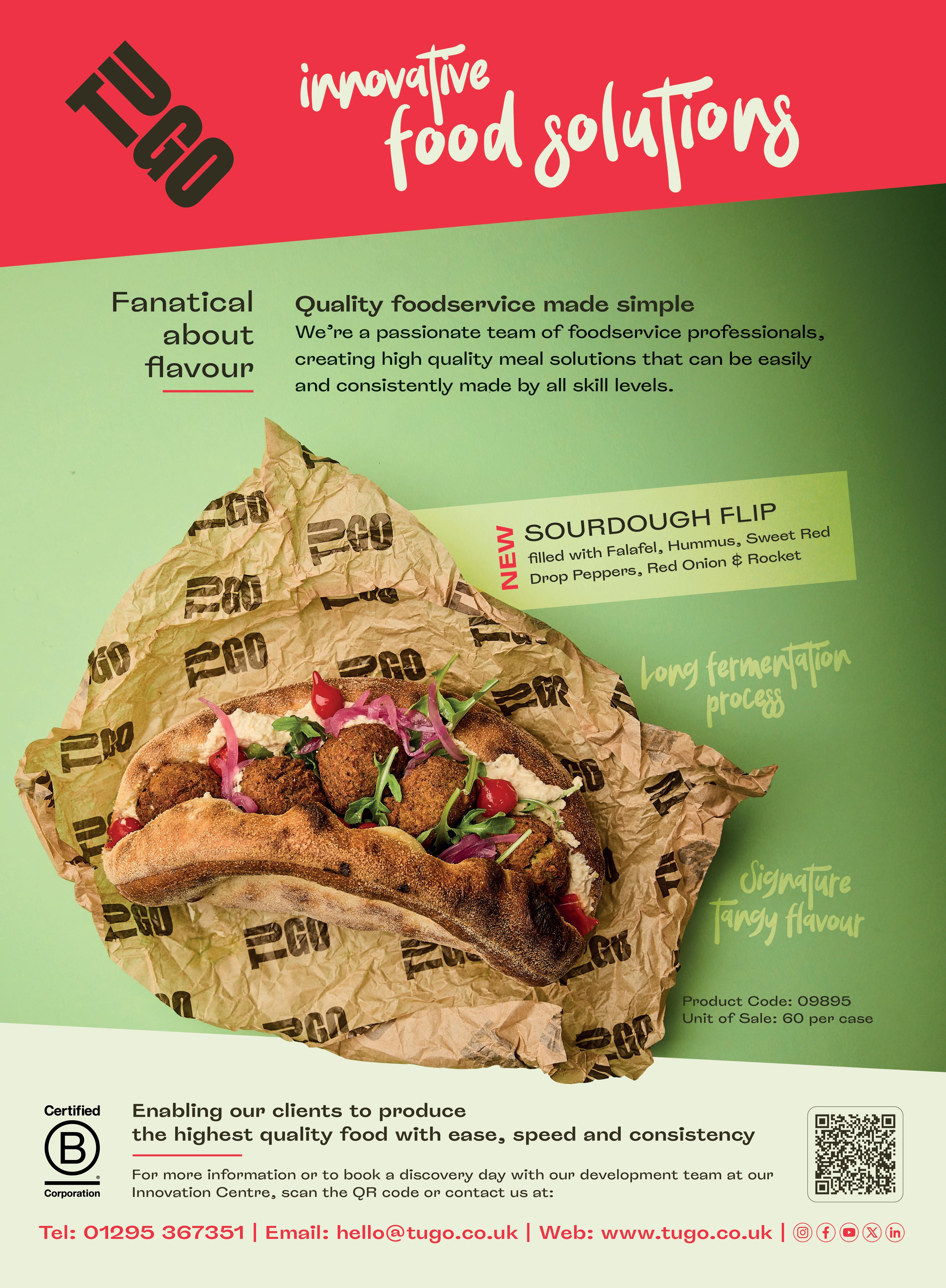
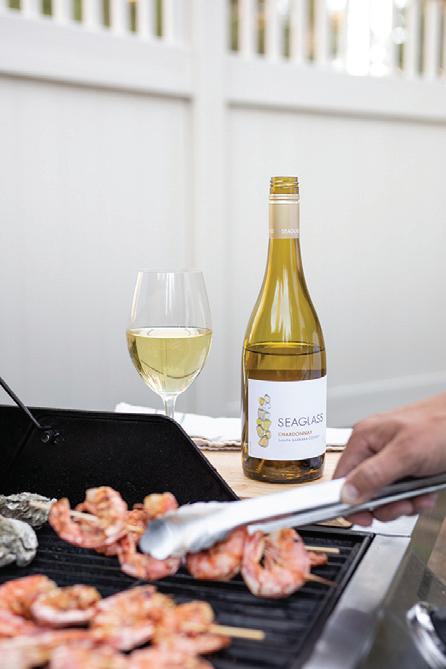
When it comes to BBQs, the default wine choice is often a big, bold red. But when it comes to outdoor dining, the warmer weather calls for wines with freshness, versatility and broad appeal. At Lanchester Wines, we’ve selected three unique wines from our range that offer a refreshing take on classic BBQ pairings.
LEESE-FITCH OLD VINE ZINFANDEL (CALIFORNIA, USA)
This smooth, fruit-driven Zinfandel offers ripe berry notes and a hint of spice, making it a superb match for sticky BBQ ribs, glazed sausages or grilled vegetable skewers. With supple tannins and balanced acidity, it brings depth without overwhelming the plate.
SEAGLASS CHARDONNAY (CALIFORNIA, USA)
Crisp and elegant, this Californian Chardonnay pairs beautifully with seafood on the grill. Zesty citrus and tropical fruit lift the natural sweetness of prawns
and langoustines, while a whisper of oak adds just enough richness. Its bright acidity keeps things refreshing, a great choice for lighter BBQ dishes.
TREVISANA BIO RABOSO FRIZZANTE (VENETO, ITALY)
This organic sparkling red from northern Italy is a real conversation starter. Lightly fizzy with vibrant cherry and red berry flavours, Trevisana Bio Raboso Frizzante is fantastic served chilled alongside charcuterie, grilled pork or balsamic-glazed vegetables. It’s a bright, playful wine that adds flair to any summer menu.
By moving beyond the obvious pairings, your BBQ wine list can bring real excitement to outdoor service, while offering guests something genuinely memorable.
Discover the full range at www.lanchesterwines.co.uk or see the advert on the back cover of this issue for details.
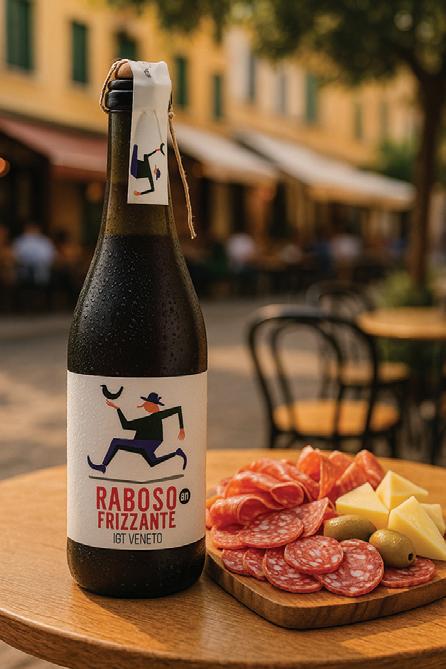
Catering Equipment Ltd are the authorised UK Distributor for the range of Kängabox thermoboxes that keep items Hot or Cold. Kängabox is a revolutionary new high density EPP series of containers in which hot or cold items can be transported with an average temperature loss of less than 1°C plus or minus per hour within a temperature range of -40°C to +120°C. Kängaboxes are available in a range of capacities and attractive colours. Kängabox are available in eight different designs and four different depths. The various gastronorm, pizza, ice cream and euro norm formats are available.
Our Transport Boxes perfect for keeping food HOT or COLD whether delivering food, running an event or managing extra food production in the Kitchen. Comprehensive product details can be found on our website www.kangaboxuk.com
We are also leading suppliers of European manufactured Stainless Steel items such as Sinks, Gastronorms, Accessories and other products. In addition Catering Equipment Ltd are also the UK's largest specialist supplier of

European manufactured gastronorm containers, ice cream containers, sinks, hand wash and restaurant equipment. See our extensive range of products on our website clickonstore.net.
Catering Equipment Ltd are a family firm that has been trading for almost 30 years. Our commitment is to our customers you are the most important people in our business.
Our promise is that you can count on Catering Equipment Ltd to help you and that our team will do their utmost to ensure that dealing with us is a pleasant and worthwhile experience. Call the team on 0121 773 2228 now.
With wind, rain and even the occasional burst of strong sunlight, the furniture we choose for our outdoor spaces has a lot to contend with, and that’s before it’s even been exposed to the demands of constant use by customers!
Here at Trent Furniture, our stylish and sturdy range of contract grade furniture is built to far surpass anything used in a domestic setting - and the good news is it’s all achieved with affordability in mind.
winter months.
The matching Plaza Table incorporates a hardened glass top for extra outdoor toughness.
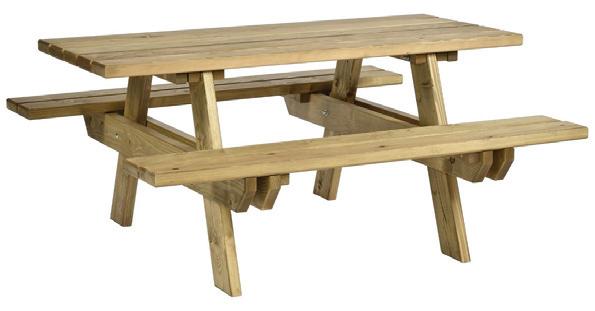

Currently available with 10% off, our chic Plaza Chairs are made of tough water resistant and UV resistant synthetic rattan, woven over a strong rust-resistant aluminium frame to combine the good looks you require with the quality you need. Even better, these chairs are stackable and look great indoors, meaning they can work just as hard for you in the
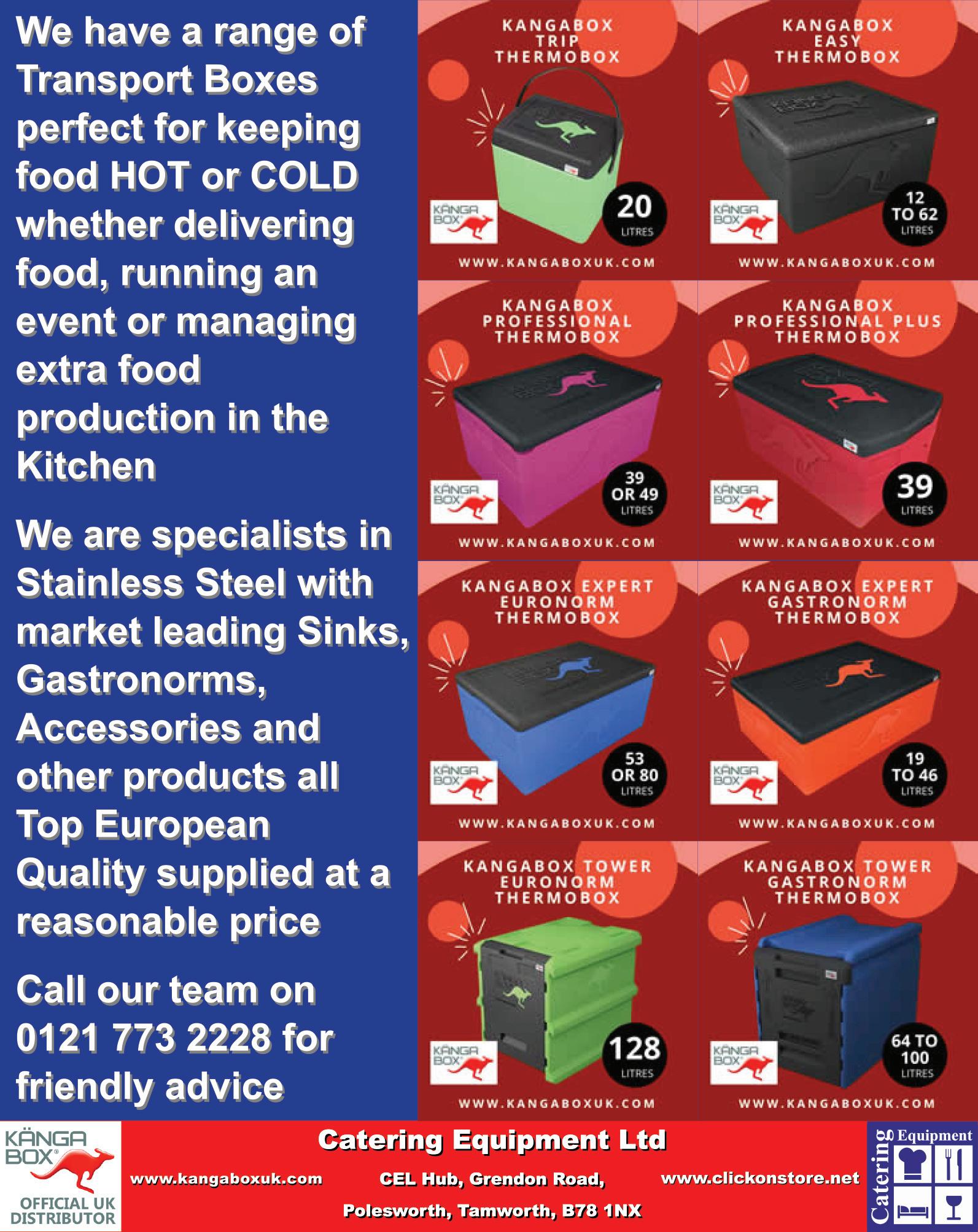
If you’re looking for a modern metal look, the full steel construction of the Vienna range is the perfect addition to your outdoor dining space, and again with 10% off, now is the perfect time to invest for summer. And of course, no beer garden is complete without a picnic table. Available in three sizes and made from 4cm thick fully dip-treated spruce wood, the aptly named Chunky Picnic Table is constructed for strength and durability with a double strut across the A Frame and galvanised metal fixings.
To find out more about our great range of contract grade outdoor furniture, please call 0116 2864911 or email sales@trentfurniture.co.uk
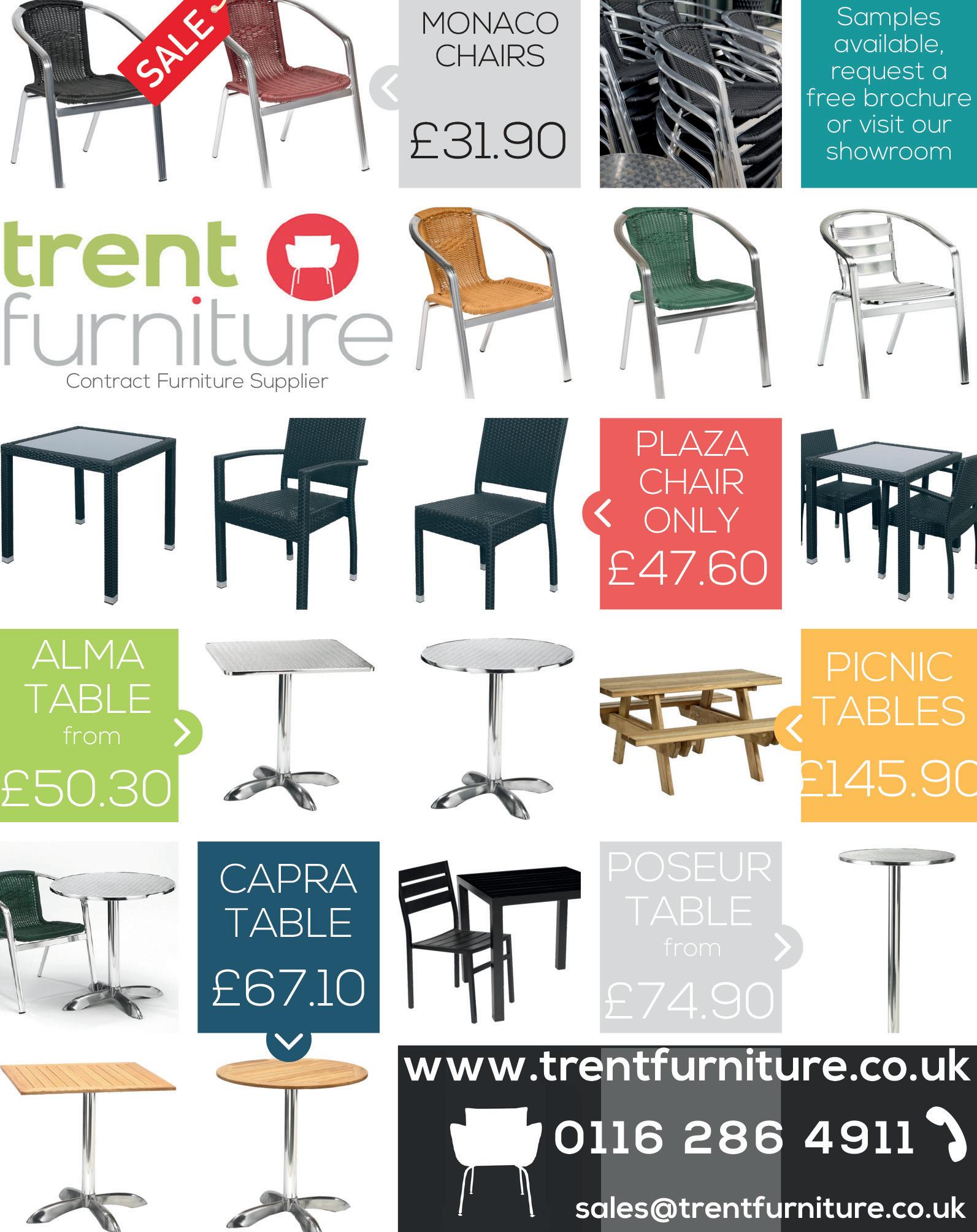
For over 20 years, Gazeboshop has been a trusted name in the industry, providing high-quality gazebos to businesses and individuals across the UK and Europe.
We specialise in high-quality printed gazebos tailored for food and drink vendors. Whether you run a street food business or take part in occasional markets and events, our customprinted gazebos will help you stand out and attract customers.
Our catering gazebos are designed to be practical and eye-catching. They can easily accommodate BBQs and street food ovens, and are fully waterproof and flame retardant - keeping you and your food protected year-round. Printed accessories like sky banners, half walls, and flags are also available to further personalise your setup and boost visibility.
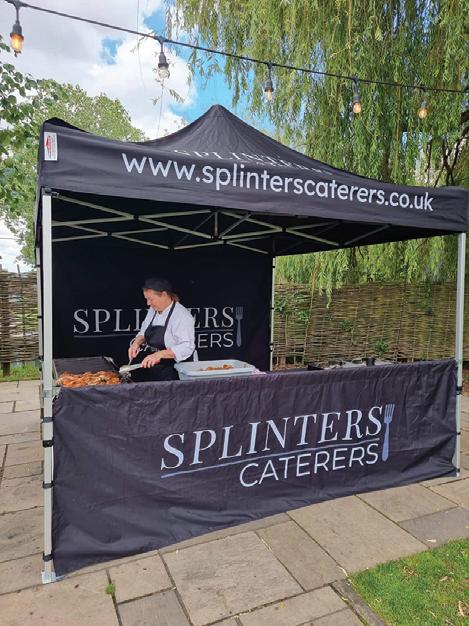
Ideal for both indoor and outdoor use, our gazebos provide a professional, branded presence wherever you
With over 30 years of industry expertise, Indigo Shading has become a leading national supplier of commercial grade awnings, giant parasols with accessories, screening plus glazed and retractable roof fixed structures. Built on a foundation of innovation and quality, the company has transformed countless outdoor spaces across the UK, providing exceptional outdoor solutions for businesses enabling them to grow their own turnover and profits.
From initial consultation to installation, Indigo Shading is committed to delivering unparalleled service. Indigo’s

go. We’ve proudly supplied to a wide range of catering clients, including The Filthy Vegan, Santina’s Wood Fired Pizza Co, Acropolis Street Food, and Bring & Braai Catering. A well-designed gazebo helps showcase your products and attract attention, making your stall the goto spot at events.
We also offer plain pop up gazebos in a variety of sizes, colours, and frame strengths for those on a budget or not needing custom branding. All our pop up gazebos come with a manufacturer’s warranty of up to 3 years, and spare parts are available for next working day delivery.
Looking to elevate your outdoor space? Explore our stretch tents to create a stylish alfresco dining area.
Let Gazeboshop help your business shine. Call 01295 258922 or visit www.gazeboshop.co.uk to get started.
Managing Director
Trevor Ruddle says “that’ll do won’t do, for us it has to be the best or nothing”. Every project is approached with precision, ensuring tailored solutions that exceed expectations. Expert guidance, attention to detail, and seamless execution guarantee a flawless experience from start to finish.
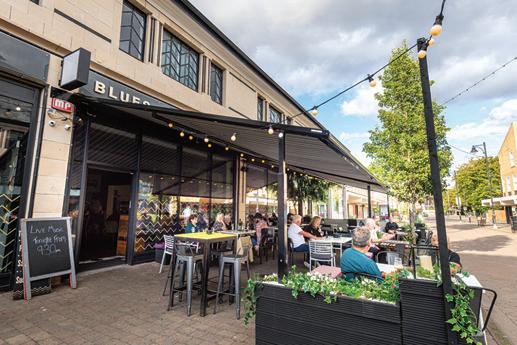
Indigo Shading specialises in transforming outdoor spaces with premium products designed for style, comfort, and functionality, these shading solutions cater to a variety of industries, including Pubs, Hotels, Restaurants, Sporting venues, hospitality, retail, and education. From providing elegant shelter to enhancing brand visibility, Indigo Shading offers high-quality products that are both practical and visually stunning.
Email enquiries@indigoshading.co.uk
Web www.indigoshading.co.uk Call - 01352 751889

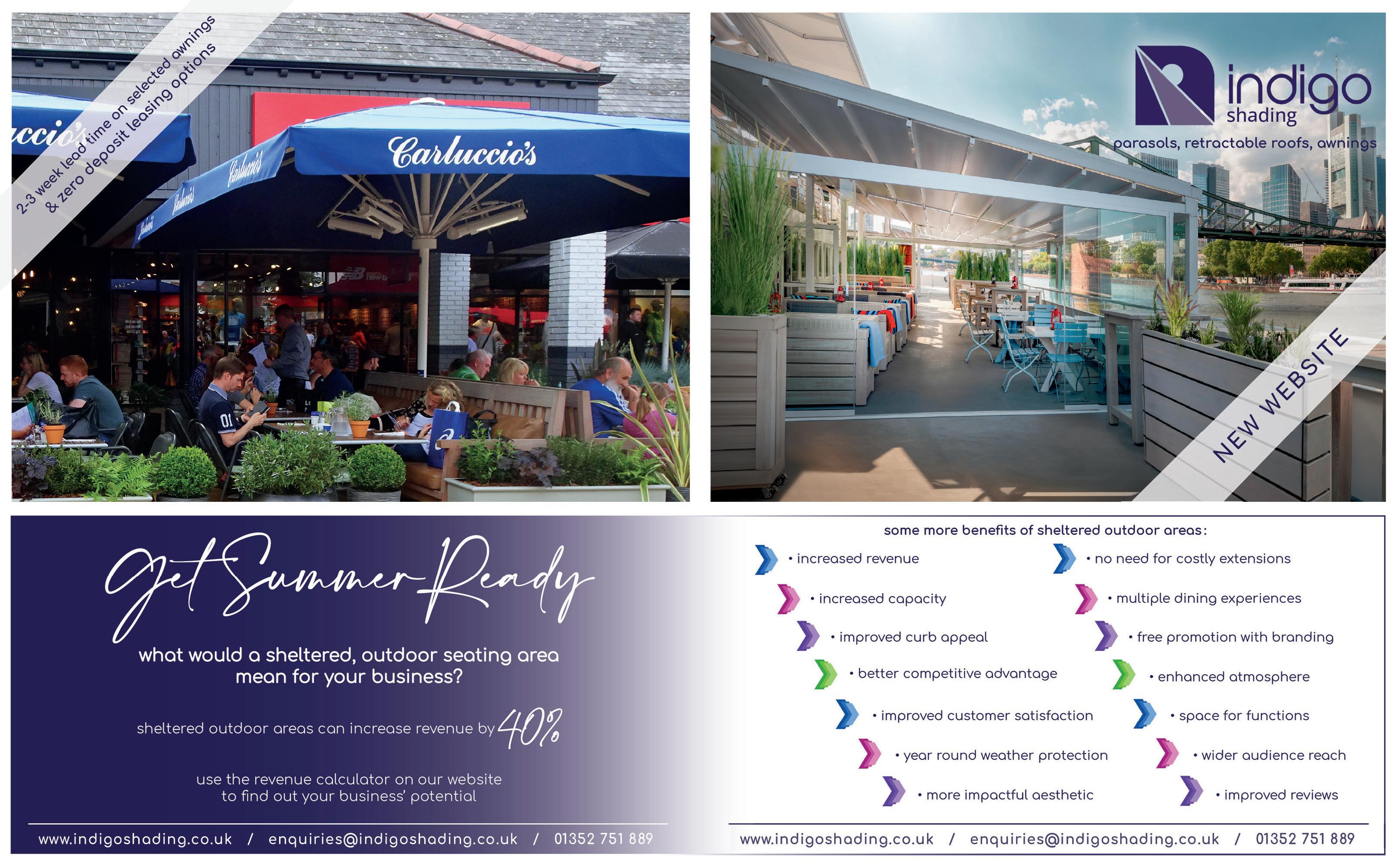
At TheCommercialOvenStore.com, we know that the heart of any professional kitchen is a reliable, high-performance oven. That's why we offer an extensive range of ovens from the world’s leading brands – including Blue Seal, Lincat, Unox, Rational, and Merrychef.
Whether you’re running a bustling restaurant, a cozy café, or a fast-paced catering business, you’ll find the ideal solution with us. Our selection includes powerful gas and electric ranges, versatile combi ovens, high-efficiency speed ovens, and durable convection ovens, alldesigned to keep your kitchen operating at peak performance.
Explore cutting-edge features, energyefficient designs, and trusted engineering
– all in one
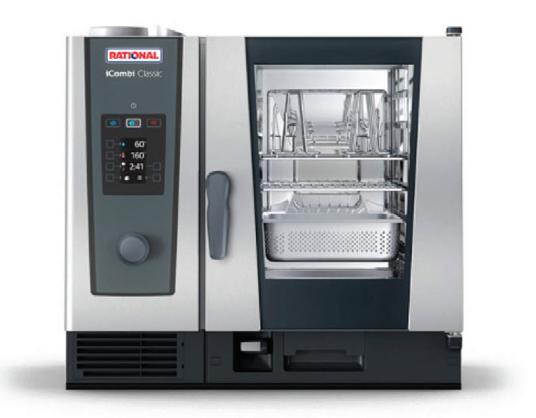
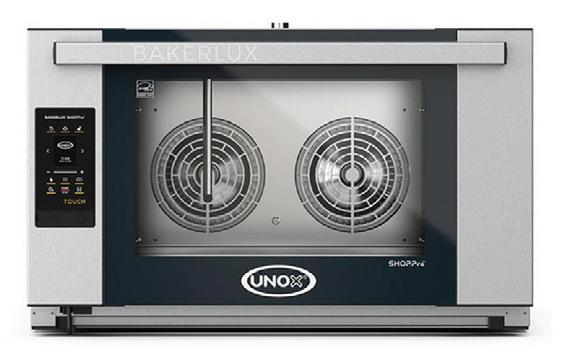
place. From compact units for smaller kitchens to heavy-duty systems for large-scale operations, we make it easy to find the right fit for your needs and budget.
Expert advice, competitive prices, and trusted brands – all at TheCommercialOvenStore.com
Get the equipment you can rely on, and take your kitchen to the next level.
T 0207 965 7502 sales@thecommercialovenstore.com

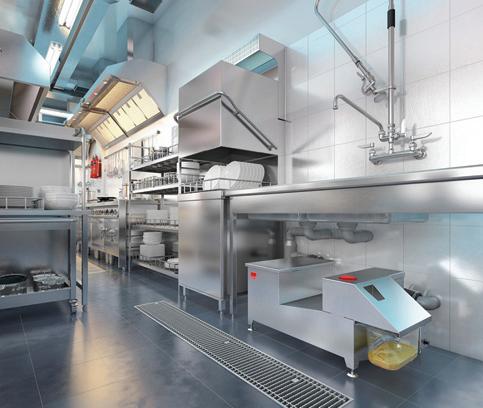
At Kitchen Clearance UK, we specialise in supplying top-quality refurbished and Bgrade commercial catering equipment from some of the industry’s most trusted brands, including Rational, Lincat, Merrychef, Maidaid, Falcon, Foster, Blue Seal, and many more.
We carefully source only the best pre-owned commercial catering equipment, ensuring that each piece is fully refurbished to a high standard and rigorously tested by our expert engineers. All equipment can be viewed if required to see it working and see the quality of the item.
We also supply B-grade catering equipment — items that may have minor cosmetic imperfections or have been used for demonstrations. All B grade items come boxed and complete with all accessories where required, offering a cost-effective solution for high-performance kitchen equipment.
We pride ourselves in excellent customer service, making sure any initial issues are

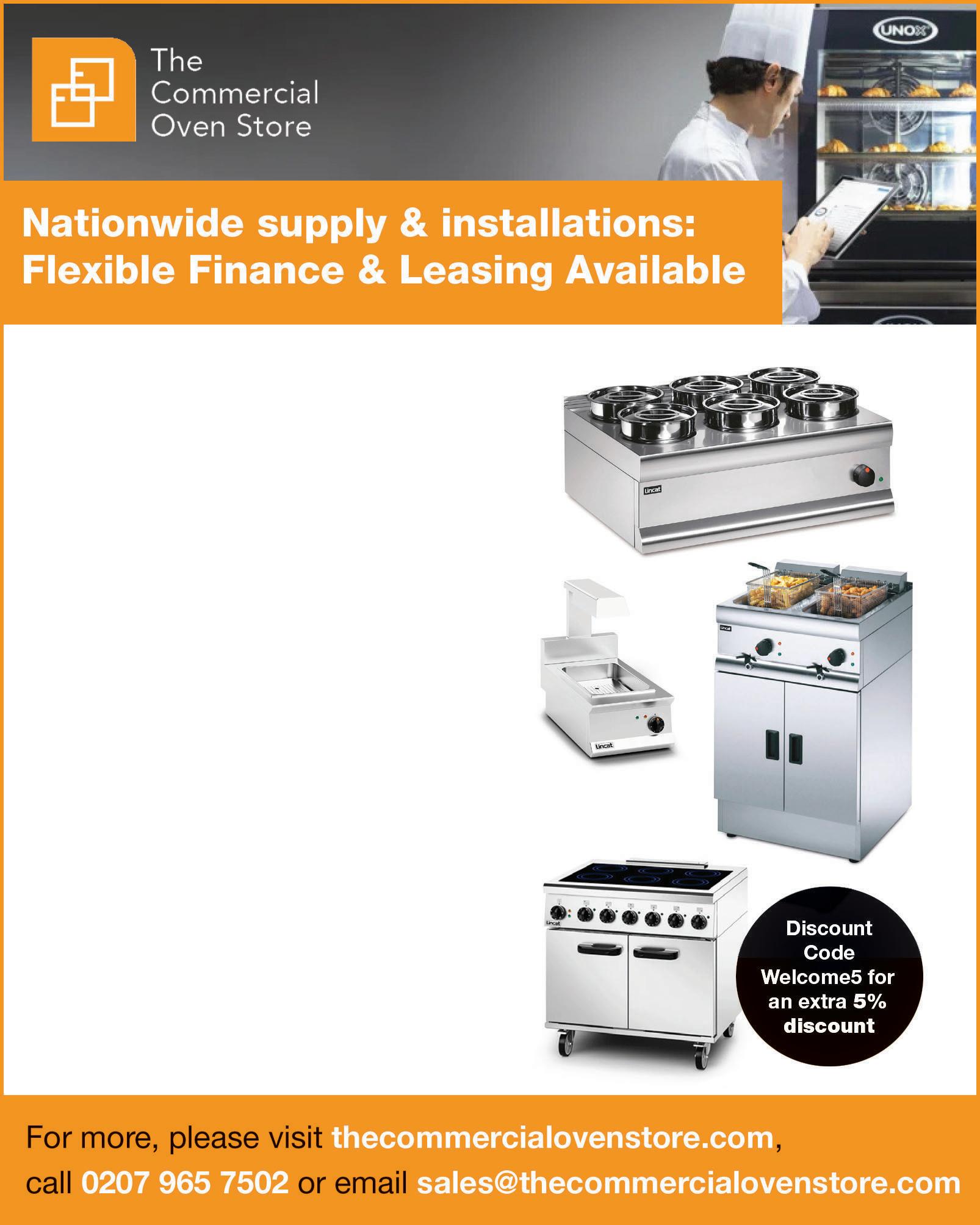
At The Commercial Oven Store, we take great pride in being your go-to destination for all your commercial oven needs.
We understand that when it comes to running a successful business, having the right equipment is crucial. That’s why we have dedicated ourselves to providing top-notch products, coupled with expert advice, to help you make informed decisions and achieve your goals.
As a supplier of commercial ovens, we have established strong partnerships with leading manufacturers in the industry. By working closely with these renowned brands, we ensure that our customers have access to a wide range of high-quality ovens that meet the diverse needs of various businesses.
Whether you’re in the food service, hospitality, or catering industry, we have the perfect oven to suit your requirements.
As a green business, we are dedicated to reducing waste in the catering industry by giving high-quality equipment a second life. Before disposing of any catering equipment, reach out to us, it’s not only better for your finances but also for the environment.
Located on the borders of Lincolnshire, Leicestershire, Rutland, Northamptonshire, Cambridgeshire.
Tel: 07790 612911

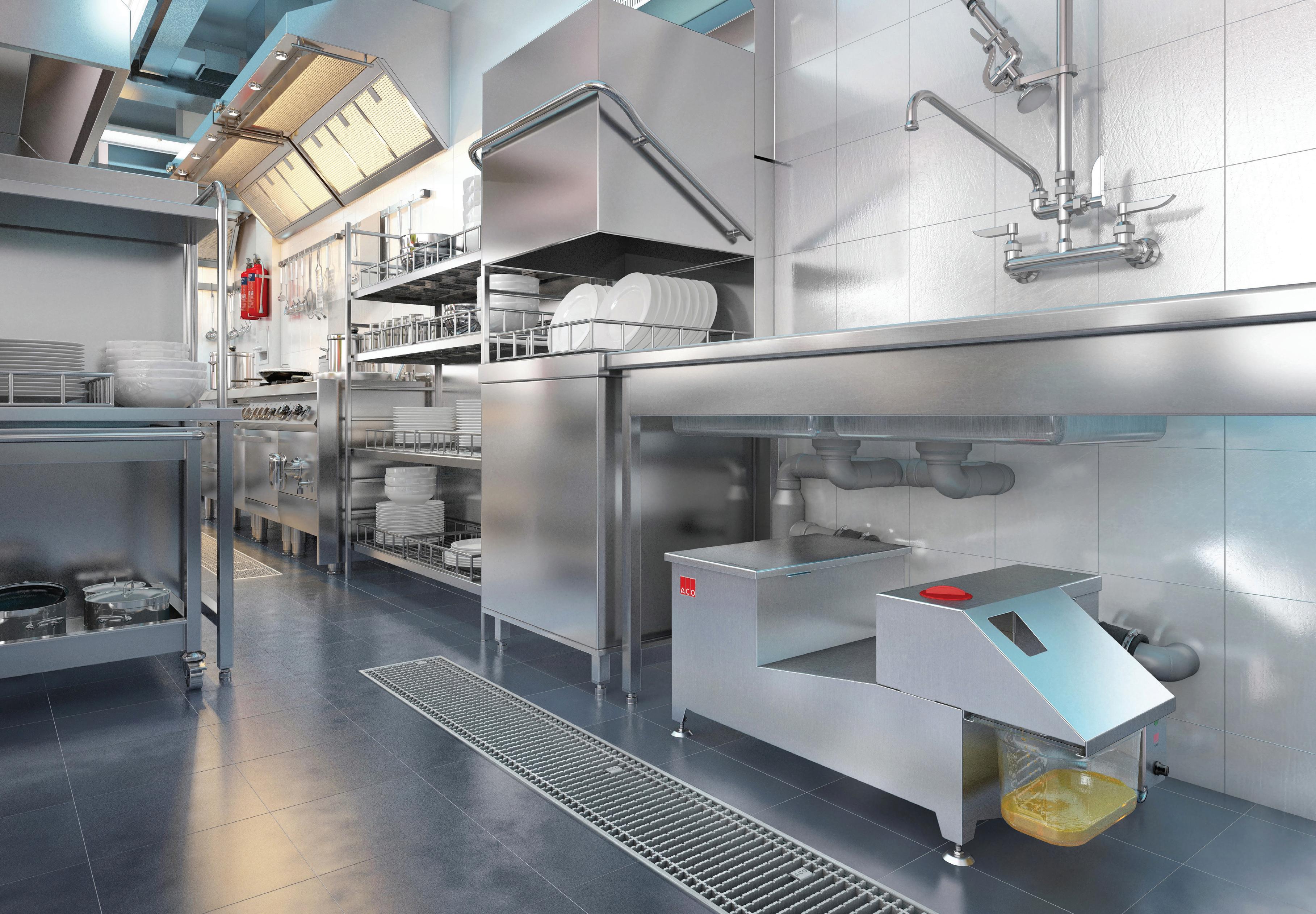
Find the right grease unit for your kitchen using our selector
In today’s catering market there is an increasing focus on managing Fats Oils and Grease (FOG) in commercial kitchens.
At ACO we recognise each kitchen is unique and so we have developed our grease selector to help commercial kitchen owners identify the right solution for their needs.
Answer a few simple questions and receive a recommended solution based on things like:
¡ Location of the unit
¡ Your kitchen equipment set up
¡ Days of operating
¡ Number of meals served
ACO have a range grease units to cater for all kitchen sizes, from small under-sink grease traps for low-volume kitchens to large EN1825 separators that can handle industrial kitchen FOG requirements.
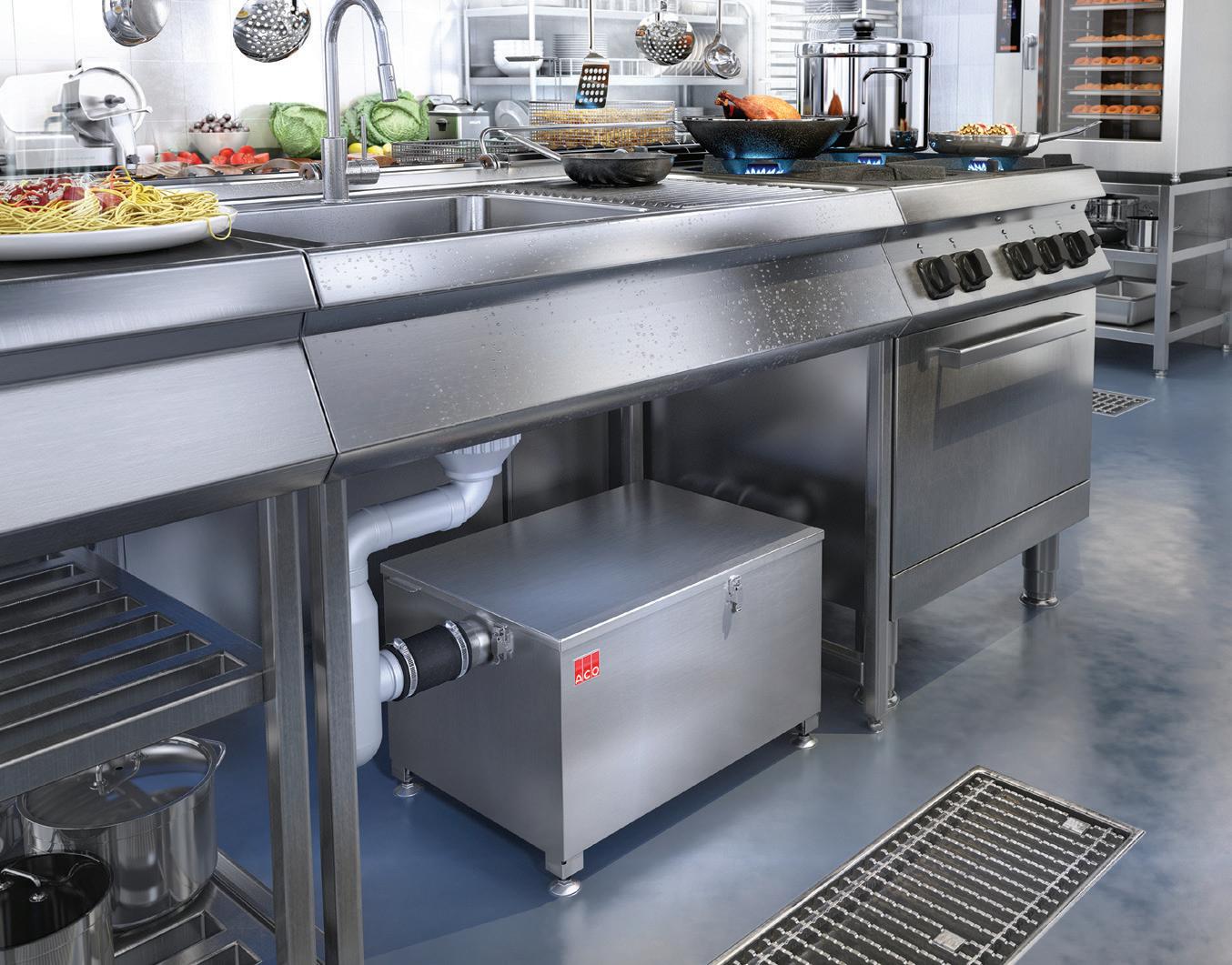
Find a recommended grease unit for your kitchen using our selector now: www.aco.co.uk/buy-grease-solutions
Thawing frozen food in commercial kitchens can be an issue, especially if it's in bulk. Some chefs take it out of the freezer and put it in a fridge or coldroom - this is safe but it's slow, sometimes taking days to defrost. Others run the frozen food under cold water. This is acceptable, but not suitable for large amounts of food. Apart from wasting water, staff need to monitor it constantly to ensure it doesn't rise too high in temperature. Now Williams has developed ThawSafe, an innovative thaw cabinet that's faster than the fridge and brings a new level of food safety to a range of cooking processes including cook-chill and cook-freeze. Thaw cabinets have been around for a while, but Williams has completely reengineered the concept. The Williams ThawSafe is a one door cabinet with 75kg capacity, over double that of its predecessor, in a smaller footprint.
The ThawSafe cabinet features a sleek new look with an easy to clean full length integral door handle. It comes equipped with eight GN2x1 shelves. Installation is simple, with its width allowing it to fit through a standard doorway. The cabinet is fitted with a standard waste drain at the base of the unit, allowing it to be connected to the main drain. Because of the potential risk to food safety if carried out incorrectly, thawing has to be a controlled process. ThawSafe's innovative design ensures food safety while maximising the speed of the process, with the food's surface temperature never being allowed to go above 5°C, thus stopping the growth of bacteria.

The efficient airflow from the four fans within the cabinet ensures the cabinet temperature is 100% consistent,
Caterquip Ventilation Ltd is proud to be celebrating their 25th Anniversary this year.
This Warwick based company offers nationwide coverage for all your commercial catering needs: free site surveys, quotations and designs (CAD), quality bespoke and standard fabrications, specialist knowledge of catering ventilation systems including input air, odour reduction (carbon filtration and ESP) and sound attenuation. Affiliated members of Constructionline and CHAS, Caterquip Ventilation have a strong hold in the marketplace often advising industry professionals on ventilation systems to a DW172 specification & BSEN:6173.
from top to bottom, so everything thaws at exactly the same rate. In the initial phase, the air temperature may be as high as 9°C, to kick start the process, but critically the food's surface temperature never creeps into the bacteria danger zone above 5°C. At the end of the process, the cabinet automatically switches to chilled storage mode.
The new cabinet has an intuitive touchscreen controller with a simple to operate icon based menu. There are four programmes, three of which are preset for 75kg of food, 35 kg and low weight loads. A fourth can be customised for thawing to the operator's needs, for example if they have specialist menu items. Once thawing is complete, an audible alarm sounds to signal the end of the cycle.
The ThawSafe runs on natural hydrocarbon refrigerant and uses high performance, high density, precision injected cfc-free insulation, so it is very much in accord with foodservice operators' Carbon Net Zero aspirations.
The ThawSafe cabinet can handle a maximum of 75kg of frozen food. It measures 727mm wide x 941mm deep x 1960mm high with list prices starting from £8030.
Williams Refrigeration offers a comprehensive range of commercial refrigeration including gastronorm cabinets and counters, specialist bakery equipment, coldrooms, multidecks and blast chillers.
To learn more about Williams extensive product range visit www.williams-refrigeration.co.uk.
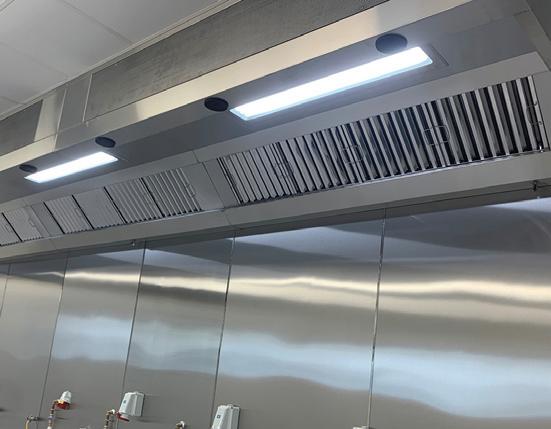
They have strong relationships with all leading kitchen equipment suppliers, and they offer a kitchen design ser-
vice to help you build your ideal kitchen.
Projects undertaken have included Olympic Villages, Basildon Hospital, The Mitre Hotel at Hampton Court, The Truck Stop at Anglesey, The Lodge at Old Hunstanton, Colleges, Schools, Hotels, Restaurants and Public Houses. They ensure their systems are compliant with the current guidelines whilst maintaining an efficient and dynamic facility.
With extensive knowledge of manufacturing and installing ventilation systems, they can help you design the best kitchen within the space available.
Call: 01926 887167, visit: www.caterquipventilation.co.uk, email: info@caterquipventilation.co.uk
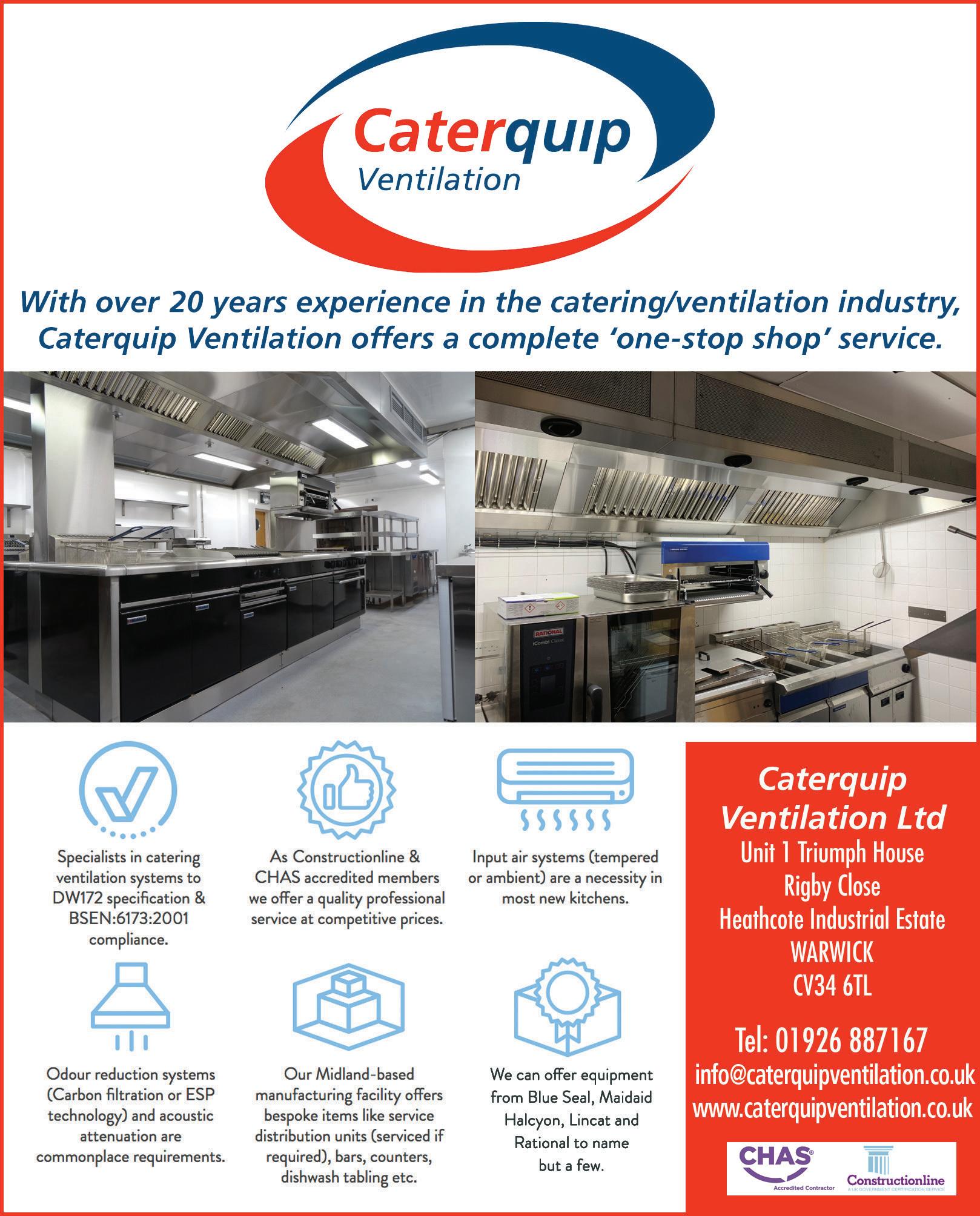
Fridge Seals Direct proud to be UK's no1 supplier of replacement fridge and freezer seals. We fabricate for a wide variety of commercial fridge & freezers.

The management team at Fridge Seals Direct have over 30 years of experience in the refrigeration industry and have each spent many of those years installing gaskets and hardware for a range of styles, brands and sizes of fridges.
From restaurant kitchens to food warehouseswe have experience in dealing with fridge & freezers of all sizes and scales. To learn more about fridge seals, be sure to explore our range of extensive guides on how to replace a refrigerator door
seals. Otherwise, find your specific guides in how to identify, measure, install or maintain your fridge or freezer door seal.
Our reputation in the industry along with our commitment to providing a high-quality gasket without having to buy from the factory allows us to have competitive pricing and fast turnaround time.
Try us out, order your door gaskets from us and discover a better way to do business. We are here to help you.
www.fridgesealsdirect.co.uk

• Be ready for your inspections
• Damaged fridge seals are unhygienic
• Make your fridge more energy efficient with a good seal on your fridge
• We provide custom seals for cold rooms, discontinued models, and units with no identification information
• Next-day delivery service
• Discounted prices on large orders WhatsApp, phone, and email support
07936807320
sales@fridgesealsdirect.co.uk
Bread cutting machine specialist MHS Schneidetechnik brings over 30 years of cutting technology expertise to the hospitality sector, offering self-service, professional, and production bread slicers. Now available exclusively in the UK and Ireland through bakery equipment specialist EPP, MHS machines deliver exceptional performance, reliability, and return on investment, making them an ideal choice for the fast-paced demands of catering environments.
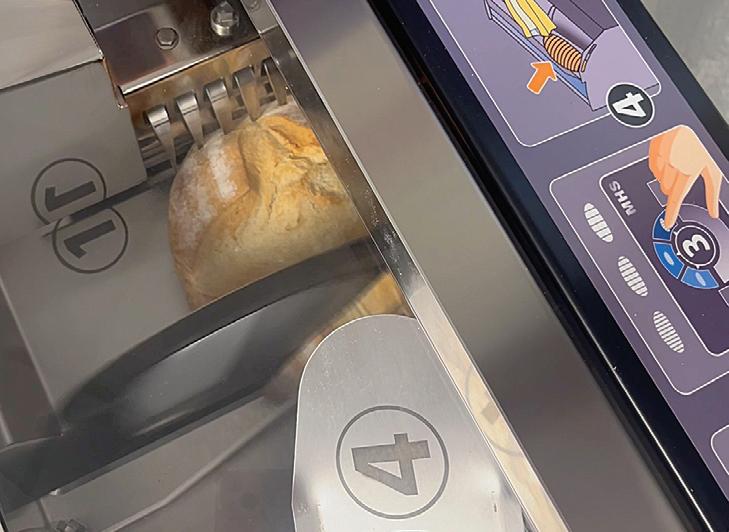
With slicing speeds of up to 220 slices per minute, MHS slicers are built for efficiency. Slice thickness can be adjusted in 1mm increments, down to as thin as 4mm, enabling caterers to create elegant finger sandwiches, thinly sliced rye, artisan sourdough, twicetoasted melba slices, and more. Whether it’s breakfast service, afternoon tea, or buffet prep, MHS machines help caterers deliver consistent, professional results.
“Busy restaurants, hotels, and catering businesses need efficient, reliable, and durable solutions that can
perform time after time,” says Steve Merritt, managing director of EPP, exclusive distributor of MHS in the UK and Ireland. “MHS provides high-quality slicing technology which allows hospitality workers to quickly, easily, and professionally slice loaves of all sizes, allowing our partners to further automate operations, increase efficiency, and make cost savings.”
Manufactured in Abstatt, Germany, All MHS models feature hygienic stainless-steel housing and easyaccess components for quick cleaning, whilst durable blades ensure quiet, efficient operation. Tabletop or floor standing models are available in a range of sizes, able to fit into hospitality spaces as narrow as 60cm.
MHS machines are trusted by industrial and semiindustrial bakeries, bakery chains, hotels, restaurants, and artisan bakeries alike. All equipment is GS safetytested and certified.
MHS slicers are available in the UK and Ireland from bakery equipment specialist EPP. For more information, visit www.eppltd.co.uk
Foodservice businesses are being urged to make sure they are ready for a Water Company inspection of their grease traps.
In April this year the China Panda in West London was prosecuted by Thames Water due to repeatedly disposing of fats, oils, and grease into the sewers. This led to over £13,000 in fines and costs for continuous sewer abuse offences.
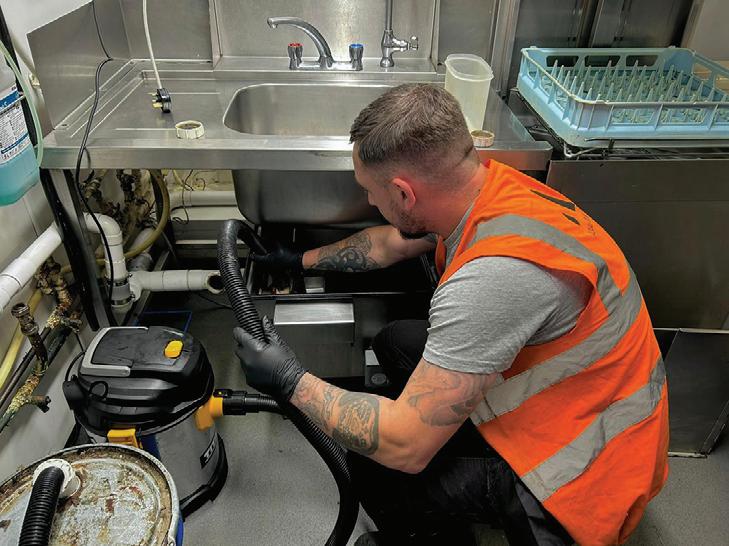
In the UK, businesses that serve hot food are legally required to have a grease trap or separator to prevent drainage blockages and environmental damage. This is enforced through various regulations including the Water Industry Act 1991, Building Regulations 2000 (Part H), and the Environmental Protection Act 1990. Failure to comply can result in fines, re-charges
for damages, and even legal action.
Sewer abuse is a major issue for water companies. Every year, Thames Water removes 75,000 blockages from their sewers at a cost of
Companies are becoming increasingly active in checking of grease trap arrangements at foodservice operations, we urge operators to get
The Meiko BioMaster FLEX food waste recycling system is just 500 mm wide and has 150 mm ground clearance for cleaning, making it ideal for any kitchen situation.
A FLEX system replaces floor bins and can be sited anywhere, next to the dishwasher or within tabling in the kitchen or prep area. The liquid food waste recycling system ensures that there are no open buckets or bins of food waste to move around, no unpleasant odours, and no flies or vermin.
BioMaster FLEX processes, using homogenisation, all typical food waste plus frying oil, coffee grounds, dead flowers and fats into a liquid slurry. This slurry is pumped to the BioTank, where it is collected and transported for biogas, usually every 4-6 weeks.
“FLEX provides the most sustainable, labour-efficient and futureproof recycling solution for
the public sector,” says Meiko UK MD Paul Anderson.
“Featuring the same powerful homogenising motors as the larger BioMaster 4 hoppers, it deals with all typical food waste, including fats and oils, and it brings major cost benefits, including labour and collection cost savings.
“Meiko BioMaster FLEX ensures the caterer retains clear ownership of the waste, which is essential to futureproofing the business. Homogenisation of waste gives the caterer the best negotiating position for cutting removal costs in the future, in addition to benefiting from the labour efficiencies and other cost savings.”
For further information visit www.meiko-uk.co.uk
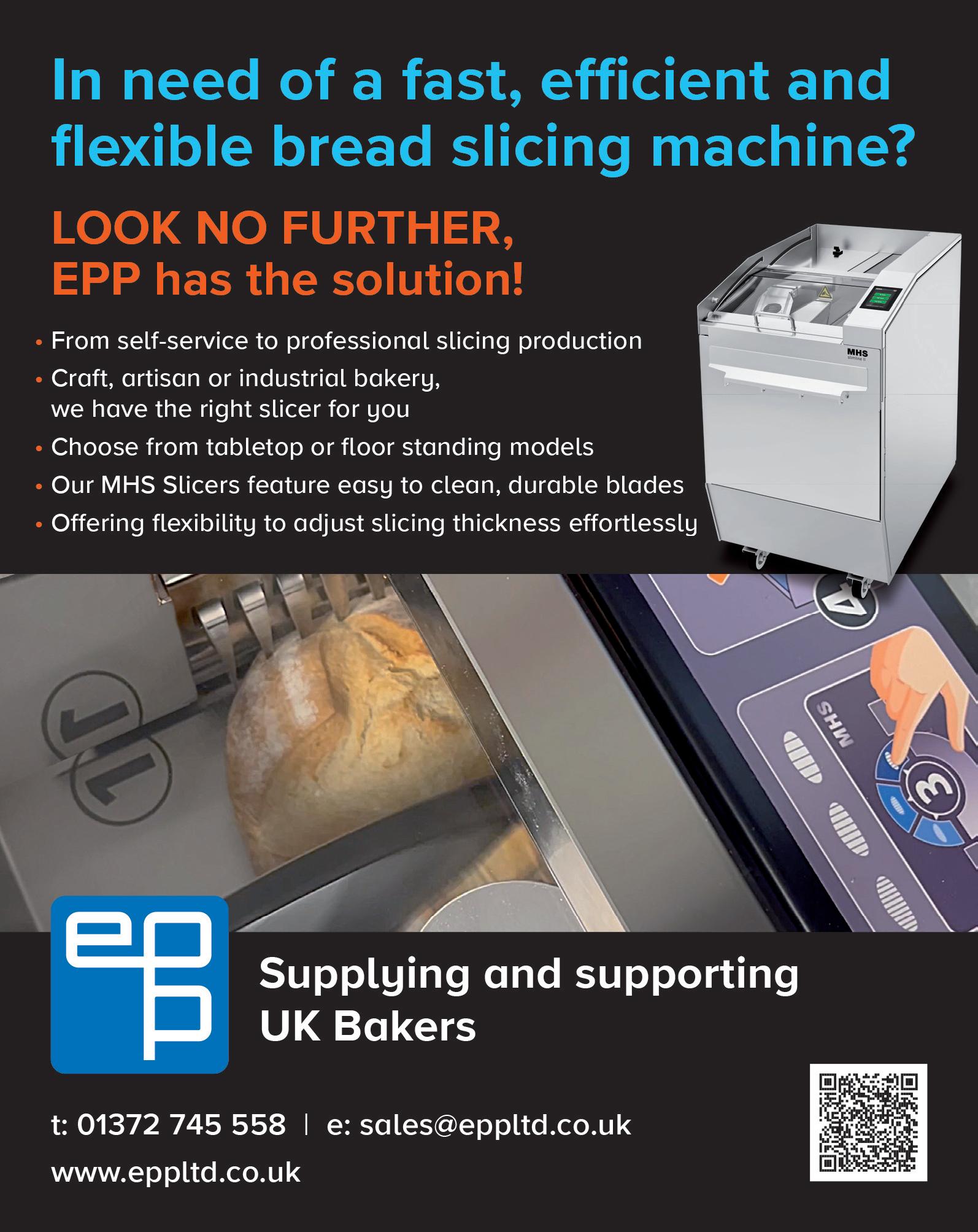


To avoid downtime and problems caused by equipment failure, busy commercial kitchens are selecting the DrainMinor and DrainMajor units from Berkshire based Pump Technology Ltd.
These extremely reliable and well proven waste water drainage systems are becoming the sector’s benchmark for good reason. They use a range of Jung Pumpen submersible pumps built in Germany. These are recognised for their ability to handle pumping systems capable of soaking up the typical demand and abuse that is found in this part of the industry. Constant use and the ability to handle the collection of food debris, grease and fats that even with the best upstream grease protection will eventually feed through to the pumping system does not phase this equipment.
For smaller restaurants and coffee shops the additional premium for these properly engineered pumping systems might be questioned, however this will always be outweighed by the fact that avoiding breakdowns and floods (often during busy service times) will be far more cost effective
than expensive engineer callouts and loss of income. The DrainMinor and DrainMajor ranges are available in single or duty standby pumping configurations. Options such as the mechanical seal version of the DrainMinor 30SL mean that the pump is resilient to the buildup of spent coffee granules and milk skin that is problematic with the common static lip seal designs found on the motor / impeller shaft of more basic small submersible pumps.
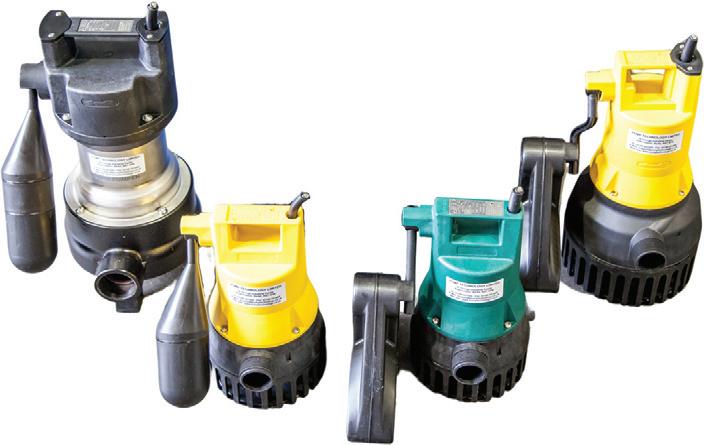
Where hot water pumping is required, Pump Technology Ltd offer the DrainMajor 730HES. This is specifically designed to pump very hot waste water - up to 90°C - not just intermittently for short periods, but continuously. This ensures that system reliability and product life for drainage from dishwashers and pasta boilers is considerably enhanced.
The full range consists of the DrainMinor, with two pump options capable of pumping up to 7m head and the DrainMajor, with seven pump options and single or duty standby con-
Blue Seal Ltd are very mindful of the future equipment requirements for efficiency, carbon footprint and sustainability, with this ever-changing food industry and the cost of gas and electric usage.
We currently produce a new range of free-standing & bench models of heavy-duty induction hobs with two or four zones. Each hob has the versatility of 3.5KW or 5Kw round zone generators for focussed power or 5kw power full area zones to accept multiple pans across the cooking area. The induction technology is incredibly responsive, with hardened 6mm thick glass cooking surfaces.
Blue Seal R&D are conscious of the ever-increasing demand for induction product, and we are in the process of launching our new induction- convection ranges, and wok induction hobs.
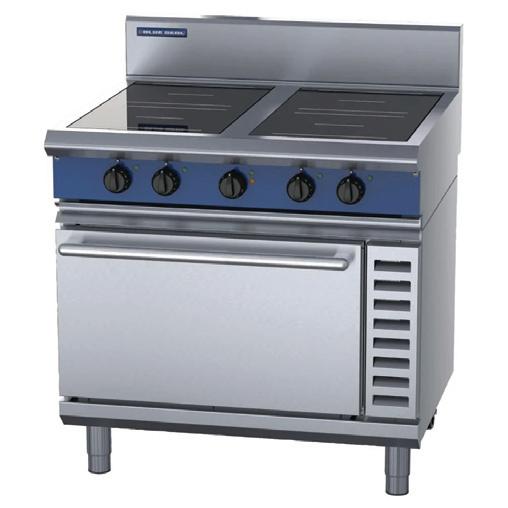
Many commercial chefs are trained at college with gas appliances and do love the instant heat & control of gas. However, they are slowly breaking this habitual comfort and being convinced to make the change, once they experience using Induction, the fantastic responsiveness, instant heat direct to the pan & superb controllability, speaks for itself.
The induction technology lends itself to a myriad of concepts, especially QSR restaurants where they need quick heat up on demand, which is also remarkably simple for the operator to use and maintain.
The feature benefits of induction far outweigh the initial out lay, which is currently still relatively high for com-
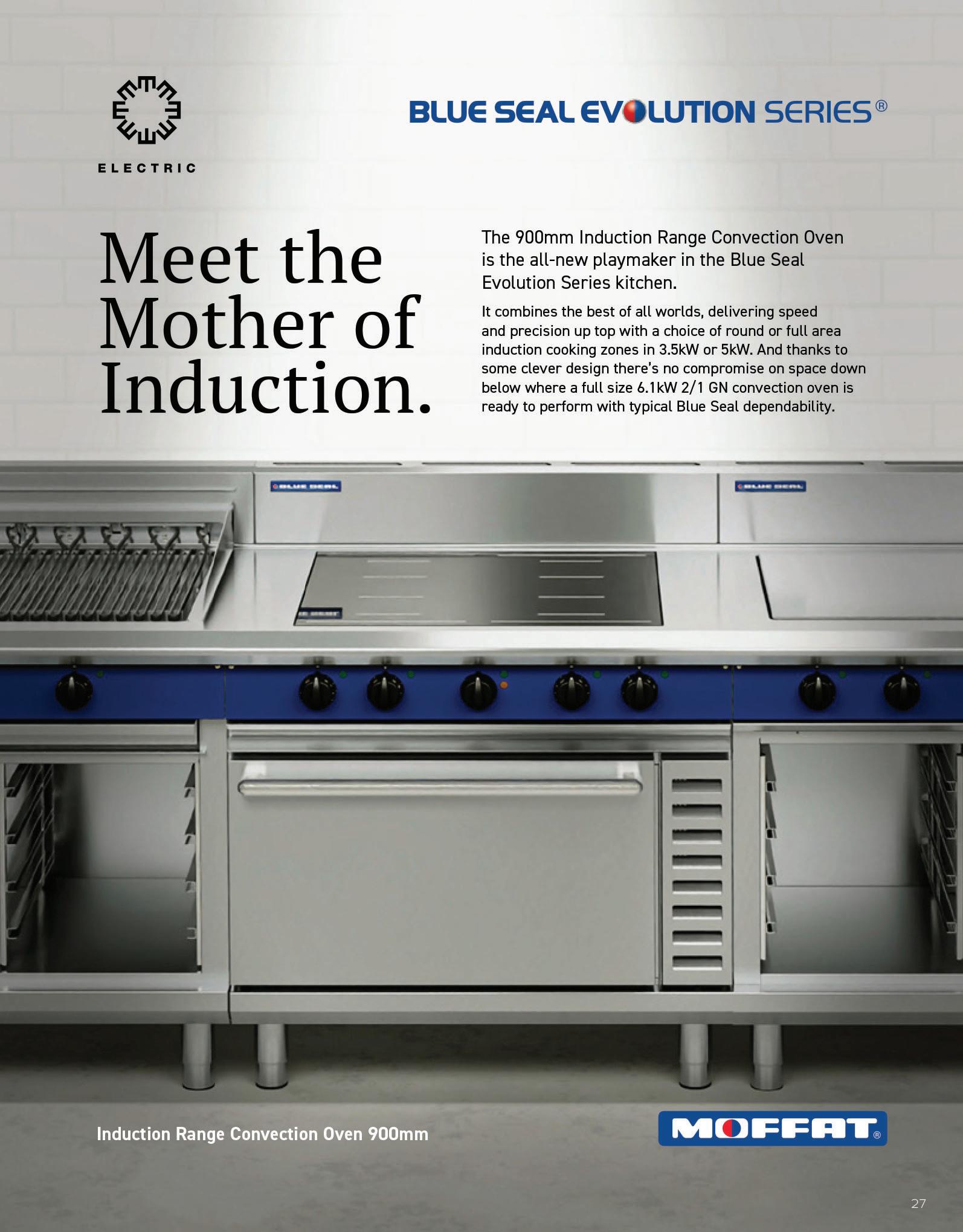

figurations capable of pumping up to 12m head.
Customers, engineers and installers report that a simple conversation about their drainage needs with the Pump Technology Ltd team has often been invaluable when selecting the correct pumping model which they need to specify and fit for the best ultimate value, reliability and long product life.

mercial heavy-duty product. Induction for prime cooking is still relatively fresh to be accepted into the general commercial kitchen environment, however the big energy savings and high efficiency far outweighs the cost of changing the cookware and initial higher cost outlay for the product. This cost will no doubt reduce and become more competitive as the trend & demand for induction manufacture inevitably increases. Induction equipment also avoids the additional very costly legislation requirement involved with gas canopy extraction/make up air and interlock systems.
When you compare the efficiency of using induction over gas, the induction is at approx. 90% efficient compared to approx. 45% efficiency for gas. This is achieved by the magnetic fields heating up the entire surface of the cookware with virtually all of the energy transferred into the pan. Where gas disperses the heat, licking around the sides of the cookware more so, losing energy into the ambient air around the pan.
Using induction massively reduces heat transfer into the air flow, lowers the overall temperature in the kitchen promoting a more comfortable working environment, as well as the practicality of a simple wipe down of the glass cooking area at the end of a shift, which is very appealing to an operator. The appliances are much safer to use, reducing injury potential as well as being very simple to service & maintain.
David Chesshire
National Accounts Manager, Blue Seal www.blue-seal.co.uk

Independent hotels, restaurants, and pubs across England and Wales face a unique set of pressures: rising costs, evolving safety regulations, and the constant juggle between running a great business and keeping the kitchen up to scratch.
At Tricon, we’ve spent decades working alongside independent hospitality operators, helping them turn tired or inefficient kitchens into true commercial assets, without the drama or bigchain price tag.
Whether it’s rethinking a cramped back-ofhouse, phasing a refit to keep service running, or unlocking savings on energy bills, we know the realities of independent hospitality. We start every project with one question: what does your business need to thrive for the next ten years, not just the next trend cycle? From designing kitchens that pass the next round of food safety audits, to finding cost-effective solutions that boost productivity, our team brings ideas that work on the ground.
Mayfair Furniture will be celebrating 12 years this year of providing the UK’s fastest and affordable commercial furniture. Supplying all kinds of establishments from high end hotel chains to small local takeaways.
We keep in stock a huge variety of items ready for immediate dispatch, and can fulfil a wide range of bespoke orders. We deliver to all areas of the UK, Ireland & Europe.
We are not just a supplier; we understand that from time to time hospitality and leisure establishments like to give themselves a fresh new look. That's why not
Our experience covers everything from country inns and boutique hotels to high-street restaurants and city pubs. No generic “cookie-cutter” schemes, just honest advice and design rooted in UK know-how, for businesses run by real people.
“For independents, a well-designed kitchen isn’t a luxury — it’s a necessity for survival. The right investment protects margins, simplifies compliance, and gives operators confidence for the future.”
Mike
Coldicott,
CEO, Tricon Foodservice Consultants
If you want to see what’s possible, and for a practical no-nonsense chat get in touch or check out our recent projects at www.tricon.co.uk
Paul Greenwood
Business Development Manager
paulg@tricon.co.uk
020 8591 5593

only do we supply contract furniture, but when it's time for your establishment to go through a refurbishment we also offer a complete clearance service. We'll organise everything from a suitable time and date, professional clearance staff to remove contract furniture whether fitted or unfitted. Along with our sister company Caterfair who provides commercial catering equipment for your kitchens we are the ideal people to speak to when you are looking to refurbish. 01733 310115
sales@mayfairfurniture.co.uk www.mayfairfurniture.co.uk
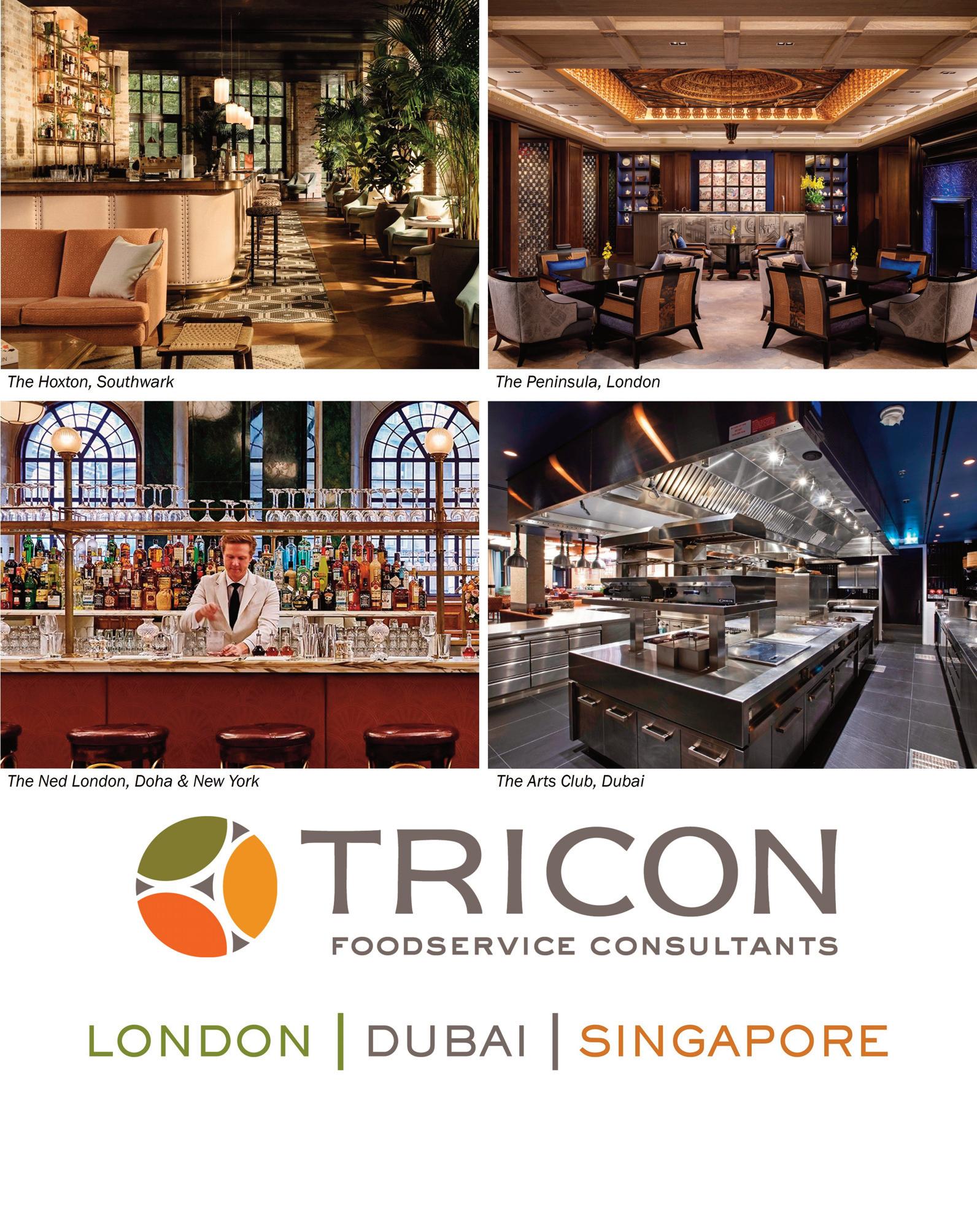
















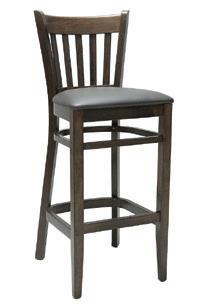





Have you recently taken over premises, just fancy a change or need to replace your tired old fixed seating and fixtures? At Drakes, we can help you realise your dreams with our bespoke furniture design service. Every week we build new tailormade furniture up and down the UK, working with owners to come up with design concepts for fixed seating, booths and even bars and fixtures. We can take ideas from you, or your interior designer, or we can design something ourselves, all done efficiently, with professional quality and on time within budget.
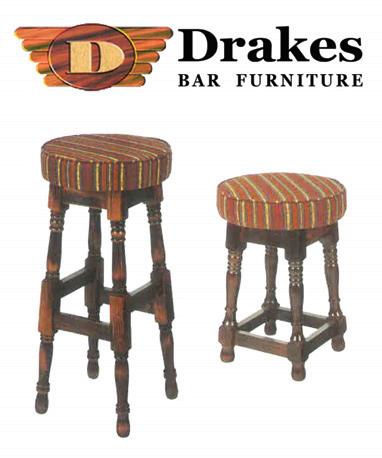
Our service provides a unique opportunity to make your establishment stand out from others and add additional comfort for your customers.
Got you interested? We are available
We have been providing bars, pubs, restaurants, cafes, clubs, and hotels with high-quality furniture and fixtures for decades. We employ over 15 joiners, upholsterers, polishers and designers who are capable of installing fixed seating and bespoke joinery, new bars and full refurbishments, or simply making stools for the front of the bar, or providing quality tables that last. Our dedicated team are either time-served officially trained craftsmen or externally based professionals.

and Instagram, just search for Drakes Bar Furniture and give us a follow!
MST AUCTIONEERS Ltd specialise in handling & auctioning a wide variety of goods.
We act for Insolvency Practitioners, Receivers, Bailiffs and Solicitors as well as large PLCs. We are members of The National Association of Auctioneers and Valuers (NAVA).
For the past 25 years, we've provided a unique disposal service tailored to suit, liquidators, banks, receivers as well as private and corporate vendors. We carry out probate valuations and conduct complete house and commercial clearances. We have the largest Auction venue in the South of England. Our regular monthly Auctions occupy 45,000 sq.ft. of undercover space, selling over 2500 lots from 3 rostrums over two days.
We also hold regular Auctions ”On Site” and "On Line"
Visit www.mstauctioneers.co.uk
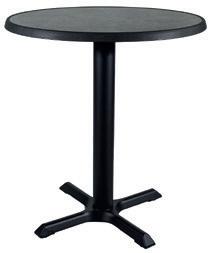
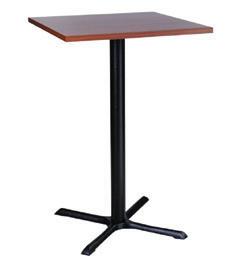





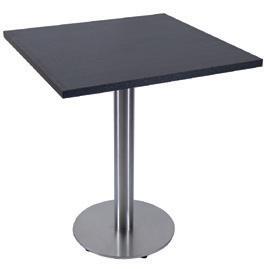



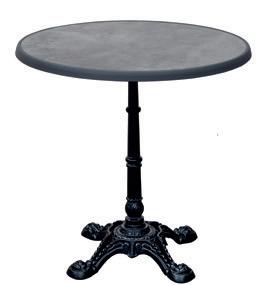




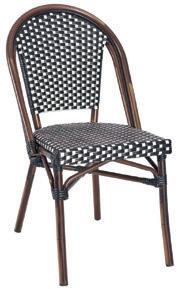




In the world of hospitality, design isn’t just about aesthetics, it’s about shaping experiences. Cult Trade, the dedicated trade division of Cult Furniture, is helping bars, restaurants, and hotels across the UK do exactly that by creating striking, design-led interiors that leave a lasting impression.
With a passion for accessible, contemporary design, Cult Trade delivers a curated collection of furniture, lighting, and accessories that balance style with durability, perfect for high-traffic hospitality environments. From sculptural bar stools and marble-topped tables to plush lounge seating and statement lighting, every piece is selected to transform a venue into a space guests want to return to. Modern consumers expect more than quality drinks and good service; they crave spaces that feel aspirational and memorable. Cult Trade helps brands meet that demand by designing spaces that elevate the guest experience, encouraging longer stays, social shares, and repeat
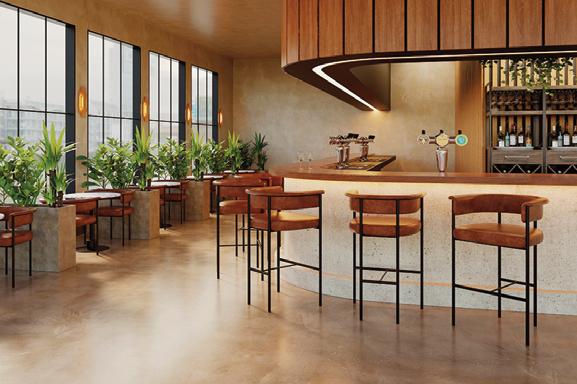
visits.
But Cult Trade is more than just product. Their service-led approach includes flexible trade pricing, low minimum orders, and access to thousands of in-stock products with next-day delivery. With a dedicated team supporting everything from specification to delivery, they streamline the process so clients can focus on creativity and customer experience.
From boutique hotel lobbies to stylish city cocktail bars, Cult Trade’s impact is being seen, and felt, across the hospitality industry. Their growing influence proves that great interiors don’t just fill a room; they define the energy of a space.
Looking to refresh your venue? Discover how Cult Trade can help you design spaces that leave a lasting impression.
Visit cultfurniture.com/trade
Rearo, a leading UK manufacturer and supplier of laminate surfaces, offers a wide range of high-quality cubicles for most washroom environments. Their products prioritise privacy, durability, and style, catering especially to hospitality and leisure.
Rearo is committed to sustainability, sourcing timber from FSCcertified forests and operating closed loop waste management. Their commercial team provides expert support, including site measurements, specifications, and design assistance.
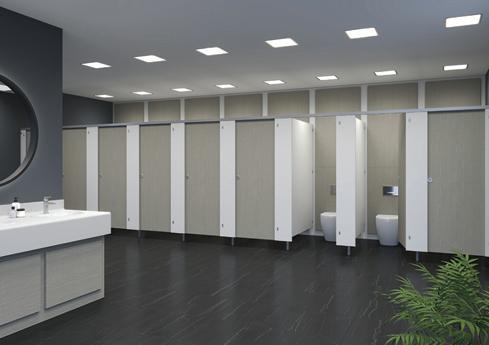
Rearo's cubicles, new for 2025, range from the luxurious timelessness of Triumph, through Elevate’s modern cubicles with both height and privacy, to Enhance, which offers a wide range of décors to suit individual preferences, and Aspire’s made-to-measure cubicles for quick delivery - ideal for budget-conscious projects. Finally, RapidFit offers off-the-shelf cubicles and IPS for fast and efficient installations.
Rearo's RapidFit is the perfect solution for fast, easy, and stylish washroom transformations. Designed to meet tight deadlines, our off-the-shelf RapidFit range offers a variety of toilet cubicles and vanity units.
Why Choose RapidFit?
• Speed: Quick and easy installation with flat-pack cubicles.
• Style: A range of high-quality laminate finishes to suit any aesthetic.
Accessibility: Colours and textures chosen to comply with The Equality Act.
• Durability: Options for both light and heavy-duty use. Contact your local fitter, joiner, or plumber to request free sample packs and design assistance. Or order your RapidFit washroom directly today.
commercial@rearo.co.uk www.rearocommercial.co.uk
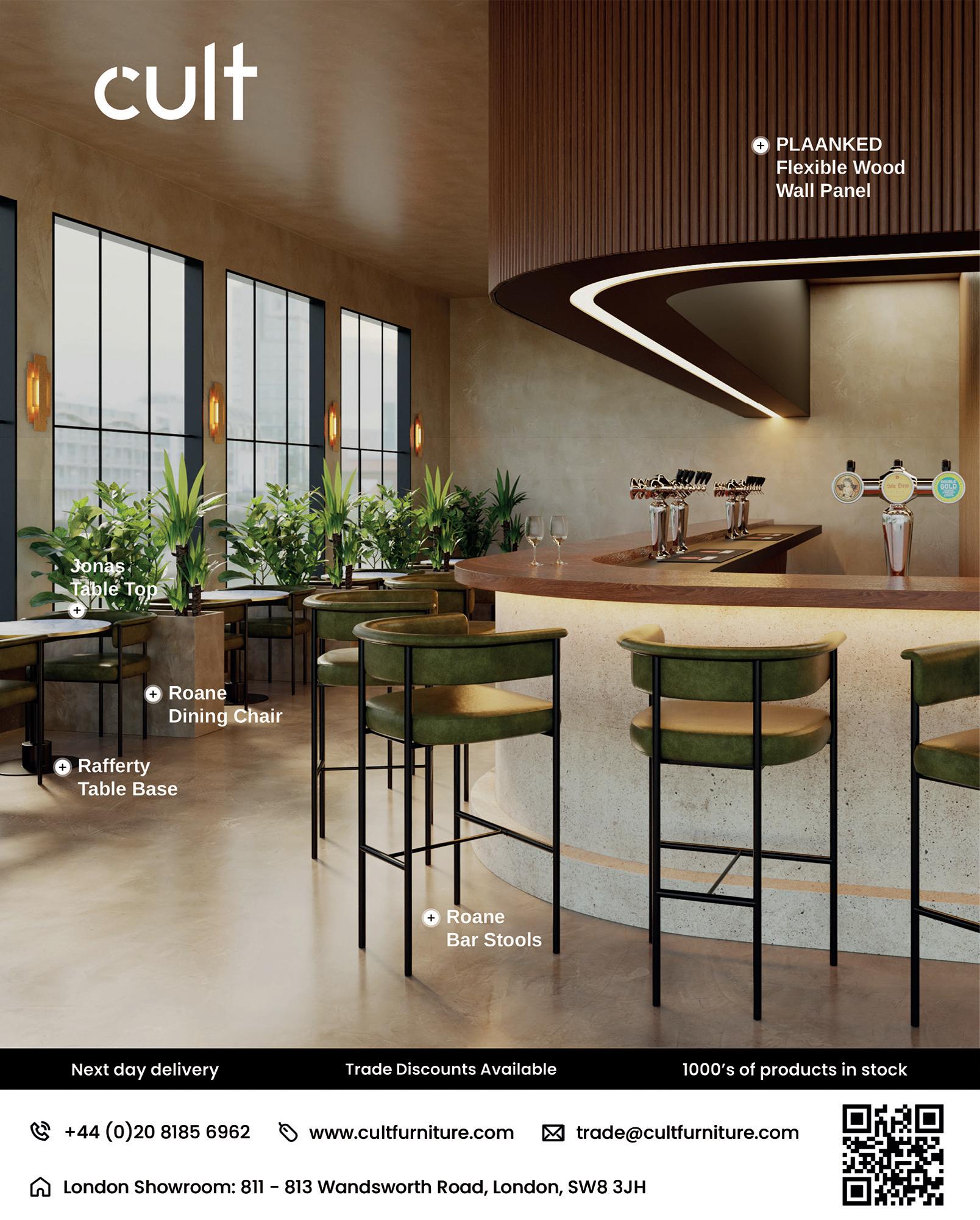


Whether you’re furnishing a restaurant or clubhouse or adding some flair to a bar or pub, upholstered chairs make your space look and feel inviting and comfortable.
Here at Trent Furniture, we offer a great range of upholstered chairs designed to withstand the heavy demands of the hospitality environment, available in wipe-clean faux leather or tough, easy-to-maintain fabric.
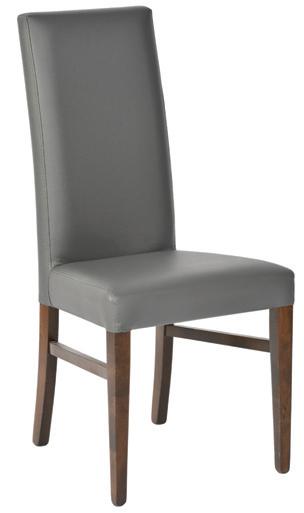
A firm customer favourite thanks to its contemporary classic design, the Sorrento Chair is currently available with 10% off across the extensive range. Choose from five faux leather options or plain or checked fabric for the perfect match for your venue.
Alternatively, the Andorra Chair offers eye-catching classic style in brown faux leather or a
choice of two chic checks. Pair it with the matching Tall Andorra Stool at the bar or with your poseur tables to add a touch of luxury to your surroundings.
Regal yet compact, the Regent Chair’s smaller size and low back make it perfect for cosy corners without comprising on comfort. Choose from the warm Autumn check pattern or rich brown faux leather to add some welcoming warmth to your space.
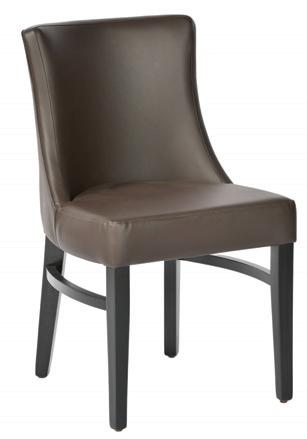
Whichever upholstered chair you choose, you can be assured of strong wooden frames, contract grade foam and fire-retardant fabric. To find out more about these and the other great upholstered chairs in our vast range, please call us on 01162 864911 or email sales@trentfurniture.co.uk
Dining Chairs UK, are proud to be a trusted supplier to the hospitality industry and licensed on-trade, providing cost-effective furniture solutions for commercial venues across the country. Whether you operate a bustling restaurant, a stylish hotel lounge, or a traditional pub, the right furniture plays a crucial role in defining your space. We specialise in providing a comprehensive range of hospitality furniture, including chairs, bar stools, table tops, table bases, and outdoor furnishings—ensuring you have access to premiumquality products at competitive prices. We understand that every venue is unique. That’s why we offer tailored solutions to match your brand’s identity and aesthetic vision. Our expert team works closely with business owners, designers, and hospitality professionals to source and specify furniture that seamlessly blends style, durability, and functionality.
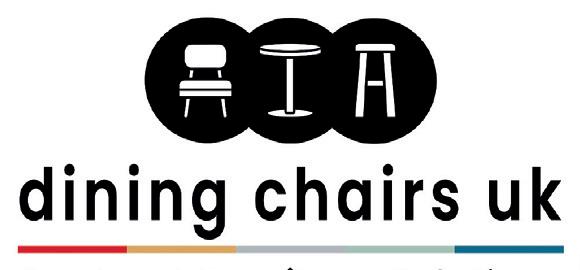
At Dining Chairs UK, we believe in making commercial furniture buying as simple and stress-free as possible. Our vast selection of in-stock items means you can furnish your establishment quickly, without long lead times. Plus, with our competitive pricing and quick delivery options, achieving the perfect look for your business has never been easier.
We’re so confident in our pricing that if you find the same product at a lower price elsewhere, we won’t just match it—we’ll strive to beat any like-for-like quote. This commitment to affordability ensures that your business gets the best value without compromising on quality.
For more information, visit www.diningchairsuk.com or call us to discuss how we can support your next project.

BPI is celebrating a double business milestone with Whitbread PLC;
beneficial eight-year partnership and a six- figure
with this leading hospitality business.
It comes at a time when BPI has secured a record amount of asset auctions in the hospitality sector as more businesses see it as a way of meeting their circular economy principles. For the past eight years, BPI has worked in close partnership with Whitbread PLC, the parent company to Premier Inn, supporting the company’s commitment to sustainability by managing the resale and repurposing of its previously used catering equipment. As one of the UK’s leading hospitality companies, Whitbread, home to brands like Premier Inn, has taken a keen interest in environmentally responsible solutions when upgrading its assets.
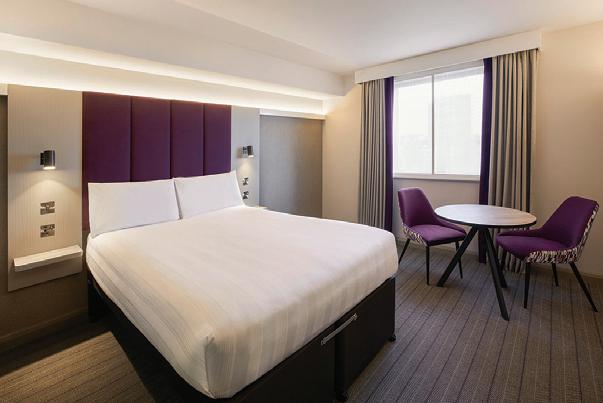
By partnering with BPI, Whitbread’s catering equipment has been given a second life, rather than contributing to landfill waste. Through its specialised auction services, BPI has facilitated the resale of Whitbread’s surplus assets, helping a new wave of business owners, including takeaway operators and independent restaurateurs acquire highquality equipment at an affordable price.
Supporting sustainability through smart asset disposal
This sustainable approach not only reduces environmental impact but also aligns with Whitbread’s sustainability strategy, Force for Good. Working with BPI, Whitbread has found an efficient and sustainable solution to asset disposal, minimising its waste, fuelling the circular economy and achieving maximum returns.

With over 30 years of industry experience in the Hospitality sector, The Bowden Group’s Managing Consultant David Hunter will work with you to address the following elements:
Profitability, Operational Strategy, Staff Management, Marketing and The Future of your business.
Our experts will analyse your entire operation and also its key operating figures if they are available. We then help you to identify strategies to manage costs and overheads associated with the core Profitability of running a Hospitality business.
The largest overhead, even higher than Cost of Sales, is the Labour cost, so, with detailed analysis of your wages and being able to understand ‘’the way
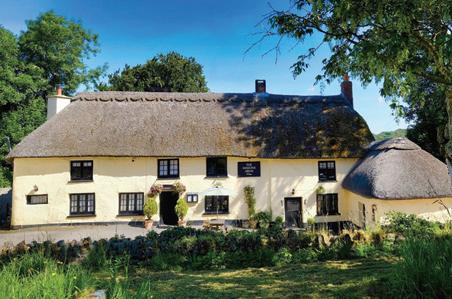
your business actually works’’ we can ensure that you are maximising the labour usage in your business.
Budgeting, Forecasting, Menu Management, Stock Controls, Purchasing, and controlling Variable Costs are just a few of the other areas that David Hunter, your Restaurant Consultant, will work on with you, and improve with you.
Managing people brings with it a whole set of new skills that are now needed more than ever. From ‘’Managing the Managers’’ through to Service and Kitchen staff, your team needs careful and skilful Management, Motivation, guidance and Development. If your business is actually struggling, or if you just feel that it could be doing some things better, give David Hunter a quick call on 07831 407984 to arrange a ‘’Free of Charge’’ initial consultation (please quote CLH Offer), when David will discuss with you what could be achieved if you ask us to work with you.
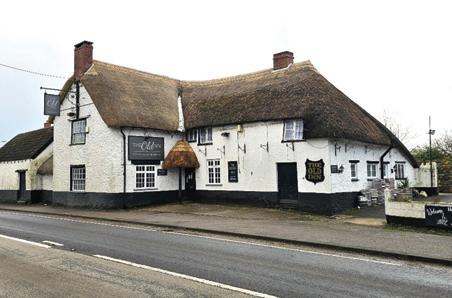
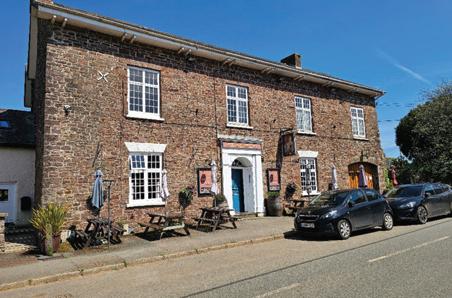
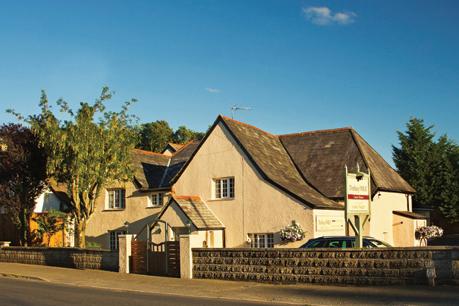
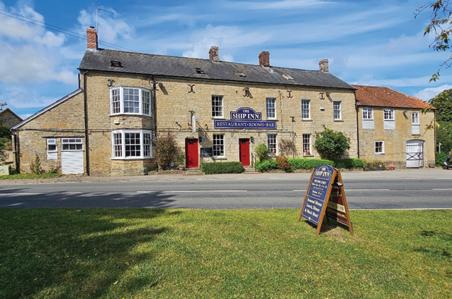

Dave Cummings, Business Development Manager at BPI highlights the success of this partnership: “Working with Whitbread PLC has been a fantastic example of how businesses can integrate sustainability into its asset management. By choosing to recycle and repurpose its assets, Whitbread has prevented unnecessary waste while also supporting new business owners. Our auctions provide a platform for quality equipment to continue its lifecycle, making a real impact on the circular economy.”
Nationwide service for a nationwide brand
BPI operates across the UK to manage Whitbread’s asset sales, ensuring seamless logistics and hassle-free handling of their equipment from collection to resale. Whether it’s upgrading their kitchen equipment or relocating site, Whitbread benefits from BPI’s ability to generate maximum return on investment while upholding their green commitments.
Through this long-standing partnership, BPI and Whitbread PLC continue to set an example in the hospitality sector—proving that business efficiency and sustainability can go hand in hand.
For more information on BPI, please visit: www.bpiauctions.com/assetdisposal/ or see the advert on page 15.
The pub industry is facing long-term decline. Over 400 pubs closed in England & Wales in 2024 - total numbers fell below 39,000 for the first time - the most since 2021 during the COVID pandemic. Rising National Insurance contributions, increased wages, and reduced business rate relief from April 2025 will further strain the sector.
The situation is similar for the hotel and restaurant industry. Recent research by the British Institute of Innkeeping shows that only 50% of UK hospitality businesses are making a profit.
How can Antony Batty & Company help?

As Licensed Insolvency Practitioners, our aim is to save businesses, with liquidation being a last resort. Key options include:
• Time to Pay Arrangements with HMRC – Structured payment plans that give businesses time to repay debts. We have extensive experience negotiating these.
Additional Finance – We have strong relationships with lenders who may provide
Company Voluntary Arrangement (CVA)
If creditors are demanding
ment, we can propose a structured repayment plan. This allows part of the debt to be written off, avoiding liquidation. A CVA is a recovery process that gives businesses time to turn things around.
Directors need to be aware of their responsibilities: continuing to trade when a business is loss making and to the detriment of creditors can result in personal liability. So, if your company is struggling, early professional advice is vital. Figures from R3, our industry body, show that Insolvency Practitioners rescue 40% of insolvent businesses who appoint them over a 12month period.
We will guide you through your options, ensuring you make the best possible decision.
Contact us today: www.antonybatty.com/contact/

